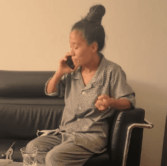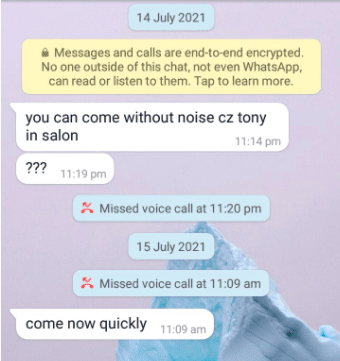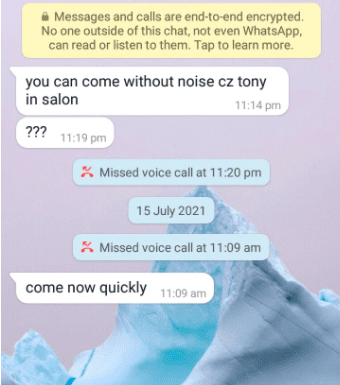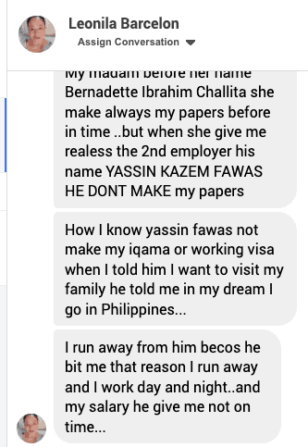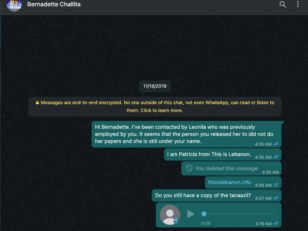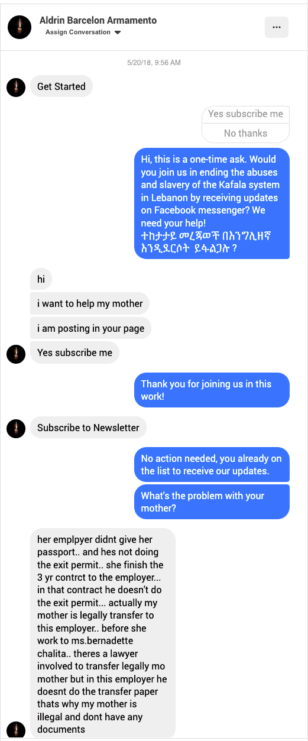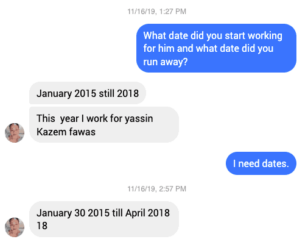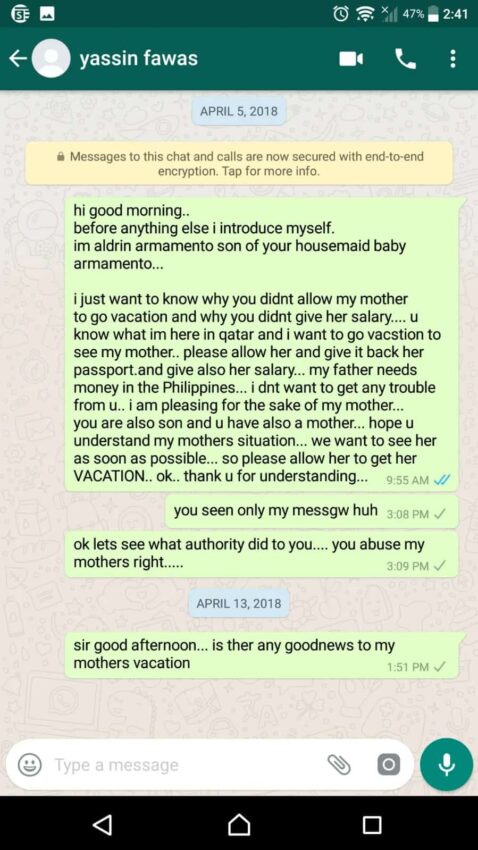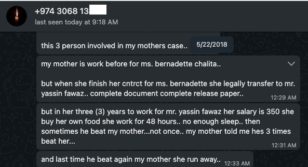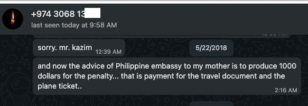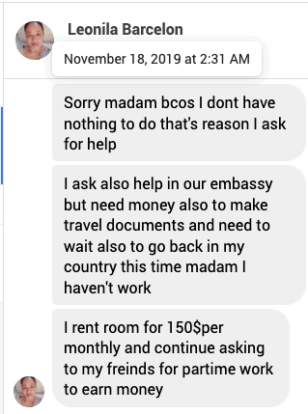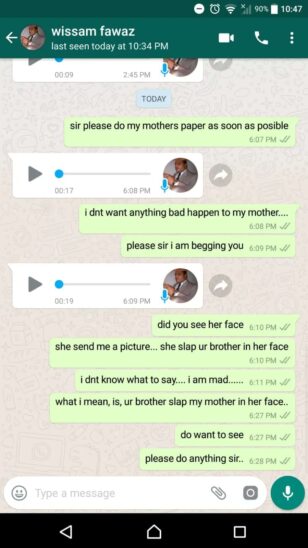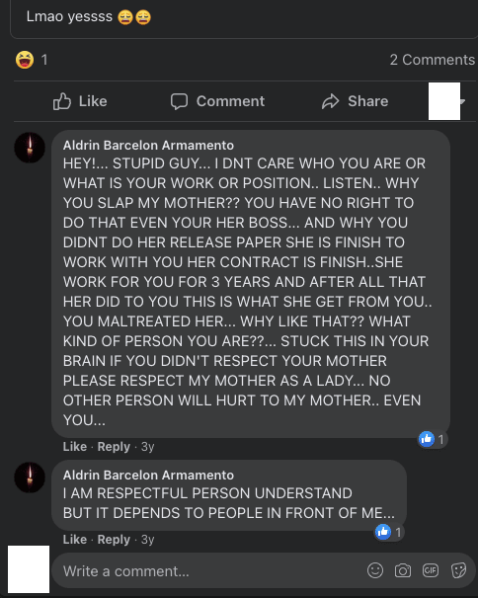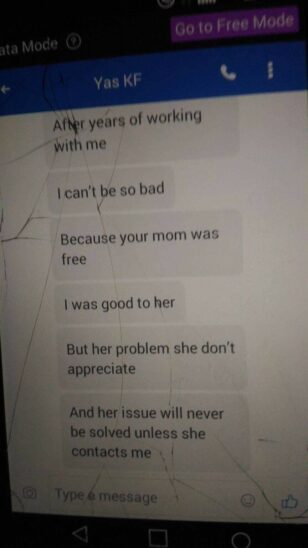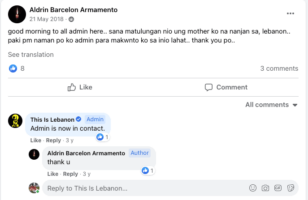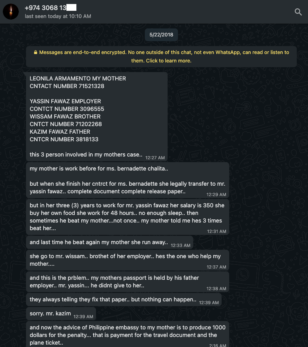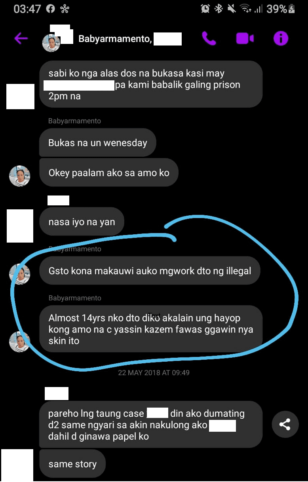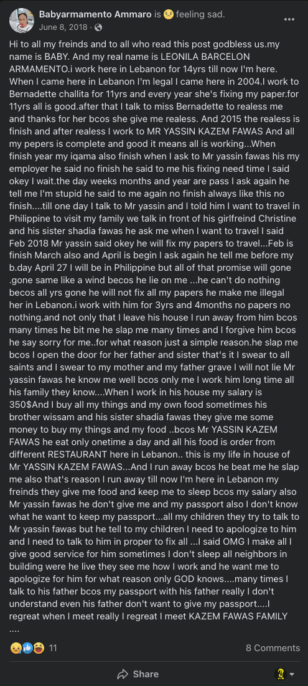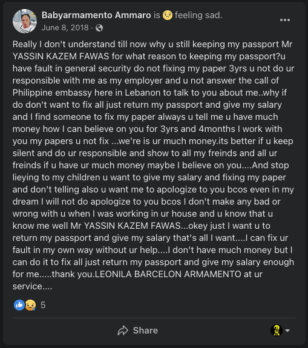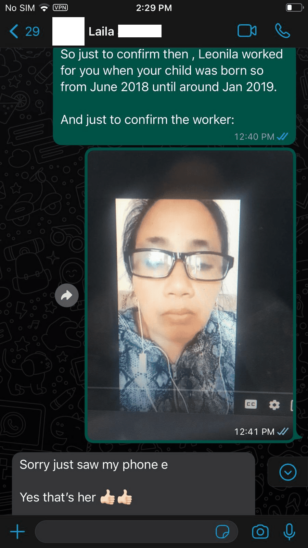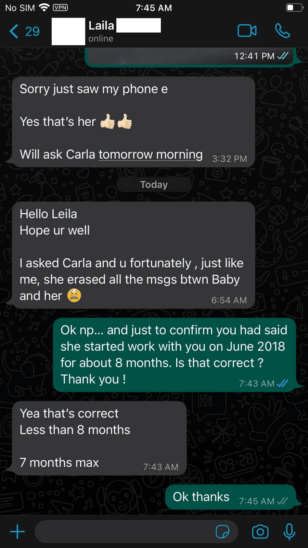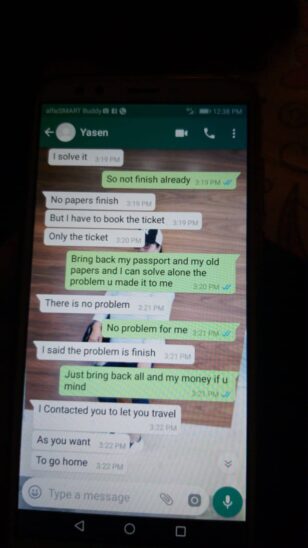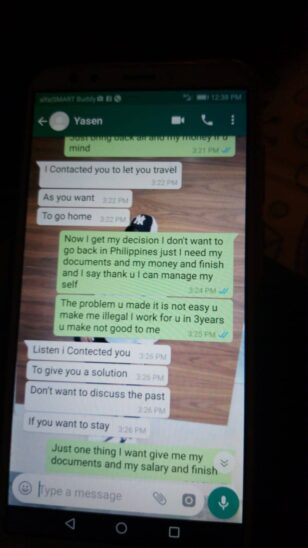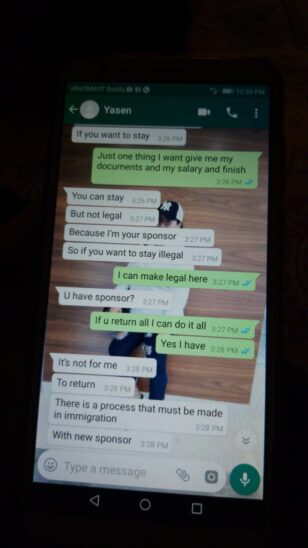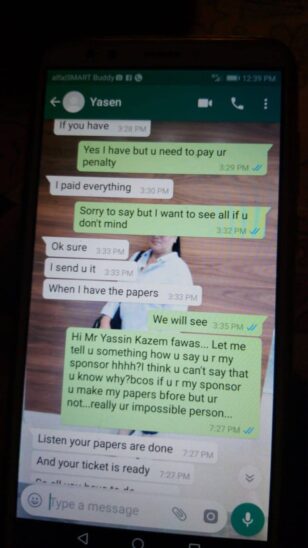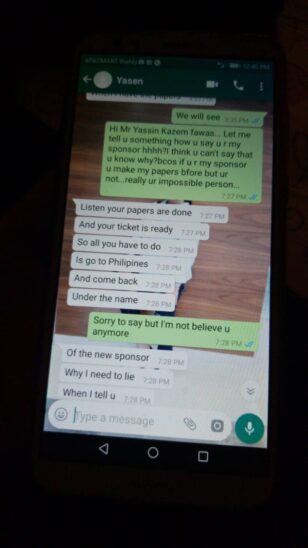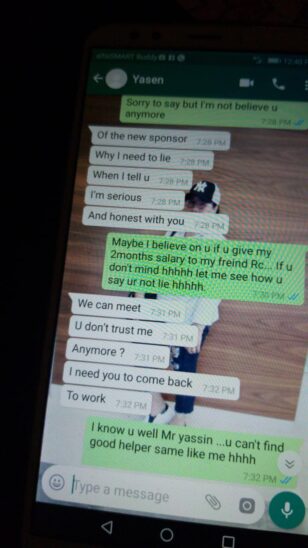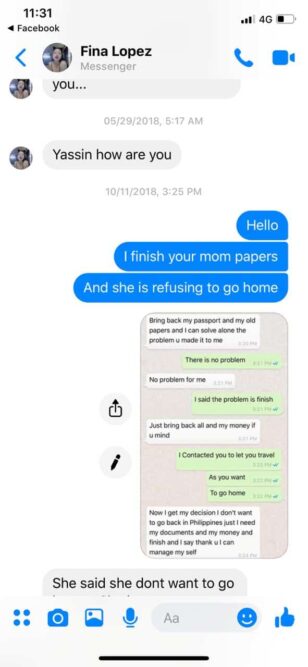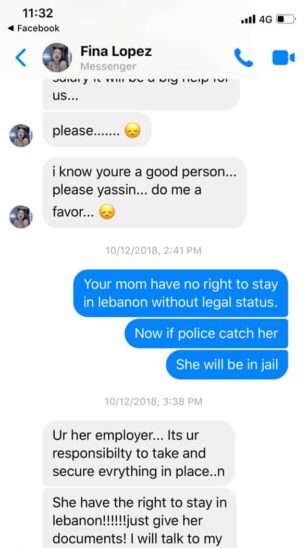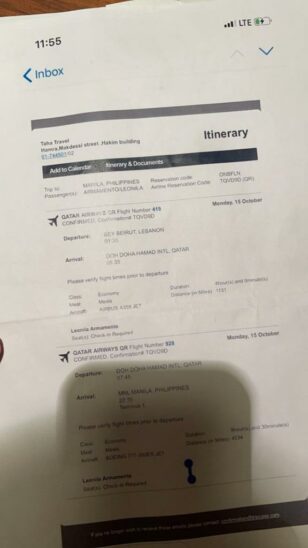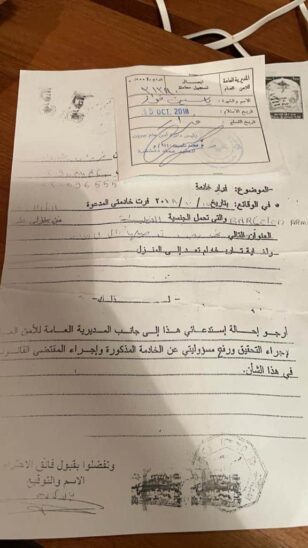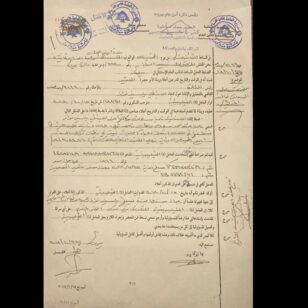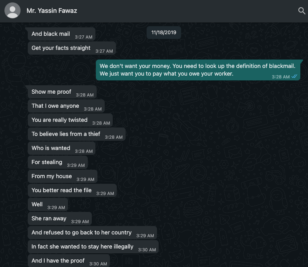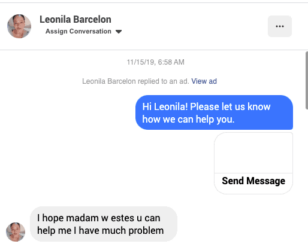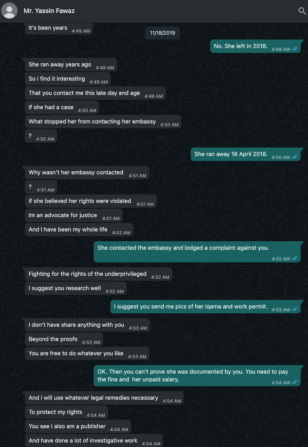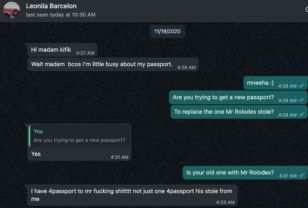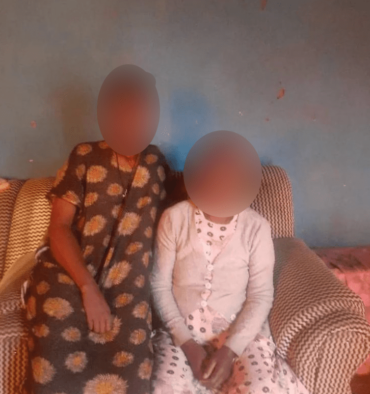THE VIDEO
Watch Joyce explain her experience with Kawthar Soulayman
THE STORY
In Lebanon, it is often the unpaid domestic worker who goes to prison and the employer who has committed salary theft that goes free. Such was the case of Joyce Larweh, a 29-year-old Ghanaian, and her abusive employers, Kawthar Soulayman and Ali Halawi. Ali lives in Gabon, Africa and his wife and children live in Toul, on the outskirts of Nabatieh.
Joyce arrived in Lebanon on 11 February 2019 to work for $200 per month as a housemaid for Kawthar and Ali. We first learned about Joyce from her brother who contacted our Facebook page seeking help in August 2020, claiming his sister had escaped her employers’ house and been falsely accused of stealing money. Someone had called him having seen Joyce in a prison cell.
It was not until February 2020, that we got to hear from Joyce herself. After languishing for five months 10 days in a police cell and prison, she eventually made it home in December, 2020. This is the account of her 20 months of misery in Lebanon.
According to Joyce, Ali and Kawther were:
“very wicked, especially the madam. She made me work in two houses and kept me hungry.”
Joyce said she was subjected to daily insults and humiliations, being called an animal, which is very derogatory in Arabic. When she asked for new slippers when hers were torn, the madam said she’d have to buy them herself. She was not given a jacket or socks even though Nabatieh is very cold in winter. All this Joyce tolerated, but she described no longer being able to tolerate the situation when being slapped was added to the list of abuses. On that day, Joyce refused to work for her any longer and insisted on being taken to the agent’s office. At the office, Joyce was given no opportunity to speak. Before she could say anything, the agent began to hit her. He accused her of being lazy. He gave her two options: either return with Kawthar to complete her contract or pay $1,500 to go home to Ghana. Having no money to pay the agent, Joyce asked to change employers. Her request was denied and she was sent back with Kawthar.
In desperation, Joyce contacted her sending agent in Ghana, who advised her to try and escape and go to the nearest police station. Joyce said:
“One day, I had the chance to run while I was throwing out the garbage.”
A stranger on the street directed her to a nearby police station. Howe ver, Joyce said that after arriving and telling the police her story, her madam came to the station and told the police that Joyce had stolen a huge amount of money and sent it to Ghana. Joyce informed the police that she had none of her documents – her passport, Ghana ID card and all documents had been taken by the madam – so it was not possible to send money. She also stated the obvious fact that if she had stolen money, she would not have gone to the police station! Kawthar and the police spoke for a while in Arabic and then Joyce said:
“I was thrown in the police cell just like that.”
She says she met many other African women there and cried day and night. When she asked to be able to contact the Ghanaian consulate, she was told that thieves don’t get to use the phone.
When Joyce went to the police station, she had Lebanese Lira with her – given to her by her employers’ friends, for washing their cars, and by neighbors for throwing out their garbage. Those same people also used to give Joyce food and told her to hide it so that Kawther wouldn’t see. “I saved that money but the police took it from me and gave it to my madam.”
Joyce spent 10 weeks in the Nabatieh police cell. She said on her last day there, the police told her, “Joyce Larweh, you have completed your case. You are going back home to see your family. Your madam will pay you your salary.” She was taken from the cell in handcuffs. She asked about her personal possessions which she’d left at Kawthar’s house and was told she would get them later. To her dismay, instead of being taken to the airport, she was taken to a “very big jail” which she later found out was Baabda Women’s Prison. She said she spent her days “praying and crying.” Again she was denied any phone call. She was called for an investigative interview and once again was assured that she would receive her unpaid salary and shouldn’t worry. She asked how long she would be in prison but was given no answer. Before Joyce left Lebanon, she received the clothes she’d brought from Ghana and her telephone but she never received the 7 months’ salary Kawthar and Ali owed her.
Joyce has some very good questions. “Why is it that they didn’t change the house for me?” “If I stole an amount of money, why would I run to the police station?” “Why did my madam take my passport?” “Why didn’t they check with Western Union to see if I had sent any money?”
How is the Lebanese community in Gabon treated – are they enslaved?
We made multiple attempts to resolve the situation with Kawthar Soulayman & Ali Halawi by requesting that they either send us the OMT receipts for Joyce’s salary that they paid when she worked for them, or sending the salary now. They chose to do neither.
The People
“I was thrown in the police cell just like that.” – Joyce
TAKE ACTION
We can’t do this alone. We need your help! Join us in this fight.
Contact the Sponsors
Talk to Kawthar and Ali and ask them to pay Joyce her rightfully owed salary.
Share the Story
Tell others about this. Join us in the fight to ensure that kawthar and Ali are brought to justice.
Join Our Work
We need your help to continue our efforts in fighting for Joyce Larweh and others like her.
Get the Updates
Get the updates straight into your inbox so you don’t miss any part of the story.
القصة
في لبنان، غالباً ما يكون السجن مصير العاملة المنزلية التي لم تقبض أجرتها، في حين يبقى صاحب العمل الذي سرق راتبها حراً طليقاً. كانت هذه هي حال جويس لارويه، من غانا وتبلغ من العمر 29 عاماً، مع أصحاب عملها الاستغلاليين كوثر سليمان وعلي حلاوي. يعيش علي في غابون بأفريقيا وتعيش زوجته وأطفاله في بلدة تول في ضواحي النبطية.
وصلت جويس إلى لبنان في 11 شباط 2019 للعمل مقابل 200 دولار في الشهر كعاملة منزل لدى كوثر وعلي. علمنا لأول مرة بأمر جويس من شقيقها الذي اتصل بصفحتنا على فيسبوك طالباً المساعدة في آب 2020، ويقول أن شقيقته هربت من منزل أصحاب العمل واتُهِمَت زوراً بسرقة نقود. فقد اتصل به أحدهم بعد أن رأى جويس في زنزانة السجن.
لم نسمع من جويس نفسها إلا في شباط 2020. بعد معاناتها خمسة أشهر و عشرة أيام في زنزانة الشرطة والسجن، عادت في النهاية إلى ديارها في كانون الأول 2020. وهذا ما ترويه لنا عن عشرين شهراً من البؤس الذي عاشته في لبنان.
حسب قول جويس، كان علي وكوثر:
“شريرين جداً، لا سيما السيدة. لقد أجبرتني على العمل في منزلين كما أنها جوّعتني”.
تعرضت جويس للإهانات والإذلال يومياً، إذ كانت توصف بأنها حيوانة، وهي كلمة تحقيرية للغاية في اللغة العربية. قالت بأنه حين طلبت خفّاً جديداً عندما اهترأ القديم، أجابتها السيدة بأنه عليها أن تشتريه من مالها الخاص. لم يعطوها سترة أو جوارب رغم أن النبطية باردة جداً في الشتاء. كل هذا تحملته جويس إلى اليوم الذي صفعتها فيه كوثر. حينئذ رفضت جويس أن تكمل العمل لديها، وأصرت على أن يأخذوها إلى مكتب الوكيل. وهناك في المكتب، لم تُمنح الفرصة لجويس لتتكلم. وقبل أن تتمكن من قول أي شيء، بدأ الوكيل بضربها. واتهمها بأنها كسولة. أعطاها خيارين: إما العودة مع كوثر والبقاء حتى نهاية عقدها أو أن تدفع 1500 دولار لتعود إلى عائلتها في غانا. وإذ لم يكن لديها المال لتدفع للوكيل، طلبت جويس تغيير صاحب العمل. رُفض طلبها وأُعيدت مع كوثر.
من شدة يأسها، اتصلت جويس بوكيلها في غانا الذي أرسلها، فنصحها بمحاولة الهرب والذهاب إلى أقرب مركز شرطة. قالت جويس:
“ذات يوم، سنحت لي الفرصة للهرب بينما كنت أرمي القمامة.”
فقام شخص غريب في الشارع بإرشادها إلى مركز شرطة قريب. حضرت سيدتها إلى المركز وأخبرت الشرطة أن جويس قد سرقت مبلغاً كبيراً من المال وأرسلته إلى غانا. أبلغت جويس الشرطة أنها لا تملك أية وثائق – لأن جواز سفرها، وبطاقة هويتها وجميع المستندات قد أخذتها السيدة – لذلك لم يكن من الممكن إرسال الأموال. وصرّحت بالحقيقة البديهية بأنها لو كانت قد سرقت المال، لما ذهبت إلى مركز الشرطة! تحدثت كوثر مع الشرطة بالعربية لبعض الوقت، ثم قالت جويس:
“أُلقِيت في زنزانة الشرطة هكذا بكل بساطة”
وتقول إنها التقت هناك بالعديد من النساء الأفريقيات غيرها، وراحت تبكي ليل نهار. حين طلبت الاتصال بقنصلية غانا، أجابوها بأن اللصوص لا يمكنهم استخدام الهاتف.
عندما ذهبت جويس إلى مركز الشرطة، كانت معها نقود بالليرة اللبنانية – أعطاها إياها أصدقاء لأصحاب العمل مقابل غسيل سياراتهم، ومن الجيران لرمي القمامة. كان هؤلاء الأشخاص أيضاً يقدمون الطعام لجويس ويطلبون منها إخفاءه حتى لا تراه كوثر. “لقد ادخرتُ هذا المال لكن الشرطة أخذته مني وأعطته لسيدتي”.
أمضت جويس عشرة أسابيع في زنزانة شرطة النبطية. قالت أنه في آخر يوم لها هناك، أخبرتها الشرطة: “لقد انتهت قضيتك يا جويس لارويه. وأنت عائدة إلى بلدك لرؤية عائلتك. وستدفع سيدتك لك راتبك”. وتم أخذها من الزنزانة مقيدة بالأغلال. سألت عن ممتلكاتها الشخصية التي تركتها في منزل كوثر فأجابوها بأنها ستحصل عليها فيما بعد. ومما أصابها بالهلع، أنه بدلاً من أخذها إلى المطار، نقلوها إلى “سجن كبير جداً” اكتشفت لاحقاً أنه سجن النساء في بعبدا. قالت بأنها أمضت أيامها “تصلي وتبكي”. ومرة أخرى رفضوا السماح لها بإجراء أية مكالمة هاتفية. تم استدعاؤها لإجراء مقابلة من أجل التحقيق، وطمأنوها مرة أخرى بأنها ستقبض راتبها غير المدفوع وأنه لا داعي للقلق. سألت عن المدة التي ستقضيها في السجن لكنها لم تحصل على أي إجابة. قبل أن تغادر جويس لبنان، استلمت الملابس التي أحضرتها من غانا وهاتفها، لكنها لم تقبض أبداً رواتب سبعة أشهر هي مستحقاتها المالية من كوثر.
لدى جويس أسئلة وجيهة. “لماذا لم يغيروا لي المنزل؟” “إن كنت قد سرقت مبلغاً من المال، فلماذا أهرع إلى مركز الشرطة؟” “لماذا أخذت سيدتي جواز سفري؟” “لماذا لم يراجعوا ويسترن يونيون لمعرفة ما إذا كنت قد أرسلت أية نقود؟
ونحن أيضاً لدينا بضعة أسئلة. هل تمت مصادرة جواز سفر علي حلاوي لدى وصوله غابون؟ هل قام أصحاب العمل بحبسه وحجز راتبه؟
كيف يتم التعامل مع الجالية اللبنانية في غابون – هل يتم استعبادهم؟
وهذه هي الرسائل التي أرسلناها إلى أصحاب العمل:
في 17/3/2020: “مرحباً كوثر. حسب قول جويس، أنت مدينة لها برواتب 7 أشهر غير مدفوعة، وتبلغ قيمتها 1400 دولار. إن كنت تنفين ذلك، يرجى إرسال صور الإيصالات إلينا. وشكراً”. رأت كوثر الرسائل لكنها لم ترد.
في 24/3/2020: “من المؤسف أنكم لم تجيبي. هذه فرصتك للتحدث إلينا عن إيجاد حلّ قبل نشر الفيديو على جميع منصات التواصل الاجتماعي الخاصة بنا. وإذا اضطررنا للنشر، فسنقوم بضمان وصوله إلى الناس في غابون.” ومرة أخرى، لم نحصل على أي رد.
في 29/3/2020: “مرحباً علي. أنا متأكدة من أن كوثر أخبرتك عن الشكوى المقدمة ضدك من قبل جويس لارويه. هذه هي الفرصة الأخيرة لك لتقرر أن تدفع لها الراتب المستحق لها. إذا لم أسمع شيئاً منك بحلول يوم الخميس، سنواصل خطواتنا ونقوم بالنشر وسندعم المنشور حتى يصل للناس الذين يعيشون في غابون.” لم يكن هناك أي رد.
THE VIDEO
Watch Rana Germanos and her father Sleiman face questioning by This Is Lebanon over their treatment of Sajita Lama.
THE STORY
Sajita Lama, a 29 year old Nepali, has been confined to the home of her Lebanese employers for over a decade now. Her employers, Richard Khoury, hairdresser and co-owner of a prominent Beirut hair salon, “George Shop” in the Dekwaneh district of the Lebanese capital and his wife Rana Germanos, (DOB 05/10/1981), have essentially enslaved Sajita, and owe her nearly a decade’s worth of wages since they stopped paying their worker in June of 2012.
The plight of Sajita, who has been kept in limbo, cut off from interacting with the outside world and forced to labour endlessly without pay, is on par with that of Filipina domestic worker Halima Ubpah, who spent a decade imprisoned without pay in the home of Lebanese politician and women’s right activist Ibtissam Alsaadi. In 2017, This Is Lebanon intervened on her behalf and managed to negotiate her freedom.
Sajita’s family have told This Is Lebanon that her ongoing nightmare didn’t commence immediately. Things were initially okay in the Khoury-Germanos home. As is the case with the majority of migrant domestic workers, Sajita traveled to Lebanon to support her poverty stricken family back home in Nepal. She arrived as a teenager in September 2010 and was hired to work in the home of Richard, Rana and their two daughters.
According to her uncle, Sajita was paid for the first year and nine months of her stay in the home. As the kafala system forbids migrant domestic workers from opening or owning Lebanese bank accounts, workers typically have their employers send their salaries straight to their families in their home countries. The remittances to Sajita’s mother were halted in June 2012.
George Shop, the family hair styling business run by Sajita’s employers was founded by Richard’s deceased father and is currently located on the first floor of the Sukkarie Center in Dekwaneh. The company’s Instagram and Facebook pages depict a slew of prominent Lebanese personalities in show business and other industries as clients, with Richard or one of his brothers seen posing with seemingly satisfied customers in photographs uploaded to the company pages. Among their clients, Lebanese singer song writer Ayman Zbib as well as movie star Mazem Moadam. George Shop has featured at the globally renowned Arab Idol competition, beauty pageants and other show business events.
Despite a background check revealing that Richard faces lawsuits over unpaid debts related to his business dealings, he has succeeded in keeping this aspect of his finances, largely under the wraps.
Richard’s public persona contrasts greatly with his private life, as he has continued to keep in bondage, a Nepali woman who had hoped to earn a living and help her family back home. Richard and Rana, who live in El Maten, Kournet El Hamra, have had no qualms about wasting away years of Sajita’s youth, a closely guarded dark secret that very few outside their immediate family are believed to be aware of.
Since 2017, This Is Lebanon has been brought in on behalf of thousands of migrant domestic workers who have been robbed of wages, enslaved and rendered prisoners of their employers. Sajita’s case, which we’ve only recently become aware of, stands as the second worst case for enslavement, as the staggering nine and a half years without pay is second only to that of Halima Ubpah.
Sajita’s family were unsuccessful in getting the Nepalese embassy in Beirut to take up her case. According to Sajita, the involvement of the embassy angered her employers, who threatened and eventually coerced her into telling the embassy that all was well and that she would be willing to continue working in the Khoury-Germanos home.
Sajita has confirmed to This Is Lebanon that she has only received wages for fifteen months of work. With her word and that of the family, we took up the case.
This month, after we began investigating her plight, we first reached out to the Khoury-Germanos family to better understand the dynamics behind the decade-long hostage ordeal.
On 4 August, This Is Lebanon first reached out to the family and phoned Richard Khoury. He claimed we had the wrong number and hung up on one of our case workers. It was the correct number.
On 11 August, a Lebanese caseworker of ours who specializes in negotiations, called and spoke with Richard’s wife, Rana Germanos. In their conversation, Rana made numerous conflicting and dubious statements. Among them, initially stating that she was unaware of Sajita’s whereabouts due to her worker running away from the home. This was shortly followed up by her stating that Sajita was currently working at the home of her father.
When probed about the payments, or lack of any, Rana says that the confusion is due to their electing to pay Sajita her salary in cash. When asked to provide receipts or any proof of any exchanges of money between the family and Sajita, Rana said there were none. If Sajita were paid in cash, this would mean that her wages were likely stashed somewhere in the home, due to her inability to deposit funds in a bank account. But when asked about where Sajita kept her savings, Rana responded with “I don’t know.”
Also worrying, Rana inadvertently revealed that Sajita’s passport and residency permit had long expired, and that she and her husband had been keeping her undocumented and effectively off the grid for years. Rana claimed that the family honoured its commitments to Sajita over the years, to a $100 monthly salary. The $100 figure is incredibly low, even lower than the paltry $150 monthly sumthat the lowest paid domestic workers tended to receive (prior to Lebanon’s economic crash of 2019). When our negotiator openly expressed surprise at the pitiful figure Rana claimed was Sajita’s salary, Rana claimed that Sajita had agreed to the amount. In the end, Rana ended her exchanges with our negotiators using grotesque curse words and threats of violence.
On 16 August, our negotiator switched her focus to Rana’s father, Sleiman Germanos, because of her claim that Sajita was staying with him. Sajita, he said, had been working in his home for the past month. He told our negotiator that he was paying Sajita “very generously,” although he wouldn’t specify what that meant in numerical terms.
Sleiman’s story ended up being as full of holes as the one his daughter attempted to sell us. When asked about the fact that Sajita had gone unpaid in the home of his daughter for nearly a decade, he first feigned ignorance, claiming to have no idea about her salary dealings. Then, in what appeared to be an attempt to exonerate his daughter, he stated that Sajita had in fact been receiving her salary over the past decade, but that she stopped sending money to her family in Nepal after her parents passed away in 2012.
Sleiman Germanos appeared to be unaware of our willingness to dig deep in such cases and get to the bottom of the story. This Is Lebanon has communicated extensively with the family and is aware that Sajita’s mother is very much alive.
Like his daughter Rana, he too had no explanation for where Sajita’s salary, which they claim is handed to her in cash, is placed for safekeeping. When pressed, Sleiman resorted to stating that the family had arranged for Sajita to sign a document saying that she had received the entirety of the money and claimed that this was a legally viable document which cleared the Khoury-Germanos family of any wrongdoing.
In four years of operations, This Is Lebanon has encountered scores of cases of women who are coerced into making statements or signing documents claiming that abusive employers were innocent of any wrongdoing. One such case is that of Lebanese army Colonel Abbas Akil, who to avoid paying his Nigerian domestic worker the six months of salary she was owed, forced her to sign a paper declaring that he owed her nothing. His worker later told This Is Lebanon that she had been threatened with death if she had refused to sign.
As such, This Is Lebanon has great reason to be worried if the family has resorted to coercing their worker into signing documents, with no legal counsel and certainly without the option of refusing. In addition to this, Sleiman Germanos was asked about elements of Sajita’s routine, including the fact that she spends weekends in the home and is never permitted to leave the premises.
Sleiman replied claiming that Sajita doesn’t have any friends, never goes shopping on her own and spends her days in the home because she herself has never wanted to leave her place of work. The laughable explanation almost confirms suspicions that she, like many domestic workers before her, has been turned into a captive.
When we initially posted about Sajita’s case on our Facebook page, some of our Lebanese followers were in disbelief. Among the reactions and questions we received, how could a migrant domestic worker be kept against her will for so long? Why hadn’t she run away?
Remember, Sajita came to Lebanon as an eighteen year old and had her passport immediately confiscated by the Khoury-Germanos family. While thousands of women have escaped from abusive homes across Lebanon, the kafala system, which doesn’t offer any protections to these women, renders their lives miserable. Running away automatically voids legal residency. Employers often file false complaints with police, claiming that their worker stole from them. Lebanese General Security has packed Lebanese prisons with migrant domestic worker victims of abuse. They may then stay in prison for a period of months, sometimes years.
Sajita has no family or friends in Lebanon, her lack of contacts and acquaintances due primarily to her confinement in the Khoury-Germanos home. She has no legally viable documentation. Her passport has been taken away from her. The outside world in Lebanon remains completely foreign to her, despite her having resided in the country uninterrupted, since 2010.
Hers isn’t the first of such cases, as we mentioned above, Halima Ubpah similarly spent a decade long nightmare of forced labour and confinement. A recent Al Jazeera in depth story highlighted our involvement in the cases of three Ethiopian migrant domestic workers, each of whom had spent nearly a decade locked in the homes of their Lebanese employers. The practice is extremely common and many women continue to languish for years on end, enduring horrendous abuse in the homes of employers.
Today, Richard Khoury, Rana Germanos and Sleiman Germanos owe Sajita Lama a combined 110 months’ worth of salary. Even at the average $200 monthly salary that many other Nepalese workers would typically receive in Lebanon (prior to the economics crash of 2019), this would put the total sum in unpaid salary owed to Sajita at $22,000. There are of course, damages that should be awarded to her as well.
The version of events shared with us by the Khoury-Germanos family doesn’t hold up. While Rana Germanos and her father Sleiman were dishonest and repeatedly lied in their exchanges with our negotiators,. Richard Khoury meanwhile, went to great lengths to avoid being contacted on the matter.
This Is Lebanon demands the immediate release of Sajita Lama, the delivery of all unpaid salary in an independently verifiable manner, and her repatriation to Nepal for her to be reunited with her long-suffering family. This nightmare must come to an end. Nothing justifies her continued stay in the home of a family which has robbed her of some of the best years of her youth and effectively enslaved her.
We also call on our followers to lobby for an end to the unjustified confinement of Sajita Lama. Contact information for George Shop hair salon and the family is available below. Let Richard Khoury and Rana Germanos know that unlawful restraint and forced labour are crimes and that their decade long toying with an innocent woman’s life must end now.
UPDATE ON FEB 25, 2022
On the 15 February, Sajita Lama arrived back in Nepal – with one small carry on bag and without any salary. This Is Lebanon paid for her air ticket as the employers refused and her mental health was deteriorating after spending 5 months in the shelter.
UPDATE ON FEB 2, 2024
TAKE ACTION
We can’t do this alone. We need your help! Join us in this fight.
Contact the Sponsors
Talk to the Germanos family and Richard Khoury and ask them to pay Sajita Lama her rightfully earned money.
Share the Story
Tell others about this. Join us in the fight to ensure that the Germanos family and Richard khoury are brought to justice.
Join Our Work
We need your help to continue our efforts in fighting for Sajita Lama and others suffering like her.
Get the Updates
Get the updates straight into your inbox so you don’t miss any part of the story.
القصة
وصلت ساجيتا لاما، من نيبال وتبلغ من العمر 29 عاماً، إلى لبنان في نهاية عام 2010. عملت خلال السنوات الإحدى عشرة الماضية لدى ريتشارد خوري ورنا جرمانوس، 39 عاماً، اللذين يعيشان في المتن، كورنت الحمراء. يعمل ريتشارد مصفف شعر ويدير “صالون جورج” لتصفيف الشعر، القديم والعريق والذي كان مُلكاً لوالد ريتشارد المتوفى، في الطابق الأول من مركز السكري في الدكوانة. ريتشارد غارق في ديون كثيرة وهناك دعاوى قضائية ضده.
علم “هذا لبنان” بأمر ساجيتا لأول مرة عندما اتصل بنا عمها وأخبرنا أن ابنة أخيه لم تتقاضَ أجوراً منذ ما يقارب 10 سنوات. كانت قد أرسلت راتبها إلى بلدها خلال السنة الأولى وتسعة أشهر. بعد ذلك توقفت جميع التحويلات. كانت الأسرة قد قدمت طلباً رسمياً للمساعدة عبر قنوات دبلوماسية ولكن دون جدوى.
في 4 آب، اتصل “هذا لبنان” بريتشارد خوري الذي ادعى أننا اتصلنا بالرقم الخطأ وأغلق الخط. لكن الرقم كان صحيحاً.
في 11 آب، اتصلت مفاوضة لبنانية برنا جرمانوس وتحدثت معها. وكانت أقوال رنا متضاربة. لقد ادعت أن ساجيتا هربت لكنها قالت فيما بعد بأنها تعمل في منزل والدها. ادعت أن ساجيتا كانت تتقاضى أجرها نقداً لكنها قالت بأنه ليس هناك إيصالات ولا تعلم أين احتفظت ساجيتا بأموالها. انتهت صلاحية جواز سفرها وتصريح إقامتها. قالت أن راتب ساجيتا كان 100 دولار شهرياً. وعندما قالت المفاوضة إنها لم تسمع قط بمثل هذا الراتب المتدنّي، ادعت رنا أن ساجيتا كانت موافقة بالكلية على المبلغ.
في 16 آب، اتصلت المفاوضة بسليمان جرمانوس، والد رنا. لقد كانت ساجيتا تعمل لدى سليمان طوال الشهر السابق. قال سليمان إنه يدفع لساجيتا بسخاء كبير لكنه ادعى أنه لا يعرف شيئاً عن راتبها خلال السنوات العشر الماضية. وادعى أنها قررت عدم إرسال تحويلات مالية إلى نيبال بعد وفاة والديها. في الواقع، والدة ساجيتا على قيد الحياة. وقال بأنها لا تريد مغادرة المنزل أبداً، وحين كانت تعمل لدى ابنته، كانت تقضي أيام الأحاد في منزله. ليس لديها أصدقاء ولا تخرج للتسوق بمفردها. وعلى الرغم من ذلك، لم يكن لديه أي تفسير عن مكان وجود راتبها المفترض أن يكون قد دُفع لها بالكامل. لكن عند الضغط عليه، قال بأنها وقّعت على ورقة تفيد بأنها تقاضت كل رواتبها. ومن الأساليب الشائعة لأصحاب العمل الضغط على عاملات المنازل للتنازل عن حقوقهن.
عندما نشرنا الأمر على فيسبوك، أعرب بعض اللبنانيين عن عدم تصديقهم لقصتها وسألوا لماذا لم تهرب ببساطة. ذهبت ساجيتا إلى لبنان وهي في الثامنة عشرة من عمرها. إنها لا تعرف أحداً في لبنان باستثناء أصحاب عملها / المعتدين عليها. وقد صادروا جواز سفرها. لو كانت قد هربت (كما ادعت رنا زوراً)، لكان بإمكانهم تقديم شكوى ضدها لدى الأمن العام وربما انتهى بها الأمر في السجن، مثل العديد من الأخريات اللواتي يقضين عقوبات بسبب تهم كاذبة. كما أن هناك سؤالاً يُطرح: كيف كان من المفترض أن تحصل على راتبها غير المدفوع لو كانت قد هربت؟ من هي السلطة اللبنانية التي ستساعدها في الحصول على حقوقها؟ هل سيسارعون إلى مساعدتها ولو في الوقت الحاضر؟
ساجيتا مستحقة لرواتب 110 أشهر. حتى على أساس مبلغ شهري تقليدي قدره 200 دولار، فإن هذا يعادل 22000 دولار. يجب أن تجبر السلطات اللبنانية ريتشارد خوري ورنا جرمانوس على بيع أية عقارات يمتلكانها لدفع أجور المرأة التي كانا يستعبدانها مدة عقد من الزمن. كما ينبغي سجنهما لارتكابهما هذه الجريمة.
በአማርኛ ለማንበብ
ሳጂታ ላማ የተባለች የ29 ዓመቷ የኔፓል ሃገር ተወላጅ ወደ ሊባኖስ ስራ ፍለጋ የመጣችው በፈረንጆቹ አቆጣጠር ወደ 2010 መጨረሻ ነው። ከመጣችበት ግዜ ጀምሮ በሊባኖስ በሰው ቤት ሰራተኝነት ሪሻርድ ኹሪ እና በባለቤቱው ራና ጀርማኖስ ተቀጥራ በ ኤል ማተን ኩርነት ኤል ሃምራ አከባቢ የሚገኘው ቤታቸው ያለፉት 11 ዓመታትን አሳልፋለች። ሪሻርድ በሙያው ጸጉር ሰሪ ሲሆን “የጆርግ ሾፕ” ተብሎ የሚጠራና በአባቱ የተቋቋመ የጸጉር ቤት ባለቤት ሆኖ እየሰራ ይተዳደርበታል። ጸጉር ቤቱ በዴክዋኔ የሚገኘው የሱካሬ ህንጻ አንደኛው ፎቅ ላይ የሚገኝ ነው። ሪሻርድ ከዚህ ቀደም በነበሩበት የነጋዴ ቆይታው እዳዎቹ ተጠራቅመው ዛሬ በርካታ ሰዎች በስሙ ክስ መስርተውበት በህግ ተፈላጊ ሆኗል።
የኛ ተቋም ይህ ነው ሊባኖስ ስለ ሳጂታ ለመጀመርያው ግዜ መረጃ የደረሰን በቅርቡ ነው። በኔፓል ሃገር ነዋሪ የሆኑት የሳጂታ አጎት በፌስቡክ ገጻችን መልዕክት ልከውልን ነበር። እንዳስረዱን ከሆነ ሳጂታ ላለፉት 10 አመታት እየሰራች ብትቆይም የአንድ ዓመት ከ9 ወራት ደሞዝ ብቻ መቀበሏን እና ወደ 10 ዓመት ለሚጠጋው ቀሪው ግዜ አንድም ሳንቲም ሳይከፈላት እንደቆየች ጨምረው አብራሩልን የሳጂታ አጎት።
የሳጂታ ቤተሰብ በመጀመርያ ጉዳዩ በቤሩት ወደሚገኘው የኔፓል ኤምባሲ ወሰዱት። ኤምባሲው የረባ እርምጃ ሳይወስድ ወራት ሲያልፍ በኔፓል ዲፕሎማቶች በኩል ምንም ነገር እንደማስተካከል ተረዱ። ከዚህ ቀጥሎ ነው የሳጂታን ጉዳይ ወደ ይህ ነው ሊባኖስ ለመስደው የተስማሙት። ስለሆነም በዚህ ወር ውስጥ የኛ ተቋም የሳጂታ አሰሪዎችን አግኝተን ለማነጋገር ሙከራ ማድረጅ ጀመርን።
ሐምሌ 4 እለት ወደ አሰሪዋ ሪሻርድ ኹሪ ስልክ ደወልን። ስልኩን ሲያነሳ ቁጥር ተሳስታችዋል ብሎ መለሰልን። ቦኋላ ስናጣራ ቁጥሩ ትክክለኛው ሆኖ የተሳሳትንበት ምንም ነገር አልነበረም።
ነሃሴ 5 እለት ወደ ሪሻርድ ባለቤት ራና ጀርማኖስ ስልክ ሞከርን። ራና ያለውን ነገር ለማብራራት ስትሞክር የምታወራው ድብልቅልቅ ብሎ እየተምታታባት ውሸትና እውነት ታቀላቅል ነበር። መጀመሪያ ሳጂታ በቤታቸው አምልጣ የት እንዳለች አለማወቋን ነገረችን። ቦኋላ ይሄንን መናገሯን ረስታ ደግሞ ሳጂታ ባሁኑ ሰዓት በአባቷ ቤት እንደምትገኝና ራና አባቷን በማገዝ የሳጂታን ደሞዝ እንደምትከፍል ተናገረች። ደሞዟ ለተከፈለችበት ደረሰኞች አሳዩን ስንላት ደግሞ ሳጂታ ደሞዟን በባንክ ዝውውር ሳይሆን በእጇ እየተሰጣት ስለሚከፈላት ደረሰኝ አለመኖሩን አስረዳችኝ። ታድያ ወደ ወላጆችዋ በባንክ የማይዘዋወር ከሆነና በእጅ የሚሰጣት ከሆነ አንዱ ጋር ወይ ቤት ውስጥ ብታስቀምጠው ነው ስንል ሳጂታ ገንዘቧን የት እንደምታስቀምጠው አላውቅም ብላ ምላሽ ሰጠችን። ንግግሯ ከእውነት መራቁን መጠርጠር የጀመርነው ሳጂታ ፓስፖርቷን እና የመኖሪያ ፍቃድ ኢቃማዋ ሁለቱ መቃጠላቸውን ስናጣራ ነው። እንደ ራና አገላለጽ ሳጂታ በወር 100 ዶላር ደሞዝ ይከፈላታል። 100 ዶላሩ ከዚህ ቀደም ከሚጠበቀው የ150 ዶላር ወራዊ ደሞዝ ለምን ዝቅ አለ ብለን ራናን በምንጠይቃት ግዜ ሳጂታ የተስማማችበት ደሞዝ ነው ብላ መልሳልናለች።
ነሃሴ 10 እለት ተወካዮቻችን ወደ ራና አባት ሚስተር ስሊማን ጀርማኖስ ደውለው ሳጂታ እውነት በስሊማን ቤት በመስራት ላይ እንደምትገኝ ለማጣራት ሞከሩ። ሚስተር ስሊማን እንዳሉን ከሆነ ሳጂታ ላለፈው ወር በቤታቸው እየሰራች እንዳለችና ጥሩ ደሞዝ እየከፈላት እንዳለም ነገሩን። በልጃቸው ቤት 10 ዓመት ቆይታ ደሞዝ እንዳልተከፈላት ስንነግራቸው ሚስተር ስሊማን ስለዚህ ነገር ምንም ነገር እንደማያውቁ አስመስለው ተናገሩ። ጥሩ ደሞዝ እየተከፈላት ከሆነ በኔፓል ያሉ ቤተሰቦቿ ጋር ምንም ነገር ያልደረሰው ለምንድነው ብለን ስንጠይቃቸው ሳጂታ ወደ ሃገሯ ገንዘብ መላኩን የተወቸው ወላጆቿ ስላረፉ እና ቀሪዎቹ ቤተሰቦችዋ ጋር የመተማመን ችግር አለ በማለቷ ነው ብለው አስረዱ።
ይሄ ውሸት መሆኑን ያወቅነው የኛ ተወካዮች የሳጂታን እናት በተደጋጋሚ በስልክ ስናገኛቸው በመክረማችን ነው። የሳጂታ እናት በህይወት እንዳሉ ጠንቅቀን የምናውቀው ነው። ከዚህ ወጪ የሰውዬው ንግግርም አሳማኝ አልሆን ያለው ተጨማሪው ምክንያቱ ደግሞ ከቤት መውጣቱ የተከለከለችው ሳጂታ ለምን እንድትወጣ አትፈቅዱላትም ስንል ሳጂታ በራሷ ፍቃድ ነው ቀኑን ሙሉ ቤት ተቀምጣ የምትውለውና ድሮም እሁድ ቀናት የእረፍት ቀን ሆኖ ሲመደብላት በአሰሪዎቿ ቤት ማሳለፉን እንደምትመርጥም ነገሩን። በሊባኖስ ጓደኞች የሌላት ሳጂታ ወጥታ ለግሏ አልባሳትና ሌሎች ነገሮች እንኳን ለመውጣት ፍቃደኛ አይደለችም ብለውም ተናገሩ።
የ10 ዓመት ደሞዟ ጉዳይን በተመለከተ ልጃቸው ራና የነገረችን ለአባቷ አስረዳነው። በእጇ ደሞዝ ተቀብላ እንደሚከፈላት ማለቷን ነገርነው። በእጇ የሚፈከላት ከሆነ እና ስደተኛ በመሆኗ ገንዘቧን በባንክ ማስቀመጡ የማትችል ከሆነ የምትቀበለው ካሽ ገንዘብ የት ነው ምታስቀምጠው ብለን ስንጠይቃቸው ሚስተር ስሊማን የማውቀው ነገር የለም ብለው መለሱልን።
ያለውን ነገር በፍጹም አሳማኝ ሊሆን ስላልቻለ ለሚስተር ስሊማን በጉዳዩ ያለው አቋማችን ገለጽንላቸው። ለ10 ዓመት ደሞዝ እንዳልተቀበለችና በባርነት እንደሚያንከራትቷት ማመናችን ነገርናቸው። ሚስተር ስሊማን ደግሞ ለዚህ ምላሻቸው ሳጂታ ሙሉ ደሞዜን ተቀብያለሁ የሚል ወረቀት ላይ ፍርማዋን እንዳስቀመጠች ብሎ መናገር ሆነ።
ላለፉት 4 ዓመታት የስው ቤት ሰራተኞች በማገልገል ያሳለፈው የይህ ነው ሊባኖስ ድርጅታችን በተደጋጋሚ ያየነው ነገር ነው። አሰሪዎች ወንጀላቸውን ለመሸፋፈን ሲፈልጉ ሰራተኞቻቸውን ጠርተው ደሞዛቸው እንደተከፈለ፤ ድብደባ እንዳልተፈጸመ ወይ ተንከባክበው እንዳቆይዋቸው አድርገው የሚገልጽ ሰነድ በግድ ያስፈርማችዋል። አብዛኛው ግዜ ሰራተኞቻቸውን ሰነድ ለማስፈረም የሚያስገድዱ አሰሪዎች አስከፊ የመብት ጥሰት በመፈጸም የሚታወቁ ናቸው። በሳጂታ ጉዳይ እንዲህ አይነት እርምጃ መውሰዳቸው ሚስተር ስሊማን ሲነግሩን በሳጂታ ጉዳይ የነበረን ጥርጣሬ ጨመረ።
በቅርቡ ስለ ሳጂታ ጉዳይ ለተከታዮቻችን ማብራሪያ በፌስቡክ አስቀምጠን ነበር። ማብራርያውን በለጠፍን ግዜ አንድ አንድ የሊባኖስ ሃገር ዜጎች እንዴት አንዲት ልጅን ለ10 ዓመት ያለ ደሞዝ ማቆየት ይቻላል፤ ያላመለጠችበት ምክንያቱ ምንድነው ብለው አስተያየት ሰጥተው ነበር።
እንግዲህ በመጀመርያ በሳጂታ ጉዳይ የተጋነነ ወይ የተፈበረከ ውሸት ታሪኳ ላይ አለመካተቱና ታሪኳ ሙሉ በሙሉ እውነት መሆኑን በመግለጽ እንጀምራለን። ቀጥሎ፤ ሳጂታ ለመጀመርያው ግዜ ወደ ሊባኖስ ሥትጓዝ የ18 ዓመት ወጣት ሆና ፓስፖርቷ ተቀምታ ማንምን በማታውቅበት ሃገር ተቀምጣ መውጣት መግባቱ ተከልክላ ፍርሃቱን አሳድረውባታል። በሊባኖስ በሰው ቤት ሰራተኝነት ያገለገሉ ሁሉ እንደሚያውቁት ከቤት አምልጦ መውጣቱ በፖሊስ መፈለጉንም ሊያስከትል ይችላል። ስንቶቹ አምልጠው ተይዘው በእስር ቤት ተንከራትተዋል። በተጨማሪ ደግሞ አምልጦ የበርካታ ዓመታት ልፋቷንና ደሞዟ ጉዳይ ተዘግቶ ይቀራል የሚለው ስጋትም አለ። ሮጦ በማምለጥ የሚያግዛት ሰው ስለመገኘቱ ምንም ዋስትና አልነበራትም። በሊባኖስ ያለው ፖሊስና የህግ ተቋማት ከጎኗ ይቆማሉ ብሎ ማመኑ ሞኝነት ነው።
ባደረግነው የማጣራት ስራ የ29 ዓመቷ ወጣቷ የኔፓል ሃገር ዜጋ የሆነችው ሳጂታ ላማ ለ110 ወራት ስራ ደሞዝ አልተቀበለችም። ይህ ሲደመር አሰሪዎቿ ሪሻርድ ኹሪ እና ራና ጀርማኖስ ሆነውም የራና አባት ስሊማን ጀርማኖስ ለሳጂታ የ22 ሺህ ዶላር እዳ አለባቸው። ላለፉት 10 ዓመታት ምስኩኗ ሰራተኛቸውን በባርነት በማንከራተት በልጅታዋም ሆኖ በቤተሰቦቿ ብዙ በደል አድርሰዋል።
ትክክለኛ ፍርድ ቢኖር ኑሮ ለተፈጸመው ግፍ ሶስቱ በእስራት ይቀጡ ነበር። ከ22 ሺህ ዶላዱ በተጨማሪ ለደረሰባት እንግልት የካሳ ክፍያ እዳውን በብዙ እጥፍ ያባዛው ነበር። የከፋላ አሰራር አሁንም በነገሰበት ሊባኖስ ይሄ ነገር እንደማይተገበር እያወቅን ቢያንስ የበደል ፈጻሚዎቹ ማንነት ፎቶና ስም እንዲታወቅና ድርጊታቸው ለታሪክ እንዲቀመጥ ሙሉውን እዚህ በድረ ገጻችን አስቀምጠንላቸዋል።
Khoury-Germanos घरमा सजिताको दशक लामो बन्धन जारी छ
२९ वर्षीया नेपाली सजिता लामा एक दशकभन्दा लामो समयदेखि लेबनानका रोजगारदाताहरुको घरमा सीमित छन्। उनको रोजगारदाता, रिचर्ड Khoury, कपाल काट्ने एक प्रमुख बेरूतको कपाल सैलून, “जर्ज पसल” लेबनानी राजधानी Dekwaneh जिल्ला र उनकी पत्नी राणा Germanos, (DOB 05/10/1981) , उनीहरुले साजितलाई दास बनाएउनको लगभग एक दशकसम्म तलब पनी दिऐको छैन जून 2012 देखी ा
सजिता, जो अचेत अवस्थामा राखीएको छिन, बिना तलब बिना श्रम गर्न बाध्य भएको ,फिलिपिन्सकी घरेलु कामदार हलिमा Halima Upah को उसतै छ, जसले लेबनानी राजनीतिज्ञ र महिला अधिकारकर्मी इब्तिस्म अलसादीको घरमा एक दशक दासता बिना तलब बिताएकी थिइन्। । 2017 मा, यो लेबनान (This Is Lebanon) हलीमा को तर्फ बाट पहल गरीएको छ र उनको स्वतन्त्रता मा कुराकानी गर्न को लागी व्यवस्थित गरीएको थियो ा
सजिताको परिवारले यो (This Is Lebanon)लेबनानलाई बताएको छ कि उनको चलिरहेको दुःस्वप्न तुरुन्तै शुरू भएको छैन। कुराहरु सुरुमा Khoury-Germanos घरमा ठीक थियो। जसरी धेरै जसो आप्रवासी घरेलु कामदारहरु को मामला हो, सजिता लेबनान को यात्रा गरीबी,गरीब परिवार लाई नेपाल मा सहयोग को लागी। उनी सेप्टेम्बर २०१० मा किशोरावस्थामा आइपुगिन् र रिचर्ड, राणा र उनीहरुका दुई छोरीहरुको घरमा काम गर्नको लागी ।
राणा Germanos (left-बायाँ) उनको पति, रिचर्ड Khoury संग
उनका काकाका अनुसार, सजितालाई घरमा बस्ने पहिलो एक वर्ष र नौ महिनाको तलब दिइएको थियो। जसरी कफला प्रणाली ले आप्रवासी घरेलु कामदारहरुलाई लेबनानी बैंक खाता खोल्न वा स्वामित्व लिन बाट निषेध गर्दछ, कामदारहरु लाई सामान्यतया उनीहरुका रोजगारदाताहरुले उनीहरुको तलब सिधै आफ्नो देशमा उनीहरुको परिवारलाई पठाउँछन्। सजिताकी आमालाई जुन २०१२ पछि कुनै पैसा पठाइएको थिएन।
“जर्ज पसल,” सजिताका रोजगारदाताहरु द्वारा संचालित पारिवारिक कपाल स्टाइल व्यवसाय, रिचर्डका मृतक बुबा द्वारा स्थापित गरीएको थियो र हाल Dekwaneh, बेरूत मा Sukkarie केन्द्र को पहिलो तल्ला मा स्थित छ। कम्पनीको इन्स्टाग्राम र फेसबुक पानाहरु शो बिजनेस र अन्य उद्योगहरु मा ग्राहकहरु को रूप मा एक प्रमुख लेबनानी व्यक्तित्व को चित्रण गरीएको छ, रिचर्ड वा उनका भाइहरु मध्ये एक कम्पनी को पृष्ठहरु मा अपलोड गरिएका तस्बिरहरु मा सन्तुष्ट ग्राहकहरु संग पोज दिएको देखीनछ। एथलीटहरु, चलचित्र ताराहरु, गायकहरु सबै जर्ज पसल मा आफ्नो कपाल अरब आइडल प्रतियोगीहरु पनी आऐको देखीनक्ष ा
रिचर्ड खौरी आफ्नो पसल मा विश्व प्रसिद्ध कतार रैली कार रेसर र ओलम्पिक कांस्य पदक विजेता नासेर अल-अत्त्याह (Nasser Al- Attiyah) संग पोज
रिचर्डको सार्वजनिक व्यक्तित्व उनको निजी जीवन संग झगडा गर्दछ, किनकि उनी एक नेपाली महिला जो एक जीविकोपार्जन को लागी आशा गरीरहेकी थिइन्। रिचर्ड र राणा, जो एल माटेन, कोर्नेट एल हमरा मा बस्छन्, सजीता को जवानी को वर्ष बर्बाद गर्न को लागी कुनै दुविधा छैन, एक नजिक बाट संरक्षित डार्क रहस्य जसको बारे मा उनीहरुका परिवार बाहिर धेरै थोरै लाई थाहा छ भन्ने विश्वास गरिन्छ|
2017 देखि, यो लेबनान हजारौं आप्रवासी घरेलु कामदारहरु को तर्फ बाट ल्याईएको छ जो मजदूरी लुटिएका छन्, दास बनेका छन् र उनीहरुका नियोक्ताहरुको कैदी बन्धक बनेका छन्। सजिताको मामला, जसको बारेमा हामी भर्खरै सचेत भयौं, दासत्वको सबैभन्दा नराम्रो केसहरु मध्ये एक हो। सबैभन्दा खराब एक फिलिपिनो कामदार जो २१ बर्ष को लागी तलब नभएको थियो।
सजिताको परिवारले कूटनीतिक माध्यमबाट सहयोग मागेको थियो तर सजिताका अनुसार वाणिज्य दूतावासको संलग्नताले उसका रोजगारदाताहरु रिसाए, जसले उनलाई धम्की दिए र अन्ततः उनी दूतावासलाई सबै कुरा ठीक छ र उनी खुरी-जर्मनोस घरमा काम गर्न जारी राख्न इच्छा भऐको भनेको कारण बाध्य भऐको
सजिता ले यो इज लेबनान को पुष्टि गरेको छन कि उनले २१ महिना को काम को लागी मात्र ज्याला पाएको छिन उनको वचन र परिवारको भनाई संगै, हामीले मुद्दा उठाएका छौं।
यो महिना, जब हामी उनको दुर्दशा को अनुसन्धान शुरू गर्यौं, हामी पहिलो पटक Khoury-Germanos परिवार को लागी एक दशक लामो बंधक अग्नि परीक्षा को गतिशीलता लाई अझ राम्ररी बुझ्न पुग्यौं।
अगस्त ४ ( August 4 )मा, यो लेबनान पहिलो परिवार सम्म पुग्यो र रिचर्ड Khoury लाई फोन गरीयो। उनले दावी गरे कि हामीसंग गलत नम्बरमा छौ र हाम्रा एक केस कामदारहरु माथी फोन बनद गरो। वास्तव मा यो सही फोन नम्बर थियो ा
११ अगस्त मा (11 August) हाम्रो लेबनान का एक मामला कार्यकर्ता जो वार्ता मा माहिर छ, फोन गरी र रिचर्डकी श्रीमती राणा जर्मनोस संग कुरा गरे। उनीहरुको कुराकानीमा राणाले धेरै विवादित र शंकास्पद बयान दिन ा उनीहरु मध्ये, सुरुमा उनी भन्छिन् कि उनी सजिता को ठाँउ को बारे मा अनजान थिइन् किनभने उनको कामदार घर बाट भागेको कारण। यो चाँडै उनको पछि भनिएको थियो कि सजिता हाल आफ्नो बुबाको घरमा काम गरीरहेकी थिईन्।
राणा Germanos यो लेबनान संग आदान प्रदान मा सीधा आफ्नो कहानी राख्न सकिरहेको थिनन
जब पैसाको बारेमा छानबिन गदां वा कुनै को अभाव को बारे मा राना भन्छिन कि भ्रम भऐको हो उनीहरु सजिता को नगद तिर्ने छनौट को कारण हो। जब परिवार र सजिता को बीच पैसा को आदानप्रदान को रसिद वा कुनै प्रमाण प्रदान गर्न को लागी सोधिएको थियो, राणाले भनीन कि त्यहाँ कुनै थिएन। यदि सजितालाई नगदमा भुक्तान गरिएको थियो भने यसको मतलब यो हो कि उसको ज्याला घर मा कतै राखीएको हुनु पछं, बैंक खातामा पैसा जम्मा गर्न असमर्थताको कारण। तर जब सजिताले आफ्नो बचत कहाँ राखिन् भनेर सोधियो, राणाले जवाफ मलाई थाहा छैन।”
चिन्ताजनक कुरा, राणाले अनजानमा सजीताको पासपोर्ट र रेजिडेंसी परमिट लामो समय समाप्त भइसकेको र उनी र उनका श्रीमान्ले उनीलाई वर्षौंदेखि बिना दस्तावेज र प्रभावकारी रुपमा ग्रिडबाट टाढा राखेको खुलासा गरे। राणाले दाबी गरीन कि परिवारले १०० डलर मासिक तलब को लागी साजिता को प्रतिबद्धताहरु लाई िदने गरेको १०० डलरको आंकडा अविश्वसनीय रूपले कम छ, थोरै तलब पाउने घरेलु कामदारहरु (२०१९ of को लेबनानको आर्थिक दुर्घटना हुनु भन्दा पहिले) प्राप्त गर्ने थोरै डलर मासिक १५० भन्दा कम। जब हाम्रा वार्ताकारले खुलेआम दयनीय आंकडामा आश्चर्य व्यक्त गरे रानाले दावी गरे कि सजिता को १०० $ तलब थियो, राणाले दावी गरे कि सजीता रकम मा सहमत भएको थियो।
१ ६ (16 August) अगस्त, हाम्रा वार्ताकारले उनको ध्यान राणाका बुबा, स्लेमान जर्मनोसमा केन्द्रित गरे, उनको दाबीको कारण कि सजिता उनीसंगै बस्दै थिइन्। उनले भनिन्, सजिता विगत एक महिनादेखि आफ्नो घरमा काम गर्थिन्। उनले हाम्रो वार्ताकारलाई भने कि उनी सजीतालाई “धेरै उदारता” तिर्दै थिए, यद्यपि उनी संख्यात्मक हिसाबले निर्दिष्ट गर्दैनन्।
Sleiman को कथा उनको छोरीले हामीलाई बेच्न को लागी एक को रूप मा प्वाल भरिएको को रूप मा समाप्त भयो। जब सजितालाई लगभग एक दशकदेखि आफ्नी छोरीको घरमा तलब नपाईएको तथ्यको बारेमा सोधिएको थियो, उनले पहिलो पटक आफु पैसाको बारेमा कुनै जानकारी नभएको दाबी गर्दै अज्ञानता देखाए। त्यसपछि, आफ्नी छोरीलाई निर्दोष बनाउने तिर लागे , उनले भने कि वास्तवमा सजिताले वास्तवमा विगत एक दशकदेखि तलब पाउँदै आएकी थिइन्, तर 2012 मा आमा बुबाको मृत्यु भएपछि उनले नेपालमा आफ्नो परिवारलाई पैसा पठाउन बन्द गरिन्।
Sleiman Germanos यस्तो अवस्थामा गहिरो खन्ने र कहानी को तल सम्म पुग्न हाम्रो इच्छा को बारे मा अनजान देखिन्थ्यो। यो लेबनान परिवार संग व्यापक संचार गरीएको छ र सजिताकी अामा अझै जीवित हुनुहुन्छ भनेर सचेत छ।
Sleiman Germanos सजिताकी आमा को कथित मृत्यु को बारे मा झूट बोल्दै पकडिएको थियो
आफ्नी छोरी राणा जस्तै, उनीसँग पनि सजिताको तलब, जुन उनीहरुले उनीहरुलाई नगदमा दिईन्छ, सुरक्षित राख्नको लागी राखिएको छ भन्ने बारे कुनै स्पष्टीकरण थिएन। जब दबाब दिईयो, स्लेमानले यसो भन्यो कि परिवारले सजितालाई एउटा कागजातमा हस्ताक्षर गर्ने व्यवस्था गरेको थियो कि उसले पैसाको सम्पूर्ण रकम पाएको छ र यो कानूनी रूपमा व्यवहार्य दस्तावेज हो जसले खौरी-जर्मनो परिवारलाई कुनै गल्तीबाट मुक्तौ त्यस्तै गरी, यो लेबनान चिन्तित हुनुको ठुलो कारण छ यदि परिवारले कुनै कानूनी सल्लाह बिना र पनी इन्कार गर्ने विकल्प बिना पक्कै पनि आफ्नो कामदारलाई कागजातहरुमा हस्ताक्षर गर्न बाध्य पारेको छ।
यस बाहेक, Sleiman Germanos लाई सजीता को दिनचर्या को तत्वहरु को बारे मा सोधिएको थियो, यो तथ्य सहित कि उनी सप्ताहांत बिताउँछन् घर मा र कहिल्यै परिसर छोड्न अनुमति छैन।
सलेमानले दावी गर्दै जवाफ दिइन् कि सजिता को कुनै साथी छैन, उनी कहिल्यै एक्लै किनमेल गर्न जान्दिनन् र घरमा उनको दिन बिताउँछिन् किनकि उनी आफैंले कहिल्यै आफ्नो काम गर्ने ठाउँ छोड्न चाहँदैनन्। हास्यास्पद व्याख्या लगभग शंका को पुष्टि गर्दछ कि उनी, उनी भन्दा पहिले धेरै घरेलु कामदारहरु जस्तै, एक कैदी मा परिणत भएको छिन।
जब हामीले सुरुमा सजीता को मामला को बारे मा हाम्रो फेसबुक पेज मा पोस्ट गरेका थियौं, हाम्रा केहि लेबनानी अनुयायीहरु अविश्वास मा थिए। हामीले प्राप्त गरेका प्रतिक्रिया र प्रश्नहरु मध्ये, एक प्रवासी घरेलु कामदार लाई उनको इच्छा को बिरुद्ध यति लामो समय सम्म कसरी राख्न सकिन्छ? उनी किन भागेनन्?
याद गर्नुहोस्, सजिता१९ बर्षकी लेबनान आएकी थिईन् र उनको पासपोर्ट तुरुन्तै खौरी-जर्मनोस परिवारले जफत गरे। जबकि हजारौं महिलाहरु लेबनान भर मा अपमानजनक घरहरु बाट भागेका छन्, कफला प्रणाली, जो यी महिलाहरुलाई कुनै सुरक्षा प्रदान गर्दैन, उनीहरुको जीवन दयनीय बनाउँछ। टाढा भाग्ने स्वचालित रूपमा कानूनी निवास खाली गर्दछ। रोजगारदाताहरु प्राय पुलिसमा झूटा उजुरी दर्ता गर्छन्, उनीहरुको कामदारले उनीहरुबाट चोरेको दाबी गर्छन्। लेबनानी जनरल सेक्युरिटी लेबनानी जेलहरुमा प्रवासी घरेलु कामदारहरु दुर्व्यवहारको शिकार भएका छन्। उनीहरु त्यसपछि महिना को एक अवधि को लागी जेल मा रहन सक्छन्, कहिलेकाहिँ बर्षहरु।
सजिता लेबनान मा कुनै परिवार वा साथीहरु छैनन्, उनको सम्पर्क र परिचितहरु को कमी को कारण मुख्य रूप मा उनको Khoury-Germanos घरमा कैद बनाए। उनीसँग कानूनी रूपमा व्यवहार्य कागजात छैन। उनको पासपोर्ट उनीबाट लगिएको छ। लेबनान मा बाहिरी दुनिया उनी को लागी बिल्कुलै विदेशी रहन्छ, उनी 2010 देखी यो देशमा निर्बाध रूप बाट बस्ने बावजुद।
अहिले यस्तो मामलाहरु पहिलो होइन, हामीले माथि उल्लेख गरे अनुसार, हलिमा Ubpah त्यस्तै गरी एक दशक लामो जबरजस्ती श्रम र कैद को दुःस्वप्न बिताईन ाएउटा भर्खरको अल जजीरा गहिरो कहानी तीन इथियोपियाली आप्रवासी घरेलु कामदारहरु को मामला मा हाम्रो संलग्नता लाई हाइलाइट गरियो, जस मध्ये प्रत्येक लेबनानी रोजगारदाताहरु को घरहरुमा लगभग एक दशक बिताएका थिए। यो अभ्यास अत्यन्त सामान्य छ र धेरै महिलाहरु अन्त मा वर्षहरु को लागी सुस्त रहन को लागी, नियोक्ताहरु को घरहरुमा भयानक दुर्व्यवहार सहे।
आज, रिचर्ड खौरी, राणा जर्मनोस र स्लेमान जर्मनोस सजिता लामा को संयुक्त 110 महिना को तलब को eणी छन्। लेबनान मा अन्य धेरै नेपाली कामदारहरुले पाउने औसत मासिक २०० डलर मासिक तलब मा, यो $ 22,000 मा सजिता को तलब को कुल रकम हुनछ। त्यहाँ पक्कै छन्, क्षतिहरु कि उनीलाई पनि क्षतिपुतीॅपाउनु पर्छ।
Khoury-Germanos परिवार द्वारा हामी संग साझा घटनाहरु को संस्करण पकड छैन। जबकि राणा Germanos र उनको बुबा Sleiman बेईमान र बारम्बार हाम्रा वार्ताकारहरु संग आदानप्रदान मा झुट बोलेका थिए। रिचर्ड Khoury यस बीचमा, यस मामला मा सम्पर्क हुन बाट बच्न को लागी धेरै हद सम्म गए।
रिचर्ड खौरी शहरको सबैभन्दा राम्रो कपाल काटने व्यक्ति हुन सक्छन्, तर उनले घरेलु कामदारलाई लगभग दस बर्षमा आफ्नो घरमा काम गनॅको मेहनतको पैसा तिरेका छैनन्।
यो लेबनान (This Is Lebanon) सजिता लामा को तुरुन्त रिहाई को माग गर्द,स्वतन्त्र रुपमा प्रमाणित तरीका मा सबै तलब नपाईएको तलब को वितरण, र उनको स्वदेश नेपाल फिर्ता उनको पीडित परिवार संग पुनर्मिलन को लागी। यो दुःस्वप्नको अन्त्य हुनुपर्छ। कुनै पनि कुराले उसको परिवारको घरमा निरन्तर बसोबासको औचित्य साबित गर्दैन जसले उनीलाई उनको युवावस्थाका केही उत्कृष्ट बर्षहरु लुटेको छ र उनीलाई प्रभावकारी रुपमा दास बनाएको छ।
हामी हाम्रा अनुयायीहरुलाई सजिता लामा को अनुचित कारावास को अन्त्य को लागी लबी गर्न को लागी कल गर्दछौं। जर्ज पसल कपाल सैलून(George Shop Hair Salon) र परिवार को लागी सम्पर्क जानकारी तल उपलब्ध छ। रिचर्ड खौरी र राणा जर्मनोस लाई थाहा होस् कि गैरकानूनी संयम र जबरजस्ती श्रम एक अपराध हो र एक दशक लामो एक निर्दोष महिला को जीवन संग खेल खेल्नु जसता कायॅ अब समाप्त हुनु पर्छ।
THE VIDEO
Watch testimony of the negotiations process with her employer.
THE STORY
Esther Agyeiwaa, a 27 year old Ghanaian, contacted This Is Lebanon in May 2020 because her employers had not paid her for 8 months. She wrote,
“They said no dollar and I have a family. I can not work without money.”
This Is Lebanon called the employers who then started to pressure Esther. As a result, she sent a message asking for her case to be dropped. “He told me that if you post on Facebook they will not let me go and am afraid of them so please wait.” Her employers threatened to lodge a false accusation of theft against her with the police – a threat that many employers carry out.
Three weeks later, the employers took her to the consulate. She was repatriated on 9 August without her salary. Once Esther was safely home, we contacted the employers again and sent them a video Esther had made which included their photos. They decided to pay her salary rather than be exposed on social media. It took a few months but eventually Esther received the 6 months salary she was owed.
القصة
تواصلت إستِر أغيوا، شابة من غانا تبلغ من العمر 27 عاماً، مع جمعية “هذا لبنان” (TIL) في أيار 2020 لأنه لم يكن أصحاب العمل قد دفعوا لها أجراً لمدة 8 أشهر. كتبت لنا:
“قالوا ليس هناك دولار لكن لدي عائلة. لا أستطيع العمل بدون أجر.”
اتصل “هذا لبنان” بأصحاب العمل الذين بدأوا بعد ذلك بالضغط على إستِر. ونتيجة لذلك، كتبت لنا رسالة تطالب بالوقف عن المضي بقضيتها. “أخبرني أنه إذا نشرتم على فيسبوك، فلن يسمحوا لي بالرحيل وأنا خائفة منهم، لذا أرجوكم أن تنتظروا.” هددها أصحاب العمل بتقديم اتهام كاذب بالسرقة ضدها لدى الشرطة – وهو تهديد ينفذه العديد من أصحاب العمل.
بعد ثلاثة أسابيع، أخذها أصحاب العمل إلى القنصلية. أعيدت إلى وطنها في 9 آب بدون راتبها. وبمجرد أن وصلت إستِر إلى المنزل سالمة، اتصلنا بأصحاب العمل مرة أخرى وأرسلنا لهم مقطع فيديو التقطته إستِر ويتضمن صورهم. فقرروا دفع راتبها بدلاً من الظهور على وسائل التواصل الاجتماعي. استغرق الأمر بضعة أشهر ولكن في نهاية المطاف استلمت إستِر راتبها الذي تستحقه عن 6 أشهر. وكانت في غاية الشكر والامتنان.
THE VIDEO
TRIGGER WARNING: Graphic depictions of sexual violence.
THE STORY
TRIGGER WARNING: Graphic depictions of sexual violence.
Mr. Sakr Sakr owns a multi-story mansion in Bentael, above Byblos. He is the owner of Sakr Holdings, a large property developer “established in 1972 and present in the Middle East and Africa.” According to Forbes Magazine, Mr. Sakr is “among the top 100 Lebanese business leaders.” He is an extremely wealthy and well-connected businessman whose primary income has been from importing generators and building power plants. Generator owners in Lebanon are a cartel; he supplies the cartels. He is also, according to Mary*, a rapist.
Mary*, a Kenyan, began work for the Sakr family as a housemaid on 10 May, 2021. Kenya has a deployment ban on women working in Lebanon but recruiters bribe airport officials in Nairobi to turn a blind eye, and the Lebanese government has never respected the bans of sending countries. So Mary arrived in Beirut, leaving her one-year-old daughter in the care of her parents, hoping her painful sacrifice would provide a better future for her family – a decision she would come to regret deeply.
On arrival, Mary met the worker she was replacing – Alem from Ethiopia. Alem knew English and she and Mary worked together for two weeks. Before leaving the Sakrs’ house, Alem warned Mary to ‘beware of mister’.
One of Mary’s duties was dressing Mr. Sakr. His wife, Randa, was aware that Mary was dressing her husband; she had instructed her to do so. On one such occasion, a month after she arrived, Mr. Sakr told Mary to massage him. She replied that she’d never massaged anyone before and she didn’t know how. He told her he would show her. After the massage, Mr. Sakr forced Mary to perform oral sex on him.
“He squeezed me on his legs and he told me to suck. I was not able to breathe. And he was smelly. He was stinking.”
After she had performed oral sex, she said he squeezed her back onto him forcing her to sit on his penis. Mary said she refused but due to his size and weight she was unable to escape and he raped her.
Mary recounts the second time she was raped by Mr. Sakr was on 15 July, also without the use of a condom. She sent us a screenshot of him requesting her to come to his room, without the knowledge of Tony, his adult son.
Following the rapes, Mary says that Mr. Sakr threatened her, saying she would not like what he would do to her if she told anyone.
Mary’s other problems in the house, though insignificant when compared to the sexual abuse, were also real. She was severely overworked. A Lebanese business associate of Sakr, who has visited the house several times, informed us that it would be impossible for one worker to clean the entire house. Mary wrote:
“The house is very big for me to manage. Am working from 6 am to 11 pm with only one hour of rest at 5 pm.” There were no days off.
A housemaid’s tour of the house
Mary also informed us that “not every day I eat. Sometimes I don’t eat.” She sent us a pic of a receipt for a meal they had delivered costing 471,000. That night Mary didn’t eat because they did not share any of the delivery with her.
Just a week after the second rape, Mary discovered This Is Lebanon’s Facebook page and wrote:
“I deeply need your help.”
She outlined the hardships and abuse she was suffering and said she was afraid of going back to her Lebanese agent because:
“even he was telling me to suck his dick in his office.”
Mary’s agent was Gabriel Nakhle, of Gabriel Services, a member of Soral (the Syndicate of Recruitment Agencies in Lebanon). Mr. Nakhle is well known to This Is Lebanon through numerous reports of sexual abuse of domestic workers.
In May we organized the escape and repatriation of Sandra who asked her employer to return her to the office as he was paying her less than the amount agreed upon in the contract she signed in Kenya. On arrival at the office, she found her conditions quickly worsened. She says she was immediately slapped by Mr. Nakhle for refusing to work. Then she told us how he left her in the office for 3 days and when he returned, asked to ‘fuck her’. She refused, but he insisted. Because she had her period he forced her to have oral sex. She wrote:
“If I have to stay in Lebanon more I would rather commit suicide. I can work in another country, but not here in Lebanon.”
Sandra returned to Kenya sick and deeply traumatized. These are not isolated cases. Other workers have also reported sexual abuse in the Gabriel Services office. Mary’s fears were real and based on experience.
This Is Lebanon has reached out to the Lebanese authorities in an attempt to open a channel of communication, but without success. We have no way of persuading the police to go in and rescue workers who are being enslaved, raped and abused. We therefore advised Mary to reach out to KAFA who do have the authority to send in the police. Mary hid herself in the toilet and called them. She did not know that Mrs. Randa Sakr was listening to her from the other side of the door. When Mary came out, Mrs. Sakr questioned her on why she was talking about the police. So Mary told her how her husband had raped her. She said Mrs. Sakr begged her not to involve the police because of the children in the house, promising that she would buy her a ticket and send her home. Mary decided not to pursue her case through KAFA, opting for the direct flight. However, Mary recalls Mrs. Sakr telling her that she had made a big mistake. Not, as you would think, instructing her domestic worker to dress her husband and leaving her alone and vulnerable with him in the house. No. Her big mistake, she said, was allowing Mary to have a phone; a mistake she vowed not to repeat with the next worker.
Mary flew back to Kenya on 19 August but without her final month’s salary which Mrs. Sakr claimed she could not afford, despite living in a multistoried mansion. After being forced to perform oral sex five times, raped twice, denied food and severely over-worked, Mary flew into Nairobi and slept the night on the airport floor as she had no money for accommodation. She was hospitalized for an ulcer, severe depression and a sexually transmitted disease which she said could only have been contracted from Sakr. She remains extremely traumatized by what she suffered in Lebanon.
Our Amharic-speaking case worker was able to track down Alem, Mary’s predecessor, in Ethiopia. Alem said that she, also, had received a warning from her predecessor, Melat, to ‘beware of mister’. Like Mary, Alem was told by mister to massage him. Being new to the country, she thought this may have been part of the job. Out of fear and desperation, she agreed. However, she accounts that Sakr quickly became dissatisfied with simple massages and ordered her to ‘go lower’. She refused and told him that she would only do it if he asked her in front of his wife. After that, Alem says that he became cruel to her and frequently expressed his hatred of her, even to the point of threatening to throw her from the balcony. Alem told Mrs Sakr of the threats but did not mention the sexual abuse. She reported that Mrs. Sakr was good to her. When Alem said she could not handle cleaning the 3 storied building on her own and wanted to leave, Mrs Sakr raised her salary from $150 to $200. Thankfully, Alem was not raped, nevertheless, her testimony lends credence to Mary’s.
Domestic workers are in a very vulnerable position. They work behind closed doors in what are deemed ‘private spaces’, often having no day off, no contact with the outside world, and nowhere to turn if things go wrong. Mary contacted the Kenyan consulate for help detailing the sexual abuse she was suffering and was told they could do nothing to help unless she provided evidence. Mary said:
“I didn’t have anyone to lean on or go to. That’s why Sakr had power. But now I have found you and I have courage and am strong.”
We are posting this story in the hope that it will lead to the protection of the new domestic worker and abolition of the Kafala system which enables these abuses to happen. The rapes and abuse must end.
The People
“From that day I have never been myself.” – Mary
TAKE ACTION
We can’t do this alone. We need your help! Join us in this fight.
Contact the Sponsors
Talk to Sakr Sakr and ask him to take responsibility for his unspeakable actions towards Mary.
Share the Story
Tell others about this. Join us in the fight to ensure that Sakr Sakr is brought to justice.
Join Our Work
We need your help to continue our efforts in fighting for Mary and others like her.
Get the Updates
Get the updates straight into your inbox so you don’t miss any part of the story.
القصة
يمتلك السيد صقر منزلاً فخماً من عدة طوابق في بنتاعل فوق جبيل. وهو المالك لشركة التطوير العقاري الكبيرة Sakr Holdings ، التي “تأسست عام 1972 ولها مراكز في الشرق الأوسط وأفريقيا.” وحسب مجلة فوربس، يعدّ السيد صقر “من بين أكبر 100 رجل أعمال لبناني”. إنه رجل أعمال فاحش الثراء وذو علاقات جيدة، ومورد رزقه الأساسي من استيراد المولدات وبناء محطات الطاقة. أصحاب المولدات في لبنان هم كارتل*؛ يقوم بتزويد الكارتلات. وهو أيضاً، حسب قول ماري*، مغتصب.
بدأت ماري*، الكينية الأصل، العمل لدى عائلة صقر في خدمة المنزل في 10 أيار 2021. وفرضت كينيا حظراً على إرسال النساء للعمل في لبنان لكن وكلاء التوظيف يدفعون الرشاوى إلى مسؤولي المطار في نيروبي لغض الطرف، ولم تحترم الحكومة اللبنانية أبداً الحظر المفروض على الدول المرسِلة. وهكذا وصلت ماري إلى بيروت، وقد تركت ابنتها البالغة من العمر عاماً واحداً في رعاية والديها، على أمل أن تؤمّن تضحيتها المؤلمة مستقبلاً أفضل لعائلتها – وهو قرار ستندم عليه بشدة.
لدى وصولها، قابلت ماري العاملة “آلِم” الإثيوبية التي كانت ماري ستحل مكانها. كانت آلِم تتكلم الإنجليزية وعملت هي وماري مدة أسبوعين. قبل مغادرة منزل عائلة صقر، حذّرت آلِم ماري بقولها: “انتبهي من السيد.”
كان من واجبات ماري أن تساعد السيد صقر في ارتداء ثيابه. وكانت زوجته رندة تعلم أن ماري تُلبِس زوجها. فهي التي أمرتها بالقيام بذلك. في إحدى هذه المرّات، وبعد شهر من وصولها، طلب السيد صقر من ماري أن تقوم بتدليكه. أجابته بأنها لم تقم بتدليك أي شخص من قبل ولا تعرف كيف. قال لها بأنه سيبيّن لها. بعد التدليك، أجبر السيد صقر ماري على ممارسة الجنس الفموي معه.
“ضغطني على رجليه وطلب مني أن أمصّ. لم أستطع التنفس. وكان كريه الرائحة. كان نتناً.”
بعد أن مارست الجنس الفموي، قالت إنه شد ظهرها بقوة نحوه مرة أخرى وأجبرها على الجلوس على قضيبه. قالت ماري أنها رفضت ولكن بسبب حجمه ووزنه لم تتمكن من الفرار فاغتصبها.
وكانت المرة الثانية التي اغتصب السيد صقر فيها ماري في 15 تموز. في كلتا المرتين لم يستخدم الواقي الذكري. لقد أرسلت إلينا لقطة محادثة له يطلب منها الحضور إلى غرفته, دون علم طوني، ابنه الراشد. وعقب عمليات الاغتصاب، هدّد السيد صقر ماري بأنها إن أخبرت أحداً ما، فلن يعجبها ما سيفعله بها.
سواء وجدتم رواية ماري عن عمليات الاغتصاب ذات مصداقية أم لا، على المرء أن يسأل:
أولا، لماذا طُلِب من ماري أن تُلبِس رجلاً راشداً (وهذا أمر لا يمكن إنكاره من مقاطع الفيديو التي أرسلَتها إلينا)
ثانياً، لماذا يطلب السيد صقر من ماري أن تأتي إلى غرفته دون أن يعرف ابنه ما لم تكن لديه نوايا سيئة؟
كانت مشاكل ماري الأخرى في المنزل فعلية أيضاً، على الرغم من عدم أهميتها مقارنة بالاعتداء الجنسي. كانت تعمل فوق طاقتها إلى حد كبير. أخبرنا شريك أعمال لبناني للسيد صقر، وقد زار المنزل عدة مرات، أنه من المستحيل على عاملة واحدة أن تقوم بتنظيف المنزل بأكمله. كتبت ماري:
“المنزل كبير جداً بالنسبة لي. أعمل من الساعة السادسة صباحاً إلى الحادية عشرة مساءً مع ساعة استراحة واحدة فقط عند الساعة الخامسة مساءً “. ولم تكن هناك أيام عطلة.”
جولة في منزل صقر
أخبرتنا ماري أيضاً: “لا آكل كل يوم. في بعض الأحيان لا آكل.” لقد أرسلت إلينا صورة إيصال لوجبة طعام استلموها بتكلفة 471.000 (314 دولارأ). في تلك الليلة لم تأكل ماري لأنهم لم يشاركوها أي شيء من وجبة الطعام.
بعد أسبوع واحد فقط من الاغتصاب الثاني، اكتشفت ماري صفحة “هذا لبنان” على فيسبوك فكتبت لنا:
“أنا بحاجة ماسّة لمساعدتكم.”
وصفت لنا بإيجاز المصاعب والاعتداءات التي تعرضت لها وقالت بأنها كانت تخشى العودة إلى وكيلها اللبناني لأنه:
“حتى هو كان يطلب مني أن أمص قضيبه في مكتبه”.
كان وكيل ماري غابرييل نخلة، من “خدمات غابرييل”، وهو عضو في سورال (نقابة وكالات التوظيف في لبنان). والسيد نخلة معروف جيداً لجمعية “هذا لبنان” بسبب اعتدائه الجنسي على عاملات المنازل.
كنا في أيار، قد دبّرنا هروب ساندرا* (عاملة أخرى) وإعادتها إلى الوطن التي طلبت من صاحب العمل إعادتها إلى المكتب لأنه كان يدفع لها أقل من المبلغ المتفق عليه في العقد الذي وقعته في كينيا. ولدى وصولها إلى المكتب، تلقت صفعة من السيد نخلة لرفضها العمل. وتركها في المكتب لمدة 3 أيام وحين عاد، طلب “مضاجعتها”. رفضت، لكنه أصرّ. وأجبرها على ممارسة الجنس عن طريق الفم لأنها كانت في فترة الحيض. كتبت: “إن كان علي البقاء في لبنان مدة أطول، فأنا أفضّل الانتحار. يمكنني العمل في بلد آخر، لكن ليس هنا في لبنان”. عادت ساندرا إلى كينيا مريضة ومصابة بصدمة نفسية شديدة. وهذه ليست حالات منفردة. كما أبلغت عاملات آخريات عن تعرضهن لاعتداءات جنسية في مكتب خدمات غابرييل. لقد كانت مخاوف ماري حقيقية ومبنيّة على الخبرة.
اتصل “هذا لبنان” مع السلطات اللبنانية في محاولة لفتح مجال للتواصل ولكن دون جدوى. ليس لدينا أية وسيلة لإقناع الشرطة بالدخول وإنقاذ العاملات اللواتي يتعرضن للاستعباد والاغتصاب والتعنيف. لذلك نصحنا ماري بالتواصل مع منظمة “كفى” التي لديها صلاحية إرسال الشرطة. أخفت ماري نفسها في المرحاض واتصلت بهم. لم تكن تعلم أن السيدة صقر كانت تستمع إليها من وراء الباب. وحين خرجت ماري، سألتها السيدة صقر عن سبب حديثها عن الشرطة. فأخبرتها ماري كيف اغتصبها زوجها. توسلت إليها السيدة صقر ألا تُدخل الشرطة بالموضوع لوجود الأولاد في المنزل، ووعدتها بشراء تذكرة لها وإرسالها إلى بلادها. قررت ماري عدم متابعة قضيتها عن طريق “كفى”، واختارت السفر مباشرة. أخبرت السيدة صقر ماري أنها ارتكبت خطأً فادحاً. ليس كما تظنون، بأنها طلبت من عاملة المنزل أن تُلبس زوجها وتتركها وحيدة وضعيفة معه في المنزل. لا، فقد قالت إن خطأها الكبير هو السماح لماري بالحصول على هاتف. وأقسمت على عدم تكرار ذلك الخطأ مع العاملة التالية.
عادت ماري إلى كينيا في 19 آب ولكن بدون راتب الشهر الأخير، الذي ادعت السيدة صقر أنها لا تستطيع دفعه، على الرغم من أنها تعيش في منزل فخم من عدة طوابق. بعد أن تم إجبارها على ممارسة الجنس الفموي خمس مرات، والاغتصاب مرتين، والحرمان من الطعام والعمل بشدة فوق الطاقة، نامت ماري الليلة السابقة لسفرها على أرض المطار إذ لم يكن لديها نقود لتجد مأوىً لها ثم طارت إلى نيروبي. ولا تزال تعاني من الصدمة النفسية جراء ما عانته في لبنان.
تمكنت متابِعة القضايا لدينا الناطقة باللغة الأمهرية من تعقب العاملة السابقة لماري، آلِم، في إثيوبيا. قالت آلِم إنها تلقت أيضاً تحذيراً من سابقتها “بيوش” بأن “احترسي من السيد”. كما فعل مع ماري، طلب السيد من آلِم أن تقوم بتدليكه. وإذ لم يكن لها زمان طويل في البلاد، اعتقدت أن هذا ربما كان جزءاً من الوظيفة. ووافقت على ذلك لأنها كانت بحاجة ماسة لكسب المال ولم تكن تريد تعريض وظيفتها للخطر. سرعان ما أصبح السيد غير راضٍ عن التدليك البسيط وأمرها “بالنزول إلى الأسفل”. رفضت وقالت له إنها لن تفعل ذلك إلا إذا طلب منها أمام زوجته. بعد ذلك، أصبح قاسياً عليها وكثيراً ما أعرب عن كراهيته لها. وقد هدد برميها من الشرفة في أحد المرات. أخبرت آلِم سيدتها بتهديداته لكنها لم تذكر شيئاً عن الاعتداء الجنسي. ذكرت لنا أن السيدة صقر كانت طيبة معها. عندما قالت آلِم إنها لا تستطيع تنظيف المبنى المكون من 3 طوابق بمفردها وأرادت المغادرة، رفعت السيدة صقر راتبها من 150 دولار إلى 200 دولار. لحسن الحظ ، لم يتم اغتصاب آلِم، ومع ذلك، فإن شهادتها تضفي مصداقية على إفادة ماري.
إن عاملات المنازل في موقف ضعيف للغاية. إذ يعملن خلف أبواب مغلقة في ما يُعتبر “مساحات خاصة”، وغالباً ما لا يحصلن على يوم عطلة أو اتصال بالعالم الخارجي أو مكان يلجأن إليه إذا ساءت الأمور. لقد اتصلت ماري بالقنصلية الكينية طالبة المساعدة بعد أن وصفت لهم الاعتداء الجنسي الذي كانت تعاني منه فأجابوها بأنه لا يمكنهم فعل أي شيء للمساعدة ما لم تقدم أدلة. قالت ماري:
“لم يكن لدي أي شخص لأتكئ عليه أو ألجأ إليه. لهذا السبب كان صقر يتمتع بالهيمنة والسطوة. غير أني وجدتكم الآن ولدي الشجاعة وأنا قوية.”
ننشر هذه القصة على أمل أن تؤدي إلى حماية عاملة المنزل الجديدة وإلغاء نظام الكفالة الذي يسمح بحدوث هذه الانتهاكات. يجب أن تنتهي عمليات الاغتصاب والاعتداءات.
*تم تغيير الأسماء بناء على طلب الضحايا
مستجدات: في 24 تشرين الأول 2021 تم تشخيص ميري بمرض معدي جنسياً. التقطت العدوى من صقر.
THE VIDEO
Hear Hussein and Suzanne’s story and Ivy’s testimony against them
THE STORY
Ivy Osei, a young Ghanaian widow and mother of one, contacted This Is Lebanon on July 2020, worried because her employers hadn’t paid her for over 5 months. In order to go to Lebanon, Ivy had borrowed money from her uncle. When she failed to send her salary home, her uncle came and took her 7 year old son and threatened to bring a lawsuit against her. She was understandably desperate. She had told her employers, Hussein and Suzanne Mokbel, of her plight and in response they sent $300. When she protested that it was not enough and she needed to send the other 5 months’ salary, they told her there were no dollars in the country. Ivy wrote:
“When I ask for my salary they are angry with me. They don’t understand English so when I type it and send it to him he gets angry. Please can you take me to a place that will be safe. Please, I am sick and am still working. The woman is treating me bad. I don’t like it.”
At the end of July, Ivy informed us that Suzanne had thrown her out of the house and Hussein had picked her up from the roadside and brought her back to the house. She claimed that Suzanne “is not giving me food four days now.”
This Is Lebanon messaged Hussein (in Arabic) as follows, “Hello Hussein. We are This Is Lebanon. Ivy has contacted us because she has only sent one payment of $300 during her 7 months+ work for you. Could you please advise when you intend to pay her? She is currently owed $1800. Thank you.” Hussein read the message but did not respond. We then messaged Ivy, “We are now advising all domestic workers that haven’t been paid for 3 or more months to escape to their consulates. It is unlikely you will ever get paid. Hussein saw my text but did not respond. Are you able to escape?” Ivy replied that when they left the house, they locked the door on her. Her only option was to leave in the middle of the night while they were asleep. We got her location and helped her plan her escape advising her to head to a nearby church.
On the 13th August, at 3:30 am, a taxi picked Ivy up and took her to the Ghanaian consulate where she was met by a fellow Ghanaian who paid the taxi driver. The consulate arranged accommodation for Ivy in their shelter.
On the 30th August, a Lebanese volunteer began negotiations with Hussein and Suzanne. Her calls to Hussein did not result in Ivy receiving her salary. At first, Hussein pretended not to know who Ivy was. He then pivoted and claimed that Ivy had run away once before and the police had caught her and returned her to his house.
He said the second time she ran away she left in the middle of the night and stole two gold chains worth $4000. He said he wanted the cost of the stolen gold plus the amount they had paid for her to the office. He said he had filed a complaint against her and wanted to see her in court. He also claimed that she had received her full salary and had the OMT receipts to prove it. We asked for pics of the receipts. He sent the pic of the OMT receipt for $300 – the same one that Ivy had already supplied to us. No other evidence of payment to Ivy was provided, backing up her claim of non-payment for 5.5 months.
Hussein claims to be a well-known and respected person in his community. He has a food supply business – Moukbel association in Saida al Harra. His wife, Suzanne, is a teacher. We hope his community takes into account the evidence of their mistreatment of Ivy, a young widow seeking to provide for her family.
The People
“Please, I am sick and am still working. The woman is treating me bad. I don’t like it.” – Ivy Osei
TAKE ACTION
We can’t do this alone. We need your help! Join us in this fight.
Contact the Sponsors
Talk to Hussein and Suzanne Mokbel and ask them to pay Ivy Osei her rightfully owed salary.
Share the Story
Tell others about this. Join us in the fight to ensure that Hussein and Suzanne Mokbel are brought to justice.
Join Our Work
We need your help to continue our efforts in fighting for Ivy Osei and others like her.
Get the Updates
Get the updates straight into your inbox so you don’t miss any part of the story.
القصة
اتصلت آيفي أوسي، وهي أرملة شابة من غانا وأم لطفل، بـجمعية “هذا لبنان” في تموز 2020، تشعر بالقلق لأن أصحاب عملها لم يدفعوا لها راتبها لأكثر من 5 أشهر. وكانت قد اقترضت آيفي مالاً من عمها لكي تسافر إلى لبنان. حين عجزت عن إرسال راتبها إلى بلدها، جاء عمها وأخذ ابنها البالغ من العمر 7 سنوات وهددها برفع دعوى قضائية ضدها. وملأ اليأس قلبها. فأخبرت أصحاب عملها، حسين وسوزان مقبل، بمحنتها، واستجابة لذلك أرسلوا 300 دولار. ولما احتجت على أن ذلك لم يكن كافياً وأنها بحاجة إلى إرسال رواتب الأشهر الخمسة الأخرى، قالوا لها بأنه لا يوجد دولارات في البلاد. كتبت آيفي:
“عندما أطلب راتبي يغضبون مني. إنهم لا يفهمون اللغة الإنجليزية لذا عندما أكتبها وأرسلها إليه يغضب. من فضلكم، هل يمكنكم أن تنقلوني إلى مكان آمن. أرجوكم، إني مريضة وما زلت أعمل. المرأة تعاملني معاملة سيئة. وأنا لا أحب ذلك.”
في نهاية شهر تموز، أبلغتنا آيفي أن سوزان طردتها من المنزل وأن حسين أحضرها من على جانب الطريق وأعادها إلى المنزل. على حدّ قول آيفي فإن سوزان “لم تعطيني طعاماً لمدة أربعة أيام إلى الآن.”
كتبت جمعية “هذا لبنان” رسالة إلى حسين (بالعربية) جاء فيها ما يلي: “مرحباً حسين. نحن “هذا لبنان”. اتصلت بنا آيفي لأنها لم ترسل نقوداً سوى دفعة واحدة بقيمة 300 دولار خلال 7 أشهر من العمل لديك. هل يمكنك أن تخبرنا متى تنوي الدفع لها؟ أنت مدين لها حالياً بمبلغ 1800 دولار. وشكراً لك.” قرأ حسين الرسالة لكنه لم يردّ. ثم أرسلنا رسالة إلى آيفي: “إننا ننصح الآن كافة عاملات المنازل اللواتي لم يحصلن على رواتبهن منذ 3 أشهر أو أكثر بالهرب واللجوء إلى قنصلية بلادهن. إذ من المستبعد أن يدفعوا لك. لقد رأى حسين رسالتي لكنه لم يرد. هل أنت قادرة على الهرب؟” أجابت آيفي بأنهم يقفلون عليها الباب حين يغادرون المنزل. فكان خيارها الوحيد هو المغادرة في منتصف الليل بينما هم نيام. تمكنّا من تحديد موقعها وساعدناها في التخطيط للهروب ,وأشرنا إليها بالتوجه إلى كنيسة قريبة.
في 13 آب، الساعة 3:30 صباحاً، أقلّت سيارة أجرة آيفي وأخذتها إلى قنصلية غانا حيث التقتها زميلتها الغانية الأصل والتي دفعت الأجرة لسائق التاكسي. رتبت القنصلية الإقامة لآيفي في الملتجأ الخاص بهم.
في 30 آب، بدأت متطوعة لبنانية بالتفاوض مع حسين وسوزان. ولم تُفْضِ مكالماتها مع حسين إلى حصول آيفي على راتبها. في البداية، تظاهر حسين بأنه لا يعرف من هي آيفي. ثم قام بتحوير الحديث وادّعى أن أيفي قد هربت مرة من قبل وأن الشرطة ألقت القبض عليها وأعادتها إلى منزله. وقال إنه في المرة الثانية التي هربت فيها غادرت في منتصف الليل وسرقت سلسلتين ذهبيتين بقيمة 4000 دولار. قال إنه يريد ثمن الذهب المسروق بالإضافة إلى المبلغ الذي دفعوه مقابلها إلى المكتب. لقد قال إنه تقدم بشكوى ضدها ويريد رؤيتها في المحكمة. كما ادعى أنها قبضت راتبها بالكامل وأن لديه إيصالات OMT لإثبات ذلك. طلبنا صوراً عن الإيصالات. فأرسل صورة إيصال OMT بقيمة 300 دولار – الإيصال نفسه الذي قدمته لنا آيفي من قبل. لم يتم تقديم أي دليل آخر على الدفع إلى آيفي، مما يدعم مطالبتها لهم بعدم الدفع لمدة 5 أشهر ونصف الشهر.
يدّعي حسين أنه شخص معروف ومحترم في مجتمعه. لديه مشروع مؤن غذائية اسمه “جمعية مقبل” في صيدا. زوجته سوزان معلمة. لندع هذا المجتمع يعرف أن حسين الحقيقي هو من سرق راتب أرملة فقيرة واتهمها زوراً بالسرقة.
THE VIDEO
Watch Abena speak about her experience in Lebanon
THE STORY
Abena Serwa Actu is a 30-year-old, Ghanaian, single mother. In August 2019 she made the painful decision to leave her two children with her mother and go to Lebanon to work in order to lift her family from poverty. Her employers were Roula Rachid, a pharmacist, and Roula’s mother, Siham Rachid.
At first, Abena received the agreed salary of $200 per month. However, for the first 3 months of 2020, Roula did not pay Abena at all. In April, she started giving her Lebanese Lira. Based on the exchange rates at the time, Abena received less than half of the agreed amount from April to August.
On 26 September, Abena asked for her passport and salary. Roula refused to return her passport or pay her. Realizing that she was never going to be paid, Abena had no other option but to run away. At that stage, she was owed $1550.
Left with the quandary of where to go and what to do, she went to the police station to make a report. There she was told to go to a nearby army base. She did so. At the army base she was told to come back on Monday. Not knowing where else to go, she slept rough on the grounds of Beit Meri school. On the following Monday she found her way to the Ghanaian consulate. Subsequently, due to the negligence and incompetence of the former Honorary Consul, Mr. Michel Haddad, she had to spend over 6 months in a shelter before being repatriated on 3 April 2021.
During those 6 months, This Is Lebanon tried to negotiate with Roula and Siham Rashid to obtain for Abena the salary they owed her. On 5 October, we wrote to them, “Your non-payment of her salary has led to a very distressing time for her. We are going to cover the costs of her ticket home but you need to offer a solution to her salary problem.” They did not respond. Later in October, we wrote, “Our goal is not to post the attached video. Our goal is to see justice done on Abena’s behalf. But if you do not respond, we will have no option but to post.” Again, there was no response.
On 22 October we spoke with a man whom we presume to be Roula’s brother. He claimed that Roula had not only paid in full, but had paid an extra 100,000LL per month. He claimed that Abena had broken the contract by running away before the end of her 3 year contract, and therefore it was Abena who owed money to Roula. He threatened that if we posted on Facebook, they would ensure that Abena was arrested at the airport on departure. We pointed out to him that Roula had broken the contract by not paying the agreed $200 per month, but he claimed that she was being paid at the official exchange rate.
In May, after Abena had arrived safely back in Ghana, we arranged for a Lebanese negotiator to contact Roula. Roula replied, ‘She stole stuff when she ran away from my house.’ This was the first mention of any theft, although it is a familiar unsubstantiated claim by employers who have failed to pay their domestic workers.
Sadly, This Is Lebanon was unable to persuade the Rashids to pay the salary they owed Abena. They are taking advantage of the impunity provided to them by the kafala system. When we asked Abena if she would like us to post her story, she replied:
“Let them be on social media because that’s where they belong. They’re such wicked people.”
TAKE ACTION
We can’t do this alone. We need your help! Join us in this fight.
Contact the Sponsors
Talk to Roula and Siham Rachid and ask them to do the right thing and pay Abena her rightfully owed salary.
Share the Story
Tell others about this. Join us in the fight to ensure that Roula and Siham are brought to justice.
Join Our Work
We need your help to continue our efforts in fighting for Abena Serwah Actu and others like her.
Get the Updates
Get the updates straight into your inbox so you don’t miss any part of the story.
القصة
“أبينا سيروا أكتو” أم عازبة من غانا تبلغ من العمر 30 عاماً. اتخذت القرار المؤلم بترك طفلَيها مع والدتها والذهاب إلى لبنان للعمل من أجل انتشال أسرتها من الفقر. وصلت في آب 2019. أصحاب العمل كانت الصيدلانية رولا رشيد، ووالدتها سهام رشيد.
مرت الأشهر الثلاثة الأولى بشكل جيد نسبياً. فقد قبضت أبينا الراتب المتفق عليه وهو 200 دولار شهرياً. ثم بدأت الأمور تتدهور. لم تدفع رولا لأبينا على الإطلاق عن الأشهر الثلاثة الأولى من عام 2020. وفي نيسان، بدأت تدفع لها بالليرة اللبنانية. بناءً على أسعار الصرف في ذلك الحين، تلقت أبينا أقل من نصف المبلغ المتفق عليه – ما يعادل 450 دولاراً مقابل 5 أشهر من العمل من نيسان وحتى شهر آب. وفي 26 أيلول، طلبت أبينا جواز سفرها وراتبها. رفضت رولا أن تعيد لها جواز سفرها أو أن تدفع لها. فأدركت أبينا أنها لن تحصل على أجرها أبداً، ولم يكن أمامها خيار آخر سوى الفرار. في تلك المرحلة، كان من المفترض أن تكون قد قبضت 2600 دولار لكنها تلقت بالفعل ما يعادل 1050 دولار – أي هناك نقصان قدره 1550 دولار.
أين يمكن أن تذهب في بلد أجنبي لا تعرف فيه أحداً؟ لقد فعلت ما قد أفعله أنا وأنت – ذهبت إلى مخفر الشرطة لتقديم بلاغ. وهناك قيل لها أن تذهب إلى ثكنة عسكرية قريبة. وفعلت ذلك. في الثكنة العسكرية، طُلب منها العودة يوم الإثنين. لم تكن تعرف إلى أين تذهب، فنامت في ظروف قاسية في ساحة مدرسة بيت مري. وفي يوم الاثنين التالي وجدت طريقها إلى قنصلية غانا. وبسبب إهمال وعدم كفاءة القنصل الفخري السابق، السيد ميشيل حداد، اضطرت إلى قضاء أكثر من 6 أشهر في ملجأ قبل إعادتها إلى الوطن في 3 نيسان 2021.
خلال تلك الأشهر الستة، حاولت جمعية “هذا لبنان” التفاوض مع رولا وسهام رشيد للحصول على راتب أبينا المستحق لها. في 5 تشرين الأول، كتبنا لهما: “لقد سبب عدم دفع راتبها إلى أن تعيش أوقاتاً مأساوية للغاية. سنقوم بتغطية تكاليف تذكرة عودتها إلى بلدها ولكن عليكم تقديم حل لمشكلة راتبها.” لم يستجيبوا. لاحقاً في تشرين الأول، كتبنا لهم: “هدفنا ليس نشر الفيديو المرفق. بل هدفنا هو مساعدة أبينا للحصول على ما كسبته بعرق جبينها. لكن إن لم تستجيبوا، فلن يكون لدينا خيار آخر سوى النشر.” ومرة أخرى، لم يكن هناك أي رد.
في 22 تشرين الأول، تحدث إلينا رجل نيابة عن رولا. لم يعرّف عن نفسه، لكن “هذا لبنان” يفترض أنه شقيقها. وادّعى أن رولا لم تدفع لها مستحقاتها بالكامل فحسب، بل كانت تدفع لها 100،000 ليرة لبنانية إضافية كل شهر. وادعى أن أبينا قد خرقت العقد بهروبها قبل نهاية 3 سنوات مدة عقدها، وبالتالي فهي تدين بالمال لرولا. وهدد بأنه إذا نشرنا على فيسبوك، فإنهم سوف يضمنون بأن يتم القبض على أبينا في المطار عند مغادرتها. أوضحنا له أن رولا نفسها قد خرقت العقد بعدم دفع مبلغ 200 دولار المتفق عليه شهرياً. وأضفنا أن أبينا لم تكن لتترك طفليها أبداً وتسافر إلى بلد بعيد مقابل مبلغ يعادل 50 دولاراً فقط شهرياً، لكنه ردّ بأنهم كانوا يدفعون لها بسعر الصرف الرسمي البالغ 1500 دولار للدولار الواحد.
مع العلم أن راتبها كان بالغ الأهمية لأبينا، طلبنا من مفاوضة لبنانية أن تتصل مع رولا في أيار بعد عودة أبينا سالمة إلى غانا. هناك عذر يستخدمه العديد من المعتدين ولصوص الرواتب عند محاولتهم تجنب دفع مبلغ ما، وقد استخدمته رولا عندما ردت: “لقد سرقت أشياء عندما هربت من منزلي.” لكن يبدو أن هذا غير صحيح، وإلا لكانت ذكرت الأمر بمجرد اتصال “هذا لبنان” بها.
وللأسف، لم يتمكن “هذا لبنان” من إقناع عائلة رشيد بدفع أي قسم من الراتب الذي يدينون به لأبينا. إنهم يستغلون الإفلات من العقاب الذي يوفره لهم نظام “كفالة”. عندما سألنا أبينا عما إذا كانت تريد منا نشر قصتها، أجابت:
“نعم. فليكونوا على وسائل على التواصل الاجتماعي لأنه هنا ينبغي أن يعرف الناس عنهم. إنهم أناس أشرار “.
THE VIDEO
Watch Leonila talk about her awful experience with “King Rolodex”
THE STORY
NOTE: This story has been extensively updated through a Timeline showing the course of events from the beginning to the end with all accompanying evidence. This can be seen by scrolling below the story or clicking here.
Yassin Fawaz likes to be known as King Rolodex, and claims 1 million followers on Instagram. He likes to post photographs of himself in designer-label clothes, with semi-naked women, lounging on expensive cars and rolling in dollar notes. What his Insta account doesn’t show is that, according to his domestic worker, he is “stupid, wicked and fake.”
His domestic worker was Leonila Barcelon Armamento, a Filipino national, who arrived in Lebanon in 2004. She worked for her first employer until 2015, was treated well and appreciated for her good work.
In 2015 she wanted a change, so she asked her madam if she would sign a release. Her madam agreed and Leonila was reassigned to Yassin Fawaz, known as King Rolodex, whom her agent had found for her. But Leonila writes, “I work too hard for him day and night. Sometimes I’m still awake until 4 am. All the people in the building where he lives know this. I have to wash his car every day.” Apart from the overwork, Leonila was concerned because Yassin did not keep her work permit and residency permit up to date. She claims that he also became physically abusive.
“He beat me with the hanger for the clothes. He beat me on my back.”
His abuse was not restricted to his domestic worker – she says his then girlfriend was also on the receiving end. On 18 April 2018 Leonila could not take it anymore. At 5 am she ran from the house.
“I ran away because he beat me and I worked day and night and he didn’t give me my salary on time.”
In November 2019 Leonila contacted This Is Lebanon. She wanted to go home to the Philippines but Yassin held her passport and she could not afford the fines charged by General Security. She also wanted help to recover her $700 unpaid salary from Yassin.
This Is Lebanon contacted Yassin and asked him to pay the fine and unpaid salary. He blocked us. We then contacted him from a different number saying “We’re trying to give you a chance to fix this.” We told him if he did not pay, we would have no other option but to post. He responded by telling us he would have our website shut down and accused us of blackmail. We replied, “We don’t want your money. You need to look up the definition of blackmail. We just want you to pay what you owe your worker.”
He then went on to accuse Leonila of stealing from his house and running away because “she wanted to be an outlaw.” He said, “She refused to go home to the Philippines even though I bought her a ticket and gifts.” When we checked with Leonila about the ticket and gifts she vehemently denied that he’d bought her any ticket or gifts.
We wrote to Yassin, “Send your proof of the ticket and her employment and residency permits for the years she worked for you.”
He replied, “I don’t have to share any proofs with you.” We asked him again to pay the fines so she could leave, since he had kept her undocumented. He told us to post. According to Leonila, Yassin has a lot of money and could easily bribe people at General Security. For her safety, we held off posting.
Leonila was eventually repatriated by the Philippines embassy on 26 September 2020. It is now safe to post. We have heard that Yassin has since brought other domestic workers to work for him. We fear for their safety and well-being.
THE TIMELINE
Please note the images and videos on the right are often in a carousel, where you can go to the next item in the carousel to see all of the videos, screenshots and audios. Furthermore, if you click one of the images, it will enlarge on the screen so that you can better read it.
30 Jan 2015
Leonila switches employers from Bernadette Chatila, whom she had worked for since 2004, to Yassin Fawaz. Bernadette Chatila signed a release to Yassin Fawaz in January 2015. However, we have received confirmation that her paperwork was never completed by Yassin Fawaz or a member of his family.
To the right, you’ll see a conversation with Leonila’s son, Aldrin Barcelon, who reported this on May 20, 2018, then by Leonila on November 15 and 16, 2019. On November 18, 2019, we first messaged, then called Bernadette and confirmed this transfer.
5 Apr 2018
Leonila’s son, Aldrin, pleads with Yassin Fawaz for his mom to receive a vacation (she had been working for Yassin for over 3 years at this point), for her to receive her salary as his father needs money in the Philippines, and for her to receive her passport, but he is promptly blocked by Yassin.
18 Apr 2018
After facing physical violence for at least the third time from Yassin Fawaz, Leonila runs away from his house and employment at 5:00am to a friend’s house.
This was originally reported by Aldrin, over WhatsApp on May 22, 2018. This was also included in her original complaint pictured above on November 15, 2019, then reaffirmed in a video testimony on November 20, 2019 and again on November 22, 2020. Similarly, on November 19, 2019, she sent a voice note that further described the abuse. She had also reported verbal abuse, which is confirmed on the video where Yassin says, “Shut up you shit. You fucking stupid or what bitch? This is fucking Modern Future right?” in response to her question “Why you don’t wear this when you wear this (a pair of shoes)?” Interestingly, he chose to post this video on his Facebook on the day Leonila ran away.
22 Apr 2018
Leonila seeks help at the Philippines Embassy. Part of the “proof” that Yassin and his lawyer posted on Instagram is that if Leonila ran away on April 18, 2018, then why wasn’t there a police investigation into him from the embassy? It only takes a short browse of the stories on our website to see the police in Lebanon very rarely investigate or take action on behalf of migrant domestic workers experiencing abuse from their employers or agents.
On November 18, 2019, she described the inability to resolve her situation at the embassy where she went 3-4 days after running away from Yassin. Similarly, on November 26, 2021, she sent a voice note describing her experience of trying to make such a complaint against him with no success. Furthermore, when her son first contacted us May of 2018, he was only coming to us seeking a solution after she had already been to the embassy. They had told Leonila that she would have to pay $1,000 in fines because her employer Yassin did not do her papers.
Mid Apr to Mid May 2018
Aldrin, knowing of his mother’s precarious state, living in Lebanon with documentation that expired 3 years ago, contacts Yassin’s brother, Wissam Fawaz. In a voice note on November 21, 2019 to This Is Lebanon, Leonila explained that since Yassin is a single man, he has to put Leonila under his married brother’s name. That is not a problem for Leonila. The problem is that no one in the family did her documentation.
In Aldrin’s plea to Wissam for his mother’s residency to get fixed, he brings up the abuse against his mother, saying, “did you see her face[?] She send me a picture…ur brother slap my mother in her face…..do [you] want to see[?]” He later reports, speaking of Yassin and his brother Wissam, “they always telling they fix that paper.. but nothing can happen..”
28 Apr 2018
Aldrin, frustrated that his efforts and those of his mom and sister are going nowhere, makes a comment on Yassin’s public Facebook post protesting that Yassin slapped his mother, didn’t do her paperwork, didn’t let her leave after three years (at all, much less for a vacation) and overall maltreated her.
Mid May 2018
Leonila’s daughter, Fina, pleads with Yassin on Facebook Messenger, begging him to get her mom’s exit permit saying, “PLEASE !!! IM BEGGING YOU FROM THE BOTTOM OF MY HEART.” Yassin pitches himself as a nice guy saying things like, “I will do it because of u only. Because u seem to be a good person. Tell your mom to contact me and I will give her money.” This directly contradicts his legal claim filed with the Public Prosecutor that she ran away on October 15th. Similarly, it seems to be an admission of the salary owed and the fact that he had not been doing her residency papers.
After crediting himself for his mercy, he then blatantly speaks about her running away, “The truth is your mom has to understand that her running away will not solve anything.” He blames the overall problem on Leonila, saying “But her problem she don’t appreciate.” Then he reiterates her status, having run away from him, “I don’t want to report her to police that she ran away.”
Lastly, he falsely claims that “it’s illegal for her to be out of my house.” Her entire residency is illegal since he never paid the fines and submitted the paperwork. Then he makes a racist, but common, misogynistic trope to Leonila’s own daughter claiming that she is “In the streets with boyfriend,” which Fina quickly refutes.
21 May 2018
Leonila’s son, Aldrin, reaches out to one of our Facebook groups for Filipinos in Lebanon. We connect him with a Filipina community leader who knows the Kafala system and the Philippines Embassy well to give them their best shot at fixing this problem through normal channels.
22 May 2018
Aldrin reaches out to one of our caseworkers on WhatsApp as well. He gives the details of the case, details which are consistent with Leonila’s testimony when she reaches out to us directly nearly a year and a half later.
Simultaneously, Leonila, also known as “Baby,” reaches out to the Filipina community leader on Facebook and discusses her case, then they set a time to meet together. Translation below:
Community Leader (CL): as i am telling you let it be tomorrow because we still have the [redacted] activity and we will be back by 2pm
Leonila (LB): Tomorrow will be Wednesday. Ok i will ask permission from my employer
CL: it’s up to you
LB : i want to go home already..i dont want to work here illegally. i am here for almost 14years i never thought that this animal employer of mine yassim kassem fawas will do this for me.
CL: We have the same case I arrived here in [redacted] the same thing happened to me I was imprisoned for [redacted] because they did not do my papers. Same story.
In his video, Yassin’s lawyer said “The maid was not willing to travel. It’s clear from the chat that she wanted to stay even if illegally.” What is clear from her chat with the community leader and her family’s chat with Yassin is that her entire goal was to leave Lebanon and return to the Philippines.
8 June 2018
Leonila, similarly frustrated and feeling hopeless, takes her story to her publicly to her Facebook page. This public testimony has every element of her story the was later told to us in November of 2019 and onward. She also complains in these posts that Yassin does “not answer the call of Philippine embassy here in Lebanon to talk to you about me.”
She also expresses her frustration with the fact that he “want me to apologize to you,” an extra layer of cruelty for a victim of domestic violence to be asked to return to her abuser to do.
June 2018
Leonila has been living in a small one-bedroom apartment that she found after she ran away. To make ends meet, she finds work with Nayla (whose name Leonila mispronounces/misspells as “Laila/Layla” instead of “Nayla”). Because her residency had been expired since 2015, she was unable to get contract work in Lebanon. She was only supposed to work there 3 months, but they had a great relationship so she ended up working 7 months until the beginning of 2019.
Nayla says of Leonila, “She came to help for around 3 months but I loved her so she stayed for around 8 months…I hope things work well for her, that’s a pity she was a good worker.”
11 Oct 2018
Yassin wants the problem with Leonila to go away, so he contacts her and says, “I finished your papers and ticket to go home.” We know that he did not finish her papers. It appears that he merely used his “wasta” (power and influence) at the airport to arrange it so that she would not be detained when flying out, General Security’s standard procedure for migrant domestic workers without valid papers.
Leonila constantly says to us that Yassin is a “liar,” and she clearly does not believe him when he tells her he has a ticket and has resolved her papers. Again note that he is texting her and saying “So I advise you get your things ready.” Why would he say that if she was living and working at his residence?
Leonila asks for the same thing she has been asking for since the beginning: her unpaid salary, passport and the proof that Yassin has fixed her residency status. He refuses to provide evidence of those things, but insists that she must trust him that it is done. She rightly points out that he has no grounds to even say that he’s her legal sponsor as he’s never completely her residency papers in the entire time of her employment.
Most significantly, Yassin left her undocumented for years and constantly lied to her, and every member of her family about it. He beat her on many occasions until she refused to take it. He has power and money, but that is not even necessary to exert complete control over a migrant domestic worker in Lebanon. She asks for proof and offers a solution for this to go through an intermediary that they both know. He rejects those offers and tells her the only path forward is by her meeting him where she is at risk of arrest and abuse.
11 – 12
Oct 2018
Meanwhile, Yassin messages Fina Lopez, Leonila’s daughter after she had made many previous attempts in reaching out to him for a resolution to the problem.
She again pleads with Yassin for him to just get her residency fixed, give her the passport and pay the salary.
Yassin responds by claiming on October 12th, “Now if police catch her. She will be in jail.” Again, another direct contradiction to Yassin’s public narrative.
Fina rightly responds that it is not Leonila’s responsibility to secure her residency, but her employer’s responsibility and continues to insist that he needs to just give Leonila her documents.
Yassin himself sent us these screenshots as you can see these were taken on Yassin’s own cell phone with Fina being the recipient.
11 – 14 Oct 2018
Sometime between October 11 and October 14, Leonila talks to Abu Hassan, Yassin’s driver, and records the conversation as Abu Hassan tries to convince her that he has to abide by Yassin’s plan. You can see her record it on a phone in that same one-bedroom apartment that she has been living in. On November 18, 2019 she sent us a voice note discussing this call that she had.
While it is a bit of a strange conversation, it is clear that Leonila is still seeking to get her passport, unpaid salary and residency from Yassin. However, she is (rightfully) too scared to meet him in person. Abu Hassan makes a couple of remarks that affirm there is good reason to be afraid, while also encouraging her to meet-up with Yassin in person to resolve the issues. Aside from her physical safety, Leonila is worried about the threat of being sent to prison, whether for an allegation of theft or her lack-of legal residency. She asks to be allowed to talk to Yassin over WhatsApp, but that request is refused.
However, Leonila has a Filipina friend, RC, who wants to help. She tries to arrange a way for Leonila to pick-up the documents and salary, but Abu Hassan makes it clear that that is not an option. Furthermore, he claims it would be futile for her to try to resolve this with a lawyer.
Similar to her previous allegations, she reiterates with him that she was forced to work “day and night working till 3, 4, 5 am.” On the other hand, she says to Abu Hassan, “Why did Mr Yassin tell the Madam on the phone that I am a thief in his house? What’s the reason?”, showing that Yassin has already begun making false allegations of theft, contrary to his report to General Security.
12 – 15
Oct 2018
Yassin posts a story on his Instagram account that has a conversation that occurred on this date and was reposted by another account. This was supposed to be the first piece, in a series of pieces, “proving” that Leonila was lying.
It does appear he actually bought the ticket, although later when his lawyer publishes a post supporting this claim, it only includes a reservation and not an actual ticket with a ticket number. Regardless, the timeline of events does not add up.
Almost exactly 24 hours before he contacted the travel agent, he had already told Leonila’s daughter, Fina, that her mom is “refusing to go home.” This is also supported by his only conversation with Leonila. Furthermore, he has not presented any evidence that Leonila ever received an actual copy of the plane ticket, much less that she ever went to meet-up with him, his lawyer, or his driver, in any capacity or for any purpose during this timeframe.
It appears that Yassin’s purpose of this ticket purchase (given it was purchased) had nothing to do with helping Leonila and was instead to rid himself of the legal responsibility he had towards her. Note that when @KingRolodex was messaging @Romyattie, he says “She is a liar who stole from me” (as well as continuing the misogynistic and racist trope of her running away with her boyfriend. Nevermind the fact that she is a grown woman with adult children).
15 Oct 2018
According to the report to General Security and Yassin’s public narrative, October 15, 2018 was the big day when he had booked Leonila’s ticket and his lawyer was supposed to take Leonila to the airport for her to go home. He says that on the way to the airport, she jumped out of the lawyer’s car, never to be seen again.
However, this story is riddled with inconsistencies. There’s a small technicality that her flight was at 01:45 on the 15th, so if they were dropping her off at the airport, she would’ve likely run away in the late hours of the 14th, but that potential discrepancy could easily be explained away. More significantly, are the multitude of conversations, involving the various parties including Yassin, Leonila, and her two adult children, that all speak of Leonila having run away before May of 2018. Similarly, ther glaring evidence that she had already been employed with a new employer for four months at this point.
This report to General Security is often listed as “proof.” However, anyone who has spent any time working with the Kafala system knows that these reports are consistently fabricated as ways for the employers to abdicate themselves of their legal responsibilities and even take vengeance upon the workers. This has been thoroughly documented, and even many officers in General Security, Judges and Public Prosecutors have admitted to the nature of these reports. See this Caritas legal study or this Legal Agenda report for more information. Regardless, the report itself does not include any investigation (or any mention of investigation) by General Security; it is merely a report that records an allegation made by Yassin Fawaz with no mention of any accompanying evidence.
25 Oct 2018
Yassin’s next move is to make a full report with his lawyer to General Security. His lawyer, Nadia Salman, goes with him to make the report. She reiterates many points from the previous report, but also remarks that Leonila fled to an “unknown destination.” It mentions her passport is in the possession of her sponsor, but it seems strange she would not be allowed to take back possession of her passport on the way to the airport when she is alleged to have run away.
Lastly, Nadia says, on behalf of Yassin, that Leonila “had not stolen anything.” However, in messages to us on November 18, 2019, he claimed she was a “thief who is wanted for stealing from my house,” similar to claims he has made to @romyattie in IG over Direct Message and in many other places.
15 Nov 2019
The economic crisis truly begins in Lebanon and Leonila is under more pressure than ever to try to get back home. For the first time, she personally contacts This Is Lebanon to try to get her residency fixed, her passport back and the two months of unpaid salary owed.
Much of this report from Leonila has already been mentioned and screenshot when referenced in prior events on this timeline.
18 Nov 2019
Leonila sent a video for us to send to Yassin where she outlines her complaint against him. We then contacted Yassin Fawaz on three numbers, because he blocked us on the first two after we sent him Leonila’s testimony against him. Much of the conversation has been published on this timeline when similar issues were spoken about on prior points on the timeline. We contended with Yassin then, as we do now, that Leonila went to the embassy and made a complaint when she ran away, but they were unable to help due to the limitations of the Lebanese state’s discrimination against migrant domestic workers. He doesn’t provide any evidence for any of his claims, but his excuse is that he doesn’t have to give evidence, therefore he won’t. He does however inform us that he is “an advocate for justice..fighting for the rights of the underprivileged,” who “will use whatever legal remedies necessary to protect my rights.”
After Yassin finally responded to us, we contacted Leonila to tell her of his response. The voice messages show her response, and the consistencies of the story that was first reported to us by her son in May of 2018.
20 Nov 2019
Leonila sends an emotional video meant to be forwarded to him where she pleads her case. In this video, she says, “And please, Mr Yassin Kassem Fawaz, I know you know the truth. Oh my god, don’t lie to anyone! Don’t lie to anybody. And don’t lie to yourself. I know you know the truth. You know why I run away from you. You make me illegal in your house. I work without paper. And you beat me. That’s why I run away from you. I have witnessed, my friends, they know. They have come in your house the time you beat me. I know you know that, don’t lie. In the name of god, in the name of Jesus, don’t lie. Do your responsibility for me. Pay your penalty in General Security and give me my salary and give me all my passports, please.”
Notice she says “give me all my passport[s],” because Yassin had not just taken her recent passport, but all four of her passports from when she first started working in Lebanon, leaving her with additional obstacles when she attempted to repatriate to the Philippines.
22 Nov 2020
Leonila sends a video that she recorded in Lebanon of all of her testimony to be brought to the public against Yassin. She reiterates the same story that was told to us by Aldrin in May of 2018 and has been reiterated many times since.
24 Nov 2021
This Is Lebanon posts the story on the ThisIsLebanon.work, Instagram and Facebook. He responds by blocking the @ThisIsLebanon961 Instagram page and posting a video of handing out money as a “humanitarian act.” However, some commenters see it differently. Meanwhile, what seems like an army of Instagram bots fills the post with comments like, “he is a good guy” and “he has helped so many people.”
26 Nov 2021
Yassin posts a screen recording of his conversation with Leonila on October 11, 2018. The full conversation can be read in screenshots included in the October 11, 2018 event of this timeline. However, there are important things to note about Yassin’s post.
Firstly, Yassin does not begin at the beginning of the conversation. If he had, it would be clear that she was not living at his residence when the conversation occurred and that there was an “immigration problem.” He also deletes many messages, such as the message at 3:21 PM where she asks him to “just bring back all [documents] and my money.” Then he excludes another message at 3:25 PM where she states, “The problem u made it is note easy u make me illegal I work for u in 3years u make not good to me.” His response to that, which he also deleted was, “Don’t want to discuss the past.”
Similarly, he deleted the message at 3:29 PM where she says, “Yes I have but u need to pay ur penalty” and he responded “I paid everything.” After she asks to see the documents proving that her immigration status was solved, he deleted his actual response, which was, “I sent u it when I have the papers.” He never sent those papers. It actual appears that he never even sent her the ticket.
At 7:27 PM, she picks back up the conversation and says in a message that was also deleted by Yassin, “Hi Mr Yassin Kazem fawas…Let me tell u something how u say u r my sponsor hhhh? I think u can’t say that u know why? bcos if u r my sponsor u make my papers bfore but ur not…really ur impossible person…” to which his deleted response was “Listen your papers are done.”
He also deletes her reply to his request for her to leave when she says “Sorry to say but I’m not believe u anymore,” and also, “Maybe I believe on u if u give my 2months salary to my friend Rc…If u don’t mind hhhhh let me see how u say ur not lie hhhhh.”
His video includes some editorializing at the bottom with untrue claims such as the repeated, misogynistic allegation that she ran away to be with her boyfriend and made-up the abuse to “justify stealing 10 K” from him, although in his own report to General Security he claimed that she stole nothing. He also asks some rhetoric questions, including “Why would someone abused stay in Lebanon without…going to an organization to document their case?” But, her case with us is just that.
27 Nov 2021
@Political.Pen posts on their Instagram and writes, “We decided to investigate in order to dig out the truth of the story, and have obtained documented evidence that confirms that his former housemaid was legal until she ran away on October 15, 2018…When we reached out to King Rolodex to check his version of the events, he said that the issue is fairly old as it dates back to 2018, and he was thus ‘surprised that some media outlets have picked up on it just now.’..However, this is not how we do our reports on Politicalpen. Our aim is to present objectively, all the parties involved, share their side of the story, and give them the right to defend themselves. Disagreements and feelings towards someone will never stand in the way of accurate and objective reporting.”
The points brought up, of the supposed evidences and facts of the case, are nearly identical to what Fassin’s lawyer would say the next day on November 28, 2021. A refutation can be read at that point of the timeline. The one claim that this post makes that is not made by Yassin’s legal advisor is that they “have obtained documented evidence that confirms that his former housemaid was legal until she ran away on October 15, 2018.” None of the documents provided any evidence whatsoever of her having a valid iqama (residency permit) from 2015 – 2018.
However, it is also unclear how the reporting for this post was either objective or involving all parties or all sides of the story. Neither Leonila, her family or This Is Lebanon were contacted about the facts of the case. According to the post, they only reached out to Yassin.

28 Nov 2021
Yassin posts a series of videos on his Instagram from a nameless person who introduces himself as Yassin’s “legal advisor.” It plays as a performance where he pretends to be an impartial observer to the situation instead of a person that Yassin paid to make a video for his Instagram. He addresses a series of pieces of evidence that he believes exonerate his client. The first being the plane ticket, which is addressed on 15 Oct 2018 of this timeline. The second is the initial report to General Security, which is also address on 15 Oct 2018.
Then he picks up the summons to the Public Prosecutor on 25 Oct 2018. He presents that as a report submitted “from the lawyer who had the maid in her custody.” However, the report itself makes no such claim. The report merely states that Nadia Salman, Yassin Fawaz’s duly appointed attorney at the time, made a statement on behalf of Yassin Fawaz. Furthermore, the report states that Leonila fled to an “unknown destination,” so it is clear Leonila was not with Nadia after October 15. Here, the legal advisor might be presuming that Nadia Salman was the lawyer who was supposedly taking Leonila to the airport on October 15, 2018, but that is not stated in the report, and Leonila does not even remember having met her.
He cites these reports to General Security as “proofs” that Leonila ran away on October 15 and not April 18. That is again addressed on 15 Oct 2018 of the timeline. In short, these documents show only that Yassin on October 15th and Yassin’s lawyer on behalf of Yassin on October 25th made allegations to General Security that Leonila ran away on October 15th. There is no evidence of any investigation by General Security. Again, this is not proof of Leonila running away on this date, it is only proof that Yassin paid his lawyer to represent him and tell General Security that she ran away on that date.
He asks a series of rhetorical questions, such as “why didn’t she go to her embassy,” but they are all for show. Neither he, nor Yassin nor any related party has ever asked Leonila or This Is Lebanon if she had gone to the embassy. Quite the opposite, we had told Yassin that she had gone to the embassy. He continues to emphasize that she ran away on the day she was supposed to travel, which has been thoroughly disproven.
As many employers in Lebanon do, Yassin has his “legal advisor” end the video by making veiled threats to the general public to try to keep people from speaking about this story, “We ask everyone to check and be careful when publishing or broadcasting any incorrect information or not evidence-based one, or spreading rumours or false accusations under penalty of legal prosecution.”
This seems like a very trivial thing, but it speaks to the way in which Yassin Fawaz (@KingRolodex) will blatantly fabricate evidence to advance his narrative. In one of his IG stories, he said “It blocked me..Because it can’t accept the truth.” Interestingly, when we first posted the post on Instagram, we posted one with design errors and had to repost it. When we reposted it, we weren’t able to tag him in our caption, because he had already blocked us within the first hour of the publication of our original post.
Then a few days later, he posts saying that we blocked him. The video on the right shows when we checked our IG app to make sure no one had inadvertently blocked him, his profile was not on the list. Then a couple of days later, he unblocked us and we were able to edit the IG caption to tag him again. Similarly, when we click the “Message” button, it doesn’t show that he ever sent us any messages.
Present
We stand by Leonila and the facts of her case. We have revealed compelling evidence for a litany of crimes committed by Yassin Fawaz, including filing a false report to General Security, domestic violence, non-payment of salary (domestic servitude) and employing a migrant domestic worker for over three years without valid residency papers.
Unfortunately, nothing will happen. No one will be held accountable. Leonila will remain unpaid for that time and there will be no justice or recompense for her torturous time with Yassin. This is Kafala. This Is Lebanon.
The People
“He beat me with the hanger for the clothes. He beat me on my back.” – Leonila
TAKE ACTION
We can’t do this alone. We need your help! Join us in this fight.
Contact the Sponsors
Talk to Yassin Fawaz and ask him to pay Leonila her rightfully owed salary.
Share the Story
Tell others about this. Join us in the fight to ensure that Yassin Fawaz is brought to justice.
Join Our Work
We need your help to continue our efforts in fighting for Leonil and others like her.
Get the Updates
Get the updates straight into your inbox so you don’t miss any part of the story.
القصة
نعرّفكم على ياسين فواز، الملك رولودكس، مع المليون متابع له على إنستغرام. يحب أن ينشر صوراً له يرتدي ملابس لمصممي أزياء، مع نساء شبه عاريات، متكئاً على السيارات الراقية وملفوفاً بالأوراق النقدية بالدولار. ما لا يظهره حساب إنستغرام الخاص به هو أنه، حسب قول عاملة المنزل لديه، “غبي وشرير ومزيف.”
وصلت ليونيلا برسلون أرمامنتو، وهي مواطنة فلبينية، إلى لبنان في عام 2004. عملت لدى صاحب العمل الأول لغاية عام 2015، أي لمدة 11 عاماً. لقد نالت معاملة جيدة وكان عملها موضع تقدير. في عام 2015 رغبت بالتغيير، لذا سألت سيدتها عما إذا كانت ستوقع على إعفاء من العقد. وافقت سيدتها وتم إخلاؤها إلى ياسين فواز، الملقب بالملك رولودكس، الذي وجده وكيلها لها. لم تسِر الأمور على ما يرام مع ياسين. تكتب ليونيلا: “إني أرهق نفسي بالعمل من أجله ليل نهار. أحياناً أبقى مستيقظة حتى الرابعة صباحاً. وكل الذين في المبنى الذي يسكن فيه يعرفون ذلك. أغسل سيارته كل يوم.” وبالإضافة إلى العمل الشاق، كانت ليونيلا قلقة لأن ياسين لم يعمل لها تصريح عمل أوتصريح إقامة. وقد تعرضت للتعنيف الجسدي أيضاً، حسب قولها.
“إني لا أكف عن البكاء، لأنه يضربني بالشماعات، تعرفون علاقة الملابس. لقد ضربني على ظهري.”
ولم تقتصر إساءة معاملته على عاملة المنزل – فقد كانت صديقته حينذاك تلقى نصيبها أيضاً. في 18 نيسان 2019، لم يعد بإمكان ليونيلا تحمله. هربت من المنزل في الخامسة صباحاً.
“هربتُ لأنه كان يضربني وأنا أعمل ليل نهار ولا يعطيني راتبي في موعده.”
في تشرين الثاني 2019، اتصلت ليونيلا بـجمعية “هذا لبنان” تريد العودة إلى الفلبين لكن ياسين احتفظ بجواز سفرها ولم يكن بمقدورها دفع غرامات تجاوز مدة الإقامة التي فرضها الأمن العام. كما أنها طلبت المساعدة في الحصول على راتبها غير المدفوع بقيمة 700 دولار من ياسين.
اتصل “هذا لبنان” مع ياسين وطلبنا منه دفع الغرامة والراتب المتأخر. فحظرنا. ثم اتصلنا به من رقم مختلف قائلين “نحاول منحك فرصة لإصلاح الوضع.” قلنا له إن لم يدفع، فلن يكون لدينا خيار آخر سوى النشر. رد بقوله أنه سيغلق موقعنا على الإنترنت واتهمنا بالابتزاز. قلنا له: لا نريد أموالك. أنت بحاجة إلى البحث عن معنى الابتزاز في القاموس. نريدك فقط أن تدفع ما تدين به لعاملتك.” ثم اتهم ليونيلا بالسرقة من منزله والهرب لأنها “أرادت أن تكون خارجة عن القانون”. قال: “لقد رفضت العودة إلى الفلبين مع أنني اشتريت لها تذكرة وهدايا.” وعندما تحققنا من الأمر مع ليونيلا بشأن التذكرة والهدايا، أنكرت بشدة أنه اشترى لها أية تذكرة أو هدايا. كتبنا إلى ياسين، “أرسل لنا إثباتاً عن شرائك للتذكرة وعن إقامتها في السنوات التي عملت فيها لديك.” فقال: “لست مضطراً إلى مشاركة أية أدلة معكم.” طلبنا منه مرة أخرى دفع الغرامات كي تتمكن من المغادرة، بما أنه كان يبقيها لديه بدون وثائق. فطلب منا أن ننشر. وحسب قول ليونيلا، فإن ياسين لديه الكثير من المال ويمكنه بسهولة أن يدفع للذين في الأمن العام. لكننا أوقفنا النشر من أجل سلامتها.
في نهاية المطاف، أعادت سفارة الفلبين ليونيلا إلى وطنها في 26 أيلول 2020. والآن ليس هناك خطر عليها إن قمنا بالنشر. لقد سمعنا أن ياسين أحضر منذ ذلك الحين عاملات منازل أخريات. كانت إحداهن مسجلة باسم أخيه غير الشقيق (لوالد ياسين زوجتان).
THE STORY
Meskerem Amare Asfaw traveled to Lebanon in search of employment as a domestic worker, but instead became a survivor of years of torment, forced labour and abuse at the hands of her Lebanese employer. Kept confined in pitiful conditions, her whereabouts were unknown for up to five years, leaving her family anguished and unaware of whether Meskerem was dead or alive.
Meskerem’s plight was highlighted alongside that of two other women in a recent Al Jazeera in depth piece on the suffering of women enslaved in Lebanon for years. Their stories are examples of women made to disappear by their employers, into cycles of, what felt like, unending enslavement. Migrant domestic workers often risk their lives to escape the torture and enslavement they would otherwise endure. But when they don’t escape, they can endure months, even years of a demeaning routine that would break any man or woman down, physically and mentally.
In 2012, a then 28 year old Meskerem traveled to Lebanon with the goal of earning income and supporting her parents and siblings. Her younger sister Tsedale Amare had also traveled to Lebanon and had found employment. It was assumed that Meskerem would have no problem doing the same.
Her employer, Nahla Yousef Mohsen, divorced mother of three, born in 1976 and a businesswoman who later became a singer at nightclubs, penned an agreement to pay Meskerem $150 monthly and to eventually pay for her return flight to Ethiopia.
Between November 2012 and March 2015, Meskerem worked in Ms. Mohsen’s home in Beirut and cared for her children. Living conditions during this period were acceptable, and Meskerem’s sister Tsedale was even able to regularly visit the home and check on her sister. But there was a major sticking point: Nahla Mohsen refused to pay Meskerem a salary.
Initially promising to pay Meskerem every two or three months, she kept creating excuses to postpone the promised payment, despite the repeated protests of the family in Ethiopia and Tsedale who would visit the home and demand her sister be paid what she was owed. Nahla, described as being extremely manipulative, tricked Meskerem into believing that she would receive her accumulated pay at the end of her two year working contract. This would be approximately $3,600 without counting the airfare for Meskerem’s return to Ethiopia.
But when November 2014 came around, Nahla still wouldn’t pay her worker, citing her ill mother, costs related to her children’s schooling and other excuses.
A few months later, an irate Tsedale visited the home and told Nahla she wouldn’t put up with this anymore. Meskerem had worked almost two and a half years in the Mohsen home, but had nothing to show for it. The sisters reached an agreement with Ms. Mohsen: Meskerem would be paid by the end of March 2015, or she’d leave the home.
Satisfied with the ultimatum, Tsedale went to visit the home shortly before the end of the month to see how Mohsen’s accumulation of her sister’s pay was coming along. But when she visited the Beirut residence, she found it empty, with no one inside. Neighbours explained to her that Mohsen had moved out and taken Tsedale’s sister with her.
“This woman disappeared with my sister, and I was no longer able to find her,” Tsedale tells This Is Lebanon. “I had nowhere to turn to. The woman exploited her for over two years and to avoid her responsibilities, she stopped answering my calls.”
This Is Lebanon began investigating Meskerem’s circumstances in 2018, when the family reached out to us. Using publicly available data and informants on the ground in Lebanon, we learned that Nahla Yousef Mohsen was facing multiple lawsuits for tax evasion and fraudulent dealings involving business partners and projects she was involved with in both Lebanon and Morocco. In an attempt to avoid her creditors, she began repeatedly changing addresses and phone numbers.
We were able to obtain an address in Beirut. We shared these details with Al Jazeera journalists who were also searching for her. But when journalists visited the location, they too found it abandoned. Meskerem seemed untraceable.
Meskerem would remain untraceable for another two years, as Mohsen dodged the law and her creditors. For a period of about a year and a half, we learned that she lived with her family and an enslaved Meskerem at the Chafic Jawhary building, on the second floor. The building is located on the Nazek Hariri street near the European School in Dohet Aramoun.
Nahla Mohsen used a variety of phone numbers, including the mobile phone number +96170633613 and a landline +9615808996. Over the years, Mohsen ignored a number of phone calls and text messages sent to her by This Is Lebanon. She became well aware that we were pursuing a case against her and took precautions to avoid being found by our team on the ground.
In addition to the deployment of a search party, This Is Lebanon also attempted to exhaust the legal avenues to obtain Meskerem’s release. In February 2019, we referred the case to an organization offering legal aid. Unfortunately, the legal system was not able to help.
Assistance from Ethiopia’s consulate in Beirut was also solicited. The consulate is known for its complicity in the suffering of migrant domestic workers in Lebanon. Tsedale Amare, went and visited the headquarters, pleading for assistance from Ethiopian diplomats to help locate her missing sister, but the consulate took no action.
Tsedale repeatedly visited the consulate seeking updates on her sister. Eventually, diplomats grew irritated and told her not to return unless they reached out to her. One diplomat threatened Tsedale that she would be arrested if she were to return to the consulate. The diplomat, identified as Nigussie Bedaso Mola, has been reported to have a long history of complicity in the misery of his fellow citizens, including the coverup of deaths, such as that of Mulu Tilaye, a 21 year old migrant domestic worker who plunged to her death in 2019 in an attempt to escape abuse at the hands of her employers.
Information was instead accumulated from informants who spoke to domestic workers who lived in the area and were eyewitnesses to Meskerem’s plight. According to them, Meskerem spent the years in the home being mistreated, frequently beaten, insulted and threatened by both Nahla Mohsen and a string of boyfriends who’d visit the home during the time span. Meskerem was nearly starved, to the point of malnourishment, and was forbidden access to a phone.
This Is Lebanon would learn about the details of her remaining period confined to the home years later.
In June 2020, after years without any word of whether Meskerem was even alive, her family in Ethiopia were given the surprise of their lives, when Meskerem called them to say that she had landed in the Ethiopian capital Addis Ababa. She would have to stay in mandatory two week confinement, as per COVID-19 procedures, but would be able to visit her family, who were shocked, overjoyed and relieved to hear that Meskerem was alive and finally free after nearly eight hellish years at the mercy of Nahla Yousef Mohsen.
Meskerem’s mother Chewanesh Mariye described the moment two weeks later in an interview with Al Jazeera, when she finally laid eyes on her daughter, who was severely malnourished and had lost most of her teeth.
“She had aged considerably and was so frail looking,” she said. “But it’s the pain in her eyes which broke my heart the most as a mother. I took her into my arms and didn’t let go.”
Meskerem emerged traumatized and brutally scarred from her horrific ordeal. She later corroborated much of what This Is Lebanon had heard about her from other sources.
According to Meskerem, Nahla Mohsen left her confined to various homes as a prisoner for years. Taking up work as a nightclub performer, she fell into alcohol and drugs, which harmed not only Meskerem but also her children. “She would leave money on the table for the kids to order food from restaurants when they went to school,” she explained.
“But there was mostly nothing in the home and I had little to eat but pieces of pita bread which I would try to make last for the whole day.”
Meskerem describes being too afraid to attempt to escape. Continuous beatings inflicted upon her by Mohsen and her male associates left her fearing what would happen if she would be caught.
Nahla Mohsen’s cruelty wasn’t limited to the physical violence meted out against Meskerem. Meskerem’s mother Chewanesh described to Al Jazeera a final phone call made to Ms. Mohsen a few days after Tsedale visited the home and learned of their moving out. According to Chewanesh, in a desperate attempt at finding her missing daughter, she pleaded with Ms. Mohsen to allow her to see her again, claiming that Meskerem’s father had recently passed away and that she was severely ill and desperate to see her daughter before dying. Meskerem’s father was alive and well, but Chewanesh thought that appealing to Mohsen’s humanity might work here.
Instead, Mohsen went and told Meskerem that her father was dead.
“My employer just told me my father was dead and I thought it was true,” Meskerem told Al Jazeera. “I mourned him for years, thinking he was dead.”
Meskerem explains that after years of changing addresses, the strain of being followed by creditors and now This Is Lebanon staff, got to Mohsen. One day, she called a policeman friend of her’s and requested he take Meskerem away to a prison, something very easily arranged in Lebanon, where under the kafala system, migrant domestic workers are often detained and incarcerated for months and even years at a time.
Meskerem told This Is Lebanon that three months into her detention, Nahla Mohsen was told to appear in court to formally press charges against Meskerem. Employers often falsely claim to be victims of theft when they seek to keep their worker behind bars indefinitely.
Mohsen decided against doing so, likely fearing that showing up at a court would result in her dossier being opened and a judge ordering her arrest for evading justice linked to her days as a businesswoman. With no charges against her, Meskerem was eventually released. Members of the Ethiopian community arranged for her to be flown back to Ethiopia where she was finally reunited with her long-suffering parents.
Meskerem, believing her father to be dead, describes nearly fainting at the airport, when she rang his phone number, the only one she had memorized, and heard the voice of her father.
“We both started crying. We both couldn’t believe we were about to see each other alive.”
Not counting promised airfare costs, Nahla Yousef Mohsen owes her former employee over $13,000 in wages, but the damages for the unbearable suffering that Meskerem was put through for nearly a decade would multiply that sum many, many times.
In 2017, This Is Lebanon intervened in another such case and rescued Halima Ubpah, who was enslaved by her employer, a Lebanese politician, for ten years. After our involvement in the case, Halima was repatriated, putting an end to a decade of abuse. However, like Meskerem, she too hasn’t received wages owed to her. In Halima’s case, her abusers Ali Al Khatib and his wife Ibtissam Al Saadi, refuse to pay a staggering $40,000 plus damages.
Meskerem Amare is alive but is still traumatized by the horrors of the eight years spent in Lebanon. Her nightmare is over. But those of many others are not. As long as the kafala system is maintained, women can expect to be tortured, starved, and enslaved with no one in Lebanon to turn to for assistance.
No Lebanese institution has taken action to hold Nahla Mohsen accountable for enslaving Meskerem those eight years.
The People
“My employer just told me my father was dead and I thought it was true. I mourned him for years, thinking he was dead.” – Meskerem
Nahla Mohsen
Primarily responsible for Meskerem’s suffering, enslaving her for seven years, including five years during which Meskerem endured physical and psychological abuse, before arranging for her to be arrested by Lebanese police. She still owes Meskerem over seven years worth of wages, plus damages.
Tsedale
Meskerem’s sister – also works in Lebanon, visited Nahla’s home first time and reached an agreement to pay Meskerem. However, upon her second visit, she realized that Nahla had disappeared and took Meskerem with her. Tsedale repeatedly visited the consulate seeking updates on her sister until one diplomat Nigussie Bedaso Mola threatened that she would be arrested if she were to return to the consulate.
Chewanesh Mariye
Meskerem’s mother – was heartbroken by Meskerem’s disappearance. In a desperate attempt at finding her missing daughter, she pleaded with Ms. Mohsen to allow her to see her again, claiming that Meskerem’s father had recently passed away and that she was severely ill and desperate to see her daughter before dying.
TAKE ACTION
We can’t do this alone. We need your help! Join us in this fight.
Contact the Sponsors
Talk to the Nahla Mohsen and her them to pay Meskerem her rightfully owed salary.
Share the Story
Tell others about this. Join us in the fight to ensure that Nahla Mohsen and Nigussie are brought to justice.
Join Our Work
We need your help to continue our efforts in fighting for Meskerem Asfew and others like her.
Get the Updates
Get the updates straight into your inbox so you don’t miss any part of the story.
القصة
سافرت “مِسكيريم أماري أسفاو” إلى لبنان بحثاً عن وظيفة كعاملة منزلية، لكنها عوضاً عن ذلك أصبحت إحدى الناجيات من سنوات العذاب والعمل القسري والانتهاكات على يد صاحبة العمل اللبنانية. ولأنها كانت محتجَزة في ظروف يرثى لها، كان مكانها مجهولاً لمدة تصل إلى خمس سنوات، مما ترك أسرتها تتعذب و لا تعرف ما إذا كانت مِسكيريم قد ماتت أم على قيد الحياة.
تم تسليط الضوء على محنة مِسكيريم إلى جانب محنة امرأتين أخريين في حلقة من برنامج “في العمق” على قناة الجزيرة حول معاناة النساء المستعبَدات في لبنان على مدى سنين. إن قضاياهن هي شواهد عن نساء كان أصحاب العمل مسؤولين عن ضياعهن في دوامات من استعباد لا نهاية له. كثيراً ما تخاطر عاملات المنازل الوافدات بحياتهن هرباً من أصحاب العمل. لكن عندما لا يهربن، يكون بوسعهن أن يتحملن شهوراً، وحتى أعوام من الإذلال اليومي والذي غالباً ما يحطّمهن جسدياً أو نفسياً.
في عام 2012، سافرت مِسكيريم البالغة من العمر حينئذ 28 عاماً إلى لبنان بهدف كسب العيش وإعالة والديها وإخوتها. سافرت شقيقتها الصغرى تسيدال أماري إلى لبنان ووجدت عملاً. كان من المفترض ألا يكون لدى مِسكيريم أية مشكلة في القيام بالأمر نفسه.
إن صاحبة العمل، نهلة يوسف محسن، مطلقة وأم لثلاثة أطفال، مواليد عام 1976 وسيدة أعمال أصبحت فيما بعد مغنية في النوادي الليلية، عقدت اتفاقاً لدفع 150 دولار شهرياً لـ”مِسكيريم” ودفع ثمن رحلة العودة إلى إثيوبيا لاحقاً.
بين تشرين الثاني 2012 وآذار 2015، عملت مِسكيريم في منزل السيدة محسن في بيروت واعتنت بأطفالها. كانت الظروف المعيشية خلال هذه الفترة مقبولة، حتى أن أخت مِسكيريم تسيدال تمكنت من المواظبة على زيارة المنزل والاطمئنان عن أختها. لكن كان هناك أمر شائك كبير: فقد رفضت نهلة محسن أن تدفع راتباً ل “مِسكيريم”.
بعد أن وعدت في البداية بالدفع لـ” مِسكيريم” كل شهرين أو ثلاثة أشهر، استمرت في اختلاق الأعذار لتأجيل الدفع الذي وعدت به، على الرغم من الاحتجاجات المتكررة من قبل العائلة في إثيوبيا وتسيدال التي كانت تزور المنزل وتطالب بدفع ما كانوا يدينون به لأختها. أما نهلة، التي وُصِفت بأنها مخادعة للغاية، احتالت على مِسكيريم وجعلتها تعتقد بأنها ستحصل على أجورها المتجمعة في نهاية عقد عملها الذي مدته عامان. سيكون هذا ما يقارب 3600 دولار دون احتساب أجرة السفر لعودة مِسكيريم إلى إثيوبيا.
أطل تشرين الثاني 2014، ولم تكن نهلة تدفع لعاملتها، متعذرة بأمها المريضة، والتكاليف المتعلقة بتعليم أطفالها وغيرها من الأعذار.
وبعد بضعة أشهر، زارت تسيدال المنزل وهي بأشد غضبها وأخبرت نهلة أنها لن تحتمل هذا بعد الآن. كانت مِسكيريم قد عملت قرابة عامين ونصف في منزل محسن، لكن لم يكن لديها ما يبرهن على ذلك. توصلت الأختان إلى اتفاق مع السيدة محسن: ستحصل مِسكيريم على أجرها بنهاية آذار 2015، أو ستغادر المنزل.
ذهبت تسيدال قبل وقت قصير من نهاية الشهر لزيارة المنزل، وهي تشعر بالرضى عن الإنذار النهائي، لترى كيف كان تجميع أجور أختها من قبل عائلة محسن. لكن عندما زارت المنزل في بيروت، وجدته فارغاً، ولا أحد بداخله. وأوضح لها الجيران أن عائلة محسن قد انتقلت وأخذت أخت تسيدال معها.
“هذه المرأة اختفت ومعها أختي، ولم يعد بإمكاني العثور عليها،” تقول تسيدال لجمعية “هذا لبنان”. “لم يكن لدي مكان ألجأ إليه. لقد استغلتها المرأة لأكثر من عامين ولكي تتجنب مسؤولياتها، توقفت عن الرد على مكالماتي.”
بدأ “هذا لبنان” التحقيق في ظروف مِسكيريم، عندما تواصلت العائلة معنا في عام 2018. باستخدام البيانات التي في متناول عامة الناس والمخبرين على أرض الواقع في لبنان، علمنا أن نهلة يوسف محسن كانت تواجه دعاوى قضائية متعددة بتهمة التهرب الضريبي والمعاملات الاحتيالية التي تشمل شركاء الأعمال والمشاريع التي شاركت فيها في كل من لبنان والمغرب. وفي محاولة لتجنب دائنيها، بدأت في تغيير العناوين وأرقام الهواتف بشكل متكرر.
تمكنّا من الحصول على عنوان لها في بيروت. وشاركنا هذه المعلومات مع صحفيي الجزيرة الذين كانوا يبحثون عنها أيضاً. لكن عندما زار الصحفيون الموقع، وجدوا أنه مهجور أيضاً. بدت مِسكيريم لا يمكن تعقّب أثرها.
ستبقى مِسكيريم غير قابلة للتعقب لأكثر من سنتين، حيث تهربت نهلة محسن من القانون ودائنيها. لمدة عام ونصف تقريباً، علمنا أنها تعيش مع عائلتها ومِسكيريم المستعبدة في مبنى شفيق جوهري، في الطابق الثاني. يقع المبنى في شارع نازك الحريري قرب المدرسة الأوروبية في دوحة عرمون.
استخدمت نهلة محسن أرقام هواتف متنوعة منها رقم الجوال 96170633613+ وخط أرضي 9615808996+. على مر السنين، تجاهلت نهلة محسن عدداً من المكالمات الهاتفية والرسائل النصية التي أرسلها لها “هذا لبنان”. لقد أدركت جيداً أننا نقيم دعوى ضدها واتخذت الاحتياطات اللازمة لتجنب العثور عليها من قبل فريقنا على الأرض.
بالإضافة إلى نشر فريق بحث، حاولت جمعية “هذا لبنان” أيضاً استنفاذ السبل القانونية للحصول على إطلاق سراح مِسكيريم. اتصلنا بفرع لمنظمة دولية في بيروت تقدم المساعدة القانونية وأعطيناهم ملفات قضيتَي مِسكيريم وامرأة أخرى فُقدت منذ سنوات.
تم تقديم ملف مِسكيريم للمنظمة في شباط من عام 2019. لكن لسوء الحظ، لم يتم اتخاذ أي إجراء مثمر ولم تكن هناك محاولة صادقة لمتابعة القضية مع مرور الوقت.
وقد تم التماس المساعدة من القنصلية الإثيوبية في بيروت أيضاً. والقنصلية معروفة بتواطئها في معاناة عاملات المنازل الوافدات في لبنان. ذهبت تسيدال أماري و زارت المقر وطلبت المساعدة من الدبلوماسيين الإثيوبيين في تحديد مكان شقيقتها المفقودة، لكن القنصلية لم تتخذ أي إجراء.
زارت تسيدال القنصلية مراراً وتكراراً للحصول على أي جديد بشأن شقيقتها. في النهاية، انزعج الدبلوماسيون وأمروها بألا تعود إلا إذا تواصلوا معها. هدد أحد الدبلوماسيين تسيدال بأنه سيتم اعتقالها إن عادت إلى القنصلية. لدى الدبلوماسي، المدعو نيغوسي بيداسو مولا، تاريخ طويل من التواطؤ في شقاء مواطنيه، بما في ذلك التستر على الوفيات، مثل وفاة مولو تيلاي، عاملة منزلية وافدة تبلغ من العمر 21 عاماً حين سقطت لتلقى حتفها في عام 2019 وهي تحاول الهروب من سوء المعاملة على أيدي أصحاب العمل.
وبدلاً من ذلك، تم تجميع المعلومات من المخبرين الذين تحدثوا إلى عاملات المنازل اللواتي يعشن في المنطقة وكنّ شهود عيان على محنة مِسكيريم. وبحسب قولهن، فقد أمضت مِسكيريم السنوات في المنزل تتعرض لسوء المعاملة والضرب والإهانة والتهديد من قبل نهلة محسن وسلسلة من أصدقائها الذين كانوا يزورون المنزل خلال هذه الفترة الزمنية. لم تكن مِسكيريم تحصل على طعام جيد، لدرجة أنها كانت تعاني من سوء التغذية، ومُنعت من الوصول إلى أي هاتف.
ستعرف جمعية “هذا لبنان” تفاصيل الفترة المتبقية من حياتها وهي حبيسة المنزل بعد سنوات.
في حزيران 2020، وبعد سنوات دون أي خبر عما إذا كانت مِسكيريم على قيد الحياة، تلقت عائلتها في إثيوبيا مفاجأة حياتهم، حين اتصلت بهم مِسكيريم لتقول أنها هبطت في العاصمة الإثيوبية أديس أبابا. سيتعين عليها البقاء في الحجر الإلزامي مدة أسبوعين، وفقًا لمعايير كوفيد 19، لكنها ستكون قادرة على زيارة أسرتها، التي كانت مصدومة وتشعر بسعادة غامرة وارتياح كبير لسماعها أن مِسكيريم كانت على قيد الحياة وأنها حرة أخيراً بعد حوالي ثماني سنوات من الجحيم وهي تحت رحمة نهلة يوسف محسن.
ووصفت شوانيش مارييه، والدة مِسكيريم، اللحظة بعد أسبوعين في مقابلة مع قناة الجزيرة، حين رأت عيناها ابنتها أخيراً، التي كانت تعاني من سوء التغذية الحاد وفقدت معظم أسنانها.
قالت: “لقد تقدمتْ في السن بشكل كبير وكانت تبدو واهنة للغاية”. “لكن كأمّ، فإن الألم في عينيها هو الذي حطم قلبي أكثر. حضنتها بين ذراعي ولم أفلتها.”
ظهرت مِسكيريم مصدومة نفسياً ومحنتها المروّعة تركت ندوباً تدل على الوحشية التي تعرضت لها. وأكدت لاحقاً الكثير مما سمعه “هذا لبنان” من مصادر أخرى.
وبحسب مِسكيريم، لقد تركتها نهلة محسن محتجزة في منازل مختلفة كسجينة لسنوات. وبعملها في ملهى ليلي، انجرفت في تعاطي الكحول والمخدرات، مما أوقع الضرر ليس فقط بمِسكيريم بل بأطفالها أيضاً. وأخبرتنا بأنها: “كانت تترك المال على الطاولة للأطفال ليطلبوا الطعام من المطاعم عندما يذهبون إلى المدرسة”. “لكن في معظم الأوقات لم يكن هناك شيء في المنزل ولم يكن لدي سوى القليل لأكله من الخبز العربي الذي كنت أحاول أن أجعله يكفيني طوال اليوم.”
تصف مِسكيريم خوفها الشديد من محاولة الهرب. فالضرب المتواصل الذي تعرضت له من قبل نهلة محسن ورفاقها الذكور جعلها تخشى مما يمكن أن يحدث لو تم القبض عليها.
لم تقتصر قسوة نهلة محسن على العنف الجسدي الذي تعرضت له مِسكيريم. ووصفت شوانيش والدة مِسكيريم للجزيرة آخر اتصال هاتفي بالسيدة محسن بعد أيام قليلة من زيارة تسيدال للمنزل وعلمها بانتقالهم. بحسب شوانيش، وفي محاولة يائسة للعثور على ابنتها المفقودة، ناشدت السيدة محسن السماح لها برؤيتها مرة أخرى، مدّعية أن والد مِسكيريم قد توفي مؤخراً، وأنها كانت مريضة للغاية ومتحرقة لرؤية ابنتها قبل أن تموت. كان والد مِسكيريم على قيد الحياة وبصحة جيدة، لكن شوانيش اعتقدت أن مناشدة حس الإنسانية لدى نهلة محسن قد تنفع هنا.
وبدلاً من ذلك، ذهبت نهلة محسن وأخبرت مِسكيريم أن والدها قد مات.
قالت مِسكيريم لقناة الجزيرة: “أخبرتني صاحبة العمل للتو أن والدي مات واعتقدت أن ذلك صحيح. حزنت عليه لسنوات، معتقدة أنه توفّي.”
تصف مِسكيريم أنه بعد سنوات من تغيير العناوين، فإن الضغط الناتج عن مطاردة الدائنين لها والآن فريق “هذا لبنان” قد استنفذ قوى نهلة محسن. ذات يوم، اتصلت بصديق شرطي لها وطلبت منه أن يُبعِدَ مِسكيريم بأخذها إلى السجن، وهو أمر يسهل تدبيره جداً في لبنان، حيث غالباً ما يتم احتجاز وسجن عاملات المنازل الوافدات بموجب نظام “كفالة”، لأشهر وحتى سنوات في كل مرة.
وقالت مِسكيريم لجمعية “هذا لبنان” أنه بعد ثلاثة أشهر من اعتقالها، طُلِب من نهلة محسن المثول أمام المحكمة لتوجيه اتهامات رسمية ضد مِسكيريم. غالباً ما يزعم أصحاب العمل افتراءً أنهم ضحايا للسرقة حين يسعون لإبقاء عاملاتهم وراء القضبان إلى أجل غير مُسمّى.
قررت نهلة محسن عدم القيام بذلك، على الأرجح خوفاً من أن المثول أمام المحكمة سيؤدي إلى فتح ملفها وإصدار أمر من القاضي بالقبض عليها لتهرّبها من العدالة حين كانت سيدة أعمال. تم إطلاق سراح مِسكيريم في النهاية دون توجيه أية تهم إليها. وقام أفراد من الجالية الإثيوبية بترتيب إعادتها جواً إلى إثيوبيا حيث تم لم شملها أخيراً مع والديها اللذين طالت معاناتهما.
لاعتقادها أن والدها قد مات، تصف مِسكيريم أنه كاد أن يغمى عليها في المطار حين اتصلت برقمه وسمعت صوته، كونه الرقم الوحيد الذي كانت تخفظه.
“بدأ كلانا في البكاء. كلانا لم يصدق أننا كنا سنرى بعضنا البعض على قيد الحياة.”
دون احتساب تكاليف السفر الموعود بها، تدين نهلة يوسف محسن لعاملتها السابقة بأجور قيمتها أكثر من 13000 دولار، لكن الأضرار الناجمة عن المعاناة التي لا تطاق التي عاشتها مِسكيريم منذ ما يقارب عقداً من الزمان ستجعل من هذا المبلغ مضاعفاً عدة مرات.
في عام 2017، تدخّل “هذا لبنان” في قضية أخرى من هذا القبيل وأنقذ حليمة أوباه، التي استعبدتها صاحبة العمل السياسية اللبنانية مدة عشر سنوات. بعد مساهمتنا في القضية، تمت إعادة حليمة إلى وطنها، مما وضع نهاية لعشر سنوات من الانتهاكات. ومع ذلك، مثل مِسكيريم، فهي أيضاً لم تتقاضَ أجورها المستحَقة. في حالة حليمة، رفض المعتدون عليها علي الخطيب وزوجته ابتسام السعدي دفع المبلغ الهائل والذي تبلغ قيمته 40 ألف دولار بالإضافة إلى تعويضات عن الضرر.
مِسكيريم أماري على قيد الحياة لكنها ما تزال تعاني من أهوال السنوات الثماني التي عاشتها في لبنان. انتهى كابوسها. إلا أن كوابيس العديد من العاملات الأخريات لم تنته بعد. وطالما نظام “كفالة” مستمر، يمكن للمرأة أن تتوقع التعرض للتعذيب والتجويع والاستعباد ولا أحد تلجأ إليه في لبنان للحصول على المساعدة.
لم تتخذ أية مؤسسة لبنانية إجراءات لمحاسبة نهلة محسن على استعباد مِسكيريم طوال تلك السنوات الثمانية.
THE STORY
Emmanuella Godwin is a young Nigerian woman. She arrived in Lebanon on 12 February 2019 to work for Mr and Mrs Rafik Zouki in their home and in his boutique in Zahle. Emmanuella contacted TIL to ask for help with two problems. Firstly, she had received no salary between November 2019 and September 2020. Secondly, she was being subjected to repeated sexual harassment from her boss, Rafik Zouki.
When Emmanuella asked her boss about her salary, he said that he could no longer pay her because of the current financial crisis in Lebanon, but she continued to work for the family.
TIL contacted her boss to inquire about the unpaid salary. He denied the non-payment, saying that she was receiving her salary in full. He claimed that Emmanuella had chosen to save the money. He protested that she was housed, well fed and comfortable even saying that they were doing her a favour by buying her shampoo. He complained that TIL was interfering, and that they would only have the right to contact him if Emmanuella left without her money.
In addition to the non-payment of her due salary, Emmanuella underwent repeated requests for sex from Rafik Zouki. When she refused, he would shout at her and cause her to feel foolish. His wife and children behaved well towards her, but Zouki himself was her problem. When confronted about it, Zouki denied the accusation, and claimed that it was Emmanuella who was asking him for sex.
Finally, Emmanuella had the idea of making a voice recording of Mr. Zouki asking repeatedly for sex. “I only want it once a month. I don’t want anyone in the house to know. Lay down. You can keep your clothes on and I’ll do it. Don’t be afraid.” Mr. Zouki was very insistent despite Emmanuella’s very clear ‘No. I don’t want this’. She sent the recording to her agent in Lebanon. That was when it was decided she should leave, and go home to Nigeria. A flight ticket was bought for her, but ten months of salary remained unpaid.
Once Emmanuella was safely home, TIL contacted both Rafik Zouki and his daughter, Diana, requesting that they pay the 10 months salary they owed her. He had, after all, already told TIL that we had the right to contact him if she left without her money. Both saw the messages and didn’t respond.
TAKE ACTION
We can’t do this alone. We need your help! Join us in this fight.
Contact the Sponsors
Talk to Rafik Zouki and ask him to pay Emmanuella her rightfully owed salary.
Share the Story
Tell others about this. Join us in the fight to ensure that Rafik Zouki is brought to justice.
Join Our Work
We need your help to continue our efforts in fighting for Emmanuella and others like her.
Get the Updates
Get the updates straight into your inbox so you don’t miss any part of the story.
القصة
وصلت إيمانويلا غودوين، شابة نيجيرية، إلى لبنان في 12 شباط 2019 للعمل في منزل السيد رفيق زوقي و زوجته و في متجرهما في زحلة. اتصلت إيمانويلا بـجمعية “هذا لبنان” تطلب المساعدة في حل مشكلتين. الأولى، إنها لم تقبض أي راتب بين تشرين الثاني 2019 وأيلول 2020. والثانية، كانت تتعرض لتحرشات جنسية متكررة من صاحب العمل رفيق زوقي.
حين سألت إيمانويلا صاحب العمل عن راتبها، قال أنه لم يعد بإمكانه الدفع لها بسبب الأزمة المالية الحالية في لبنان، غير أنها واصلت العمل لدى العائلة.
اتصل “هذا لبنان” بصاحب العمل للاستفسار عن الراتب غير المدفوع. نفى عدم الدفع، قائلاً بأنها كانت تتقاضى راتبها بالكامل. وادعى أن إيمانويلا هي التي اختارت توفير المال. وأكد على أنهم قاموا بإيوائها، وتغذيتها جيداً وضمان راحتها حتى قوله بأنهم كانوا يصنعون معها معروفاً بشرائهم الشامبو لها. واشتكى معتبراً أن “هذا لبنان” كان يتدخل، وأن لديهم الحق في الاتصال به فقط إذا رحلت إيمانويلا بدون مستحقاتها المالية.
بالإضافة إلى عدم دفع راتبها المستحَق، تعرضت إيمانويلا لدعوات متكررة من رفيق زوقي لممارسة الجنس. وعندما رفضت، كان يصرخ في وجهها ويجعلها تشعر بالحماقة. كانت معاملة زوجته وأطفاله حسنة تجاهها، لكن مشكلتها كانت مع زوقي نفسه. وعند مواجهته بالأمر، نفى زوقي الاتهام وادعى أن إيمانويلا هي من كانت تطلب منه ممارسة الجنس.
في النهاية، خطرت لإيمانويلا فكرة تسجيل صوتي للسيد زوقي وهو يكرر طلب ممارسة الجنس. “أريد ذلك مرة واحدة فقط في الشهر. لا أريد أن يعرف أحد في المنزل. استلقي. يمكنك البقاء في ملابسك وأنا سأقوم بذلك. لا تخافي.” كان السيد زوقي في غاية الإصرار على الرغم من رفضها: “لا. لا أريد هذا.” قامت بإرسال التسجيل إلى وكيلها في لبنان. عندها تم إقرار وجوب المغادرة، والعودة إلى ديارها في نيجيريا. تم شراء تذكرة طيران لها، ولكن بقيت رواتب عشرة أشهر غير مدفوعة.
وبمجرد وصول إيمانويلا إلى بلدها بالسلامة، اتصل “هذا لبنان” برفيق زوقي وابنته ديانا، وطالبهما بدفع رواتب 10 أشهر المستحقة لها. على أية حال، فهو أصلاً كان قد أخبر “هذا لبنان” بأنه لدينا الحق في الاتصال به إذا غادرت بدون مستحقاتها. كلاهما رأى الرسائل ولم يردّا.
Meseret Hailu’s 8 Years of Torture and Enslavement with Dr. May Saadeh
In March 2012, Meseret Hailu vanished working for Dr. May Saadeh. Her family did not hear from her until 7.5 years later. They feared she was dead.
Worker
Meseret Hailu
Employer
Dr. May Saadeh
THE VIDEO
Meseret Hailu’s 8 Years of Torture
THE STORY
Back in her country of birth, Ethiopia, Meseret Hailu continues her path to recovery, two years after returning from a hellish seven years in the Lebanese capital Beirut, in which she was enslaved in the home of a Lebanese family and cut off from the outside world.
“My madame didn’t allow me to even meet the neighbours, let alone have friends” Meseret Hailu told This Is Lebanon. “I was like an object, hidden away in a room and brought out just to clean.”
In Lebanon, the Kafala system often forces workers to suffer horrific abuses including forced labour and enslavement for years, or even decades, with no accountability or redress for their plight. Just a few weeks ago, This Is Lebanon fought for the freedom of Sajita Lama, a Nepali domestic worker, who spent nearly ten years working for the Khoury/Germanos family in Beirut without pay. It took this widespread public campaign for authorities to take action to rescue her from her abusers. There is no expectation of the employers suffering any consequences for this action.
However, Meseret Hailu’s story differs from most others, as it is the subject of a lawsuit, the first of its kind filed against her employer, Dr. May Saadeh, 49, divorced mother of three and a Lebanese dentist who lived in the city of Jounieh. Also included in the lawsuit, the local employment agency that contracted Meseret Hailu. On 19 October 2021, a court hearing was held for the country’s first ever case in which the accused face charges of slavery and slave trading. The accused failed to be present in court and the case has been postponed until February of next year.
But how did things get to this point? Meseret Hailu’s story was featured in an Al Jazeera article which highlighted her plight and those of two other Ethiopian domestic workers who were enslaved by their employers in Lebanon. This Is Lebanon first came across her case in 2018, when she was still missing and feared dead by her family. This article documented how we came across her story and fought for her freedom.
Meseret Hailu Goes to Lebanon
Like most migrant domestic workers, Meseret Hailu sought to help her impoverished family. Her mother was against her traveling to the Middle East for work, but her mind was set, and she flew out of Ethiopia, landing in Beirut on February 8th 2011, aged 26.
She was immediately hired by Dr. May Saadeh, who lived in a high rise apartment, and settled into the home. Meseret Hailu describes the initial period as smooth, and so did her mother in conversation with Al Jazeera. The apartment is located on the fourth floor of a building in the Kfarhbab area. Dr. May Saadeh, is a card-carrying member of the Lebanese Orthodontic Society, with her full name, May Assaad Saadeh, phone number and email, still listed on the organization’s website. She is very well known and recognizable for her public support of her son, a singing sensation whose videos on YouTube have garnered millions of views. She has appeared on screens across the Middle East, on the likes of The Voice and MBC Kids.
During the first thirteen months in the job, Meseret Hailu was paid regularly and was able to make sporadic phone calls to her mother in Ethiopia. Then after that, she was suddenly cut off. At the time, Dr. May Saadeh was involved in bitter fighting with her ex-husband that caused her great strain and frustration, Meseret Hailu recalls. Unfortunately, Meseret Hailu became the target of her rage.
Back in Ethiopia, Meseret Hailu family had no idea why they suddenly could no longer reach her. Her mother, EA stated that she was given no warning and that she started to fear for her daughter’s well-being.
“I don’t know why she suddenly stopped calling,” EA told Al Jazeera. “She just vanished.”
This was in March 2012. EA wouldn’t hear from her daughter again for seven-and-a-half years.
Those anguish-filled years were years of uncertainty for both mother and daughter. As Meseret Hailu explains, Dr. Saadeh changed and gradually became “a monster” who treated her worse than an animal.
“I don’t know why she suddenly stopped calling,” EA said. “She just vanished.”
“Firstly, from that day on, my madame forbade me from growing my hair,” Meseret Hailu told This Is Lebanon. “I have no idea why she did this, but she cut my hair and I had it short for the next eight years.”
Meseret Hailu was no longer given monthly phone privileges or a salary. Raising questions about why she wasn’t being paid resulted in her being physically struck, insulted and threatened. Dr. Saadeh often resorted to using racial slurs targeting Meseret Hailu’s skin colour and nationality, and she used degrading terms around her with regularity.
“She used to call me a black slave or sharmouta” she said, referring to the Arabic word for whore. “I don’t think I went a single day in that home without hearing those words. They used to hurt me a lot. But after a few years, I grew numb to hearing them.”
“I don’t think I went a single day in that home without hearing those words. They used to hurt me a lot. But after a few years, I grew numb to hearing them.”
Meseret Hailu would work from dawn until dusk with no days off. When the family went out, the door would be locked and Meseret Hailu would be confined to her bedroom. On bad days, Dr. Saadeh would hit or kick her. Meseret Hailu’s breaks from work would be at night, when she’d cry herself to sleep and dream of being reunited with her family.
“Sometimes, she would threaten me with a knife,” Meseret Hailu told This Is Lebanon. “Or she would say that she would bring someone to kill me.”
Due to Meseret Hailu’s virtual imprisonment, she knew little of the neighbourhood and says she would have gotten lost if let out on her own. Still, this didn’t prevent her from contemplating escape.
“I was living the worst kind of hell in that home. I wished I had never left Ethiopia,” Meseret Hailu says. “Of course I thought about escaping all the time. But the only way would be to jump out of the fourth-floor window. I didn’t want to die or break my legs trying to escape.”
“I was living the worst kind of hell in that home. I wished I had never left Ethiopia”
And so Meseret Hailu endured years of this misery. Back in Ethiopia, her parents made repeated trips to the Ethiopian Foreign Ministry, begging for assistance in locating their daughter. Elsewhere in Beirut, several friends and a cousin of hers, all of whom were working as domestic workers in the country, visited Ethiopia’s consulate in Beirut and asked Ethiopian diplomats to intervene on her behalf.
A Trip to the Consulate
In November 2014, almost three years into her captivity, Meseret Hailu thought she had the perfect opportunity to escape. Dr. Saadeh had done everything to maintain her public reputation as a dental professional and an honored member of society. Keeping an Ethiopian woman in her home against her will would be bad for her profile. As such, Dr. Saadeh was eager to renew Meseret Hailu’s residency papers, fearing that if they expired, it might lead to authorities investigating and possibly revealing her secret to lurking neighbours.
To renew residency papers, an Ethiopian domestic worker’s passport must also be renewed, a process that requires her to go in person to the Ethiopian consulate and have her sign documents in addition to having her picture taken. Meseret Hailu knew this meant that she’d be allowed to leave the confines of the Saadeh residence and be allowed into the Ethiopian consulate, an environment where the working language wasn’t Arabic, but her native Amharic, a language Dr. Saadeh doesn’t speak.
Meseret Hailu’s friends had notified the consulate on multiple occasions that she had gone missing. In Ethiopia, her parents had opened a file with the Foreign Ministry and were told that the institution would do everything possible to relocate her.
Over the years, This Is Lebanon has documented many occurrences where the Ethiopian consulate has failed to provide necessary protection to its citizens facing abuse at the hand of their employers. Many have reported that Ethiopian diplomats have sent victims back to the homes where they’ve endured torture and have covered up multiple deaths of Ethiopian domestic workers.
Dr. Saadeh brought Meseret Hailu to the consulate to sign a few documents and have her passport picture taken. Once there however, Meseret Hailu started speaking in Amharic to the Ethiopian staff present, pleading with them to rescue her from the horrors she was living.
“I told them, I want to return home. I don’t want to go back with her,” Meseret Hailu remembers. “I asked them to save me.”
Meseret Hailu’s emotions spoke loudly, and Dr. Saadeh, despite being unable to understand Amharic, soon realized the nature of her communications and grew furious.
Meseret Hailu says that Ethiopian diplomats let her down. One grew angry with her and yelled at her saying, according to Meseret Hailu, “You came here to work, you can’t just ask to go home.”
Another diplomat conversed with Dr. Saadeh in English, which Meseret Hailu couldn’t understand. That diplomat then turned to Meseret Hailu. “We can’t help you. You have a contract. You need to return with her now.”
Meseret Hailu begged for them not to let her take her, in vain. “Don’t worry,” the diplomat said. “She said you’ll be allowed to go next month. Go with her, you’ll be fine.”
“We can’t help you. You have a contract. You need to return with her now.”
And with that, the window of opportunity to escape was shut firmly. Meseret Hailu was taken back home. Dr. Saadeh, furious, told her that day that if anyone were to learn of her plight, she would kill her.
This Is Lebanon has since learned the identity of one of the diplomats, the one who spoke in English with Dr. Saadeh and later told Meseret Hailu he couldn’t help her. The diplomat, Getachew Mekebo Wajebo, worked in the Beirut consulate in 2014 and has since risen through the ranks to become the Foreign Ministry’s Director for China Affairs.
Mr. Wajebo failed to protect a fellow citizen, sending her back to rot in an abusive home for many more years. Meseret Hailu described crying with hopelessness at night for weeks after diplomats abandoned her to her fate.
Meseret Hailu continued to suffer, while Dr. Saadeh’s cruelty never waned. Meseret Hailu told This Is Lebanon, that even Dr. Saadeh’s children pitied Meseret Hailu, describing an incident in which the eldest daughter revolted against her mother, demanding she allow Meseret Hailu to return to her family.
“She felt as though she owned me, like I was property or a pet”
But the dentist wouldn’t give in. “She felt as though she owned me, like I was property or a pet,” Meseret Hailu said, citing years of dehumanizing language and physical violence as evidence of this.
Meseret Hailu’s Mother Contacts This Is Lebanon
This Is Lebanon was first made aware of the case in November 2018, after Meseret Hailu’s mother and friends of hers in Ethiopia sent a message on our official Facebook page.
By this time, Meseret Hailu had been working in the Saadeh home for almost eight years, and without wages for seven of those years. This Is Lebanon case workers mobilized firstly to locate Meseret Hailu and her employer.
Meseret Hailu’s family no longer had valid contact information for Dr. Saadeh. After much effort, we managed to obtain the dentist’s phone number. Over the course of months, we started negotiations with Dr. Saadeh, who after initially denying that she even had a domestic worker, later stated that her worker had run away and was no longer in her home. Because of her lack of cooperation, This Is Lebanon looked at a variety of different options.
We hired a lawyer in Ethiopia to gather the necessary documents from her family to begin the legal process. However, the Lebanese legal system has an extremely poor track record in safeguarding the rights of domestic workers. We referred the case to a legal agency, but we simultaneously continued our work and approach. Unfortunately, the legal system was unable to provide assistance in getting her released from her employers in Lebanon or help recover her salary.
Eventually, our team managed to obtain the Saadeh address and confirm that Meseret Hailu was still alive and in the home.
In July of 2019, This Is Lebanon handed files to an Ethiopian journalist, known for investigating cases of missing and murdered Ethiopian domestic workers in Lebanon. In September, he visited the home of Meseret Hailu’s mother, EA.
Meseret Hailu’s heartbroken mother explained in her interview, that her husband had left her, and that without her daughter, she had no reason to remain on this earth.
Shortly after the interview, a This Is Lebanon caseworker contacted Dr. Saadeh, and explained that a journalist had visited the mother of Meseret Hailu and that a story was likely to be published on her plight soon. Our negotiator also added that we had compiled a dossier on her, and that if she wouldn’t release Meseret Hailu,, we would publish her details on our Facebook page, which at the time had 60,000 followers, all of whom tuned in to see which abuser would be shamed. Dr. Saadeh might have noticed a similar case in which public pressure eventually forced the release of a young Ethiopian woman, Lensa, held in captivity by the family behind the Eleanore Couture fashion brand.
Something about what Dr. Saadeh saw changed things. Meseret Hailu describes being told out of the blue to make a phone call to her mother. Surprised, she made her first phone call to Ethiopia in seven years, where her elated mother could barely contain herself. Then she was told that she would be leaving for Ethiopia. A few days later, still stunned, she was on a flight back to Addis Ababa.
Meseret Hailu had worked every day for nearly nine years and endured a litany of abuses while working for Dr. Saadeh. On the day she left, she was given $50 and nothing else. Meseret Hailu landed on Ethiopian soil in September 2019, with nothing but the clothes on her back and still clutching the cash she was handed.
Meseret Hailu, her mother and extended family finally had their tearful reunion after eight and a half years. But returning empty-handed was psychologically crushing for her. Despite being happy to be home, the words of neighbours and some less than sympathetic relatives hurt her a lot. Many, with no understanding of what she had lived through, asked her why she stayed in the home for so long if she wasn’t being paid. The voices were many and were frequent, so she left town for a few months, living with friends while she recollected herself and readjusted to life in Ethiopia.
Shortly after her arrival, she contacted This Is Lebanon and sent us a video filmed in selfie mode, in which she is seen speaking in both Arabic, which she had grown fluent in, and Amharic, about the circumstances of her departure, and the fact that her former employer owed her years of salary. In the video, in which Meseret Hailu is still seen with the short hair she was forced to keep in that home, she identifies her former employer by name. She claims to have been forced to sign a document without any knowledge of what was written in it.
Meseret Hailu has since had a few therapy sessions, but continues to have nightmares and struggles to sleep. Coping is a tough process, but she’s coming along well. One way of healing has been allowing her hair to grow and braiding it in different styles, something she wasn’t able to do for so long.
Prior to Lebanon’s economic crash, Ethiopian domestic workers were paid a meager 150 USD monthly. At this rate, Dr. May Saadeh would owe Meseret Hailu at the very least, 12,000 USD and this doesn’t include damages for the years of torture and abuse. We have very little hope that the Lebanese judicial system, which has failed migrant domestic workers time and time again, will deliver the justice needed in this case. Nevertheless, we are glad that the case appears to be highlighting the suffering migrant domestic workers in Lebanon experience. Justice is a long journey with one step at a time. We hope the courts move this a step forward.
TAKE ACTION
We can’t do this alone. We need your help! Join us in this fight.
Contact the Sponsors
Talk to Dr May Saadeh and ask her to pay Meseret Hailu her rightfully owed salary.
Share the Story
Tell others about this. Join us in the fight to ensure that Dr May Saadeh is brought to justice.
Join Our Work
We need your help to continue our efforts in fighting for Meseret Hailu and others like her.
Get the Updates
Get the updates straight into your inbox so you don’t miss any part of the story.
القصة
بعد أن عادت إلى موطنها إثيوبيا منذ سنتين، تواصل ميسيريت هايلو مسيرتها في التعافي، بعد سبع سنوات من الجحيم في العاصمة اللبنانية بيروت، حيث تم استعبادها في منزل عائلة لبنانية وإقصاؤها عن العالم الخارجي.
قالت ميسيريت هايلو لجمعية “هذا لبنان”: “لم تكن سيدتي تسمح لي حتى بمقابلة الجيران، ناهيك عن أن يكون لدي أصدقاء. لقد كنت كأحد الأشياء المخبأة في غرفة ولا يتم إخراجها إلا للتنظيف فقط.”
في لبنان، غالباً ما يجبِر نظام “كفالة” العاملات على معاناة انتهاكات مروعة، بما في ذلك العمل القسري والاستعباد لسنوات، أو حتى عقود، دون مساءلة أو تعويض عن محنتهنّ. قبل أسابيع قليلة فقط، ناضلت جمعية “هذا لبنان” من أجل إطلاق سراح ساجيتا لاما، عاملة منزل من نيبال، كانت قد أمضت ما يقارب العشر سنوات تعمل لدى عائلة خوري / جرمانوس في بيروت بدون أجر. وقد تطلب الأمر تلك الحملة الشعبية الواسعة النطاق كي تتحرك السلطات لإنقاذها من المستغلين لها. وليس متوقعاً أن يتحمل أصحاب العمل أية عواقب لفعلهم هذا.
إلا أن قصة ميسيريت هايلو لا تشبه غيرها الكثير من القصص، فهي موضوع دعوى قضائية، الأولى من نوعها مرفوعة ضد صاحبة العمل الدكتورة مي سعادة، 49 عاماً، مطلقة وأم لثلاثة أطفال وطبيبة أسنان لبنانية تعيش في مدينة جونيه. وقد شملت الدعوى أيضاً وكالة التوظيف المحلية التي تعاقدت مع ميسيريت هايلو في 19 تشرين الأول 2021، انعقدت جلسة استماع لأول قضية في البلاد يواجه فيها المدّعى عليهم اتهامات بالاستعباد وتجارة الرقيق. لم يحضر المتّهمون إلى المحكمة وتم تأجيل القضية حتى شباط من العام المقبل.
لكن كيف وصلت الأمور إلى هذه المرحلة؟ لقد ظهرت قصة ميسيريت هايلو في مقال على موقع الجزيرة سلطت الضوء على محنتها بالإضافة إلى معاناة عاملتي منزل إثيوبيتين أخريين تم استعبادهما من قبل أصحاب العمل في لبنان. سمعت جمعية “هذا لبنان” بقضيتها لأول مرة عام 2018، حين كانت لا تزال مفقودة و خشيت عائلتها أن تكون قد ماتت. في هذه المقالة، نوثّق كيف سمعنا بقصتها وناضلنا من أجل تحريرها.
ذهاب ميسيريت هايلو إلى لبنان
مثل حال معظم عاملات المنازل الوافدات، سعت ميسيريت هايلو إلى مساعدة أسرتها الفقيرة. كانت والدتها تعارض سفرها إلى الشرق الأوسط من أجل العمل، لكنها عقدت عزمها، فطارت من إثيوبيا، وحطت في بيروت في 8 شباط 2011، وهي تبلغ من العمر 26 عاماً.
تم توظيفها على الفور من قبل الدكتورة مي سعادة، التي كانت تعيش في شقة عالية، واستقرت في المنزل. تصف ميسيريت هايلو الفترة الأولى بأنها ميَسَّرة، وأكدت ذلك والدتها في محادثة مع قناة الجزيرة. تقع الشقة في الطابق الرابع من مبنى في منطقة كفرحباب. تحمل مي سعادة بطاقة عضوية في جمعية تقويم الأسنان اللبنانية، ولا يزال اسمها الكامل، مي أسعد سعادة، مسجلاً على موقع الجمعية مع رقم هاتفها وبريدها الإلكتروني. إنها مشهورة ومعروفة بدعمها العلني لابنها، وهو نجم غنائي حازت مقاطع الفيديو الخاصة به على ملايين المشاهدات على يوتيوب. وقد ظهرت على الشاشات في جميع أنحاء الشرق الأوسط، مثل The Voice و MBC Kids.
خلال الأشهر الثلاثة عشر الأولى في المنزل، كانت ميسيريت هايلو تتقاضى رواتبها بانتظام وقد أجرت مكالمات هاتفية متفرقة مع والدتها في إثيوبيا. وفجأة بعد ذلك، تم عزلها. في ذلك الحين، كانت الدكتورة مي سعادة متورطة في عراك مرير مع زوجها السابق تسبب لها في إجهاد وإحباط كبيرين، كما تتذكر ميسيريت هايلو لسوء الحظ، أصبحت م.ه هدفاً لغيظها.
في إثيوبيا لم يكن لدى عائلةميسيريت هايلو أية فكرة عن سبب عدم تمكنهم فجأة من الإتصال بها. صرّحت والدتها، إ.أ بأنها لم تتلقَّ أي تحذير عن ذلك فبدأت تخشى على سلامة ابنتها.
قالت إ.أ للجزيرة: “لقد اختفت هكذا بكل بساطة”.
كان هذا في آذار 2012. لم تسمع إميبت عن ابنتها مجدداً مدة سبع سنوات ونصف.
كانت تلك السنوات المليئة بالكرب والأسى دهراً من عدم اليقين لكلٍّ من الأم وابنتها. كما كما توضح ميسيريت هايلو، فقد تغيرت الدكتورة سعادة وتحولت تدريجياً إلى “وحش” يعاملها معاملة أسوأ من الحيوان.
قالت إ.أ: “لا أعلم لماذا توقفت فجأة عن الاتصال بنا، لقد اختفت هكذا بكل بساطة”.
قالت ميسيريت هايلو لجمعية “هذا لبنان :” “أولاً، منذ ذلك اليوم وصاعداً، منعتني سيدتي من إطالة شعري، وليس لدي أدنى فكرة عن سبب قيامها بذلك، لكنها قصّت شعري وبقي قصيراً على مدار السنوات الثماني التالية.”
لم تعد تُمنح ميسيريت هايلو راتباً أو امتياز التكلم بالهاتف شهرياً. أدى التساؤل عن سبب عدم قبضها لراتبها إلى تعرضها للضرب الجسدي والإهانة والتهديد. وغالباً ما لجأت الدكتورة سعادة إلى استخدام الإهانات العرقية التي تستهدف لون بشرة ميسيريت هايلو وجنسيتها، واستخدمت مصطلحات مهينة باستمرار.
قالت: “كانت تناديني بالعبدة السوداء أو الشرموطة”، في إشارة إلى الكلمة العربية التي تعني عاهرة. “لا أعتقد أنه مرّ يوم واحد في ذلك المنزل دون سماع هذه الكلمات التي كانت تجرحني كثيراً. ولكن بعد بضع سنوات، تخدّر إحساسي لسماعهم.”
“لا أعتقد أنه مرّ يوم واحد في ذلك المنزل دون سماع هذه الكلمات التي كانت تجرحني كثيراً. ولكن بعد بضع سنوات، تخدّر إحساسي لسماعهم.”
كانت ميسيريت هايلو تعمل من الفجر حتى الغسق وبدون أيام عطلة. عند خروج الأسرة من المنزل، كان الباب يُقفَل وتبقى ميسيريت هايلو في غرفة نومها. في الأيام العصيبة كانت الدكتورة سعادة تضربها أو تركلها. كانت ميسيريت هايلو تستريح من العمل في الليل، حين تبكي حتى تغفو وتحلم بجمع شملها مع عائلتها.
قالت ميسيريت هايلو لجمعية “هذا لبنان”: “في بعض الأحيان، كانت تهدّدني بسكين، أو كانت تقول إنها ستأتي بأحدهم لقتلي.”
بسبب سجن ميسيريت هايلو الافتراضي، لم تكن تعرف سوى القليل عن الحي وتقول أنها كانت ستضيع لو تُركت بمفردها في الخارج. لكن هذا لم يمنعها من التفكير في الهروب.
تقول ميسيريت هايلو: “كنت أعيش أسوأ أنواع الجحيم في ذلك المنزل، وتمنيت لو لم أغادر إثيوبيا أبداً”. “بالطبع كنت أفكر في الهروب طوال الوقت. لكن الطريقة الوحيدة هي القفز من نافذة الطابق الرابع. لم أكن أريد أن أموت أو أكسر ساقي بينما أحاول الهرب.”
“كنت أعيش أسوأ أنواع الجحيم في ذلك المنزل، وتمنيت لو لم أغادر إثيوبيا أبداً”.
وهكذا عانت ميسيريت هايلو سنوات من هذا الشقاء. أما في إثيوبيا، فقد ذهب والداها مراراً إلى وزارة الخارجية الإثيوبية، متوسلين المساعدة في تحديد مكان ابنتهما. وفي مكان آخر في بيروت، قامت نسيبتها مع العديد من الصديقات، وجميعهن يعملن في الخدمة المنزلية في البلاد، بمراجعة قنصلية إثيوبيا في بيروت وطلبن نيابة عنها من دبلوماسيين إثيوبيين أن يتدخلوا.
زيارة إلى القنصلية
في تشرين الثاني 2014، وبعد مرور ما يقارب الثلاث سنوات على أسرها، فكرت م.ه أن لديها فرصة مثالية للهروب. لقد بذلت الدكتورة سعادة كل ما في وسعها للحفاظ على سمعتها بين الناس كطبيبة أسنان محترفة وعضوة محترمة في المجتمع. فإن إبقاء امرأة إثيوبية في منزلها ضد إرادتها سيكون معيباً لمكانتها. وعلى هذا النحو، كانت الدكتورة سعادة حريصة على تجديد أوراق إقامة م.ه، خوفاً من أنه إذا انتهت صلاحيتها، فقد يؤدي ذلك إلى قيام السلطات بالتحقيق وربما الكشف عن سرها لجيرانها المتربصين بها.
لتجديد أوراق الإقامة، يجب أيضاً تجديد جواز سفر عاملة المنزل الإثيوبية. وهي عملية تتطلب منها الحضور شخصياً إلى القنصلية الإثيوبية وتوقيعها على مستندات بالإضافة إلى التقاط صورتها. عرفت م.ه أن هذا يعني السماح لها بمغادرة السجن حيث تقيم عائلة سعادة و الدخول إلى القنصلية الإثيوبية، وهو وسط لم تكن لغة العمل فيه اللغة العربية، بل لغتها الأم الأمهرية، وهي لغة لا تعرفها الدكتورة سعادة.
أبلغت صديقات م.ه القنصلية بأنها مفقودة عدة مرات. وفي إثيوبيا، فتح والداها ملفاً لدى وزارة الخارجية حيث قيل لهما إن الوزارة ستبذل قصارى جهدها لإيجاد مكانها وإحضارها.
على مر السنين، قامت جمعية “هذا لبنان” بتوثيق العديد من الحوادث التي فشلت فيها القنصلية الإثيوبية بتقديم الحماية اللازمة لمواطناتها اللواتي يواجهن الانتهاكات على أيدي أصحاب العمل. وأفاد الكثيرون أن الدبلوماسيين الإثيوبيين أعادوا الضحايا إلى المنازل التي تعرضوا فيها للتعذيب وتستّروا على عدة حالات وفاة عاملات منازل إثيوبيات.
أحضرت الدكتورة سعادة م.ه إلى القنصلية لتوقيع بعض الوثائق وتصوير جواز سفرها. وبمجرد وصولها إلى هناك، بدأت م.ه تتحدث باللغة الأمهرية إلى الموظفين الإثيوبيين الذين كانوا هناك، متوسلة إياهم لإنقاذها من الويلات التي كانت تعيشها.
تتذكر م.ه: “قلت لهم، أريد العودة إلى بلدي. لا أريد أن أعود معها. وطلبت منهم أن ينقذوني.”
أظهرت م.ه أقصى ما لديها من مشاعر، وسرعان ما أدركت الدكتورة سعادة طبيعة تواصلها معهم، على الرغم من عدم قدرتها على فهم اللغة الأمهرية، فثار غضبها.
تقول ميسيريت هايلوأن الدبلوماسيين الإثيوبيين خذلوها. فقد غضب أحدهم منها وصرخ في وجهها قائلاً، حسب قول م.ه: “لقد أتيتِ إلى هنا للعمل، فلا يمكنك طلب العودة إلى الوطن هكذا ببساطة.”
ودبلوماسي آخر تحدث مع د. سعادة باللغة الإنجليزية، التي لم تستطع ميسيريت هايلو فهمها. ثم التفت ذلك الدبلوماسي إلى م.ه وقال: “لا يمكننا مساعدتك. لديك عقد. عليك العودة معها الآن.”
توسلت م.ه لهم ألا يسمحوا لها بأن تأخذها، لكن عبثاً. أجابها الدبلوماسي: “اطمئني. فقد قالت أنه سيُسمح لك بالمغادرة الشهر المقبل. اذهبي معها، ستكونين بخير.”
“لا يمكننا مساعدتك. أنت مرتبطة بعقد. عليك العودة معها الآن.”
وبهذا، أُغلِقت بإحكام نافذة فرصة الهروب. وأعيدت ميسيريت هايلو إلى المنزل. قالت لها الدكتورة سعادة في ذلك اليوم بغضب، أنه إذا علم أحدهم بمعاناتها، فسوف تقتلها.
منذ ذلك الحين، علمت جمعية “هذا لبنان” هوية أحد الدبلوماسيين، وهو الذي تحدث بالإنجليزية مع د. سعادة وأخبر ميسيريت هايلو لاحقاً أنه لا يمكنه مساعدتها. لقد عمل الدبلوماسي غيتاتشو ميكيبو واجيبو في قنصلية بيروت عام 2014، و منذئذ ارتقى في الرّتب ليصبح مدير وزارة الخارجية لشؤون الصين.
فشل السيد واجيبو بحماية إحدى مواطنات بلده، وأعادها لتتعفن في منزل استغلالي لسنوات عديدة أخرى. وصفت ميسيريت هايلو البكاء يائسة في الليل لأسابيع بعد أن تخلى الدبلوماسيون عنها وتركوها لمصيرها.
استمرت معاناة ميسيريت هايلو، في حين أن قسوة الدكتورة سعادة لم تتراجع أبداً. وقالت ميسيريت هايلو لجمعية “هذا لبنان” إنه حتى أولاد الدكتورة سعادة أشفقوا عليها، واصفة حادثة ثارت فيها الابنة الكبرى على والدتها، وطالبتها بالسماح ل م.ه بالعودة إلى عائلتها.
لكن طبيبة الأسنان لم ترضخ. قالت ميسيريت هايلو “كانت تشعر كما لو أنها تمتلكني، وكأنني أحد مقتنياتها أو حيوان أليف.” مستشهدة بسنوات من اللغة الوحشية والعنف الجسدي كدليل على ذلك.
“كانت تشعر كما لو أنها تملكني، وكأنني أحد مقتنياتها أو حيوان أليف.”
“اتصال والدة ميسيريت هايلو بجمعية “هذا لبنان
تم إبلاغ “هذا لبنان” بالقضية لأول مرة في تشرين الثاني 2018، بعد أن أرسلت والدة ميسيريت هايلو وصديقاتها في إثيوبيا رسالة على صفحتنا الرسمية على فيسبوك.
وإلى ذلك الحين، كانت ميسيريت هايلو تعمل في منزل سعادة قرابة ثماني سنوات، ستة منها بدون أجر. تحرك العاملون في “هذا لبنان” أولاً لتحديد مكان ميسيريت هايلو وصاحبة العمل.
لم يعد لدى عائلة ميسيريت هايلو أرقام هاتف صحيحة للدكتورة سعادة. وبعد مجهود كبير، تمكنّا من الحصول على رقم هاتف طبيبة الأسنان. وعلى مدى أشهر بدأنا مفاوضات مع د. سعادة، التي بعد أن أنكرت في البداية وجود عاملة منزل لديها، ذكرت لاحقاً أن عاملتها هربت ولم تعد لديها في المنزل. ونظراً لافتقارها إلى التعاون، درست جمعية “هذا لبنان” خيارات متعددة.
وظّفنا محامٍ في إثيوبيا ليجمع المستندات اللازمة من عائلتها لبدء الإجراءات القانونية. ومع ذلك، فإن النظام القانوني اللبناني له سجل سيئ للغاية في حماية حقوق عاملات المنازل. قمنا بإحالة القضية إلى هيئة قانونية، لكننا واصلنا في الوقت نفسه عملنا وتقدّمَنا. لسوء الحظ، لم يتمكن النظام القانوني من تقديم المساعدة في إطلاق سراحها من أصحاب العمل في لبنان أو المساعدة في الحصول على راتبها.
في النهاية، تمكن فريقنا من الحصول على عنوان سعادة والتأكيد بأن م.ه ما زالت على قيد الحياة وفي المنزل.
في تموز 2019، سلّم “هذا لبنان” الملفات إلى صحفي إثيوبي معروف بالتحقيق في قضايا عاملات منازل إثيوبيات مفقودات ومقتولات في لبنان. في أيلول، زار منزل والدة ميسيريت هايلو، إ.أ.
أوضحت والدة ميسيريت هايلو الحزينة في مقابلتها، أن زوجها تركها، وأنه ليس لديها سبب للبقاء على هذه الأرض بدون ابنتها.
بعد فترة وجيزة من المقابلة، اتصلت ناشطة في “هذا لبنان” بالدكتورة سعادة، وأوضحت أن صحفياً قد زار والدةميسيريت هايلو وأنه من المرجح أن تُنشَر قصة عن معاناتها قريباً. أضافت المفاوضة لدينا أيضاً أننا قمنا بتجميع إضبارة عنها، وأنه إذا لم تفرج عن ميسيريت هايلو ، فسننشر تفاصيلها في صفحتنا على فيسبوك، والتي كان لديها في ذلك الوقت 60000 متابع، وجميعهم يتابعون لمعرفة أي من المستغلين سيتم فضحه. قد تكون الدكتورة سعادة قد انتبهت إلى حالة مماثلة أجبر فيها الضغط الجماهيري في النهاية على إطلاق سراح الشابة الإثيوبية، لينسا، والتي كانت محتجزة كأسيرة من قبل العائلة المالكة لماركة أزياء إليانور كوتور.
هناك شيء ما شاهدته د. سعادة غيّر الأمور. تصف م.ه أنه طُلب منها فجأة الإتصال بوالدتها. وهي مندهشة، أجرت أول مكالمة هاتفية لها مع إثيوبيا منذ سبع سنوات، حيث بالكاد تمكنت والدتها المبتهجة من أن تتمالك نفسها. ثم قيل لها أنها ستغادر إلى إثيوبيا. بعد بضعة أيام، وهي لا تزال في حالة ذهول، كانت على متن رحلة عائدة إلى أديس أبابا.
عملت ميسيريت هايلو يومياً طوال مدة تسع سنوات تقريباً وتحملت سلسلة من الانتهاكات أثناء عملها لدى الدكتور سعادة. وفي اليوم الذي غادرت فيه، أعطتها خمسين دولار فقط لا غير. هبطت ميسيريت هايلو على الأراضي الإثيوبية في أيلول 2019، وهي لا تحمل شيئاً سوى الملابس التي كانت تلبسها ولا تزال ممسكة بالنقود التي استلمتها.
أخيراً اجتمع شمل م.ه مع والدتها وعائلتها الكبيرة بالدموع بعد ثماني سنوات ونصف. لكن عودتها خاوية الوفاض كان أمراً محطماً لها نفسياً. وعلى الرغم من سعادتها بالعودة إلى أهلها، إلا أن كلام الجيران وبعض الأقارب الأقل تعاطفاً معها كان يجرحها كثيراً. سألها الكثيرون عن سبب بقائها في ذلك المنزل لفترة طويلة كهذه إن لم تكن تتقاضى أجراً، بدون أن يفهموا ما الذي عانت منه. كانت الآراء كثيرة ومتواترة، لذلك غادرت المدينة لبضعة أشهر، وعاشت مع صديقات لها بينما تستجمع قواها وتتكيف مع الحياة في إثيوبيا.
بعد وصولها بفترة وجيزة، اتصلت بجمعية “هذا لبنان” وأرسلت إلينا مقطع فيديو تم تصويره في وضعية selfie، حيث يمكن مشاهدتها تتحدث باللغتين العربية التي كانت قد أتقنتها، واللغة الأمهرية، عن ظروف رحيلها، وحقيقة أن صاحبة العمل السابقة تدين لها بسنوات من دون أجر. وفي الفيديو، الذي لا تزال فيه ميسيريت هايلو تظهر بالشعر القصير الذي كانت مُجبرة عليه في ذلك المنزل، تحدد صاحبة العمل السابقة بالاسم. وتقول بأنه تم إجبارها على التوقيع على مستند دون معرفة ما الذي مكتوب فيه.
خضعت ميسيريت هايلو لبضع جلسات علاجية منذ ذلك الحين، إلا أنها ما زالت تعاني من الكوابيس والأرق. إن التأقلم عملية صعبة، لكنها تتعافى جيداً. إحدى طرق العلاج كانت السماح لشعرها بالنمو وتجديله بأساليب مختلفة، الأمر الذي لم تكن قادرة على القيام به لفترة طويلة.
قبل الانهيار الاقتصادي في لبنان، كانت عاملة المنزل الإثيوبية تتقاضى مبلغاً ضئيلاً 150 دولار في الشهر. وبهذا المعدل، فإن الدكتورة مي سعادة تدين م.ه على الأقل بمبلغ قدره 12000 دولار، وهذا لا يشمل الأضرار خلال سنوات من التعنيف والتعذيب. لدينا بصيص أمل ضئيل في أن النظام القضائي اللبناني، الذي خذل عاملات المنازل الوافدات مراراً وتكراراً، سيحقق العدالة المطلوبة في هذه القضية. ومع ذلك، يسعدنا أن القضية تسلط الضوء على معاناة عاملات المنازل الوافدات في لبنان. العدالة مسيرة طويلة خطوة فخطوة. نأمل أن تحرك المحاكم هذه خطوة إلى الأمام.












